Here’s what you need to know
- Share via
Photos: Highlights from the Beijing Olympics closing ceremony
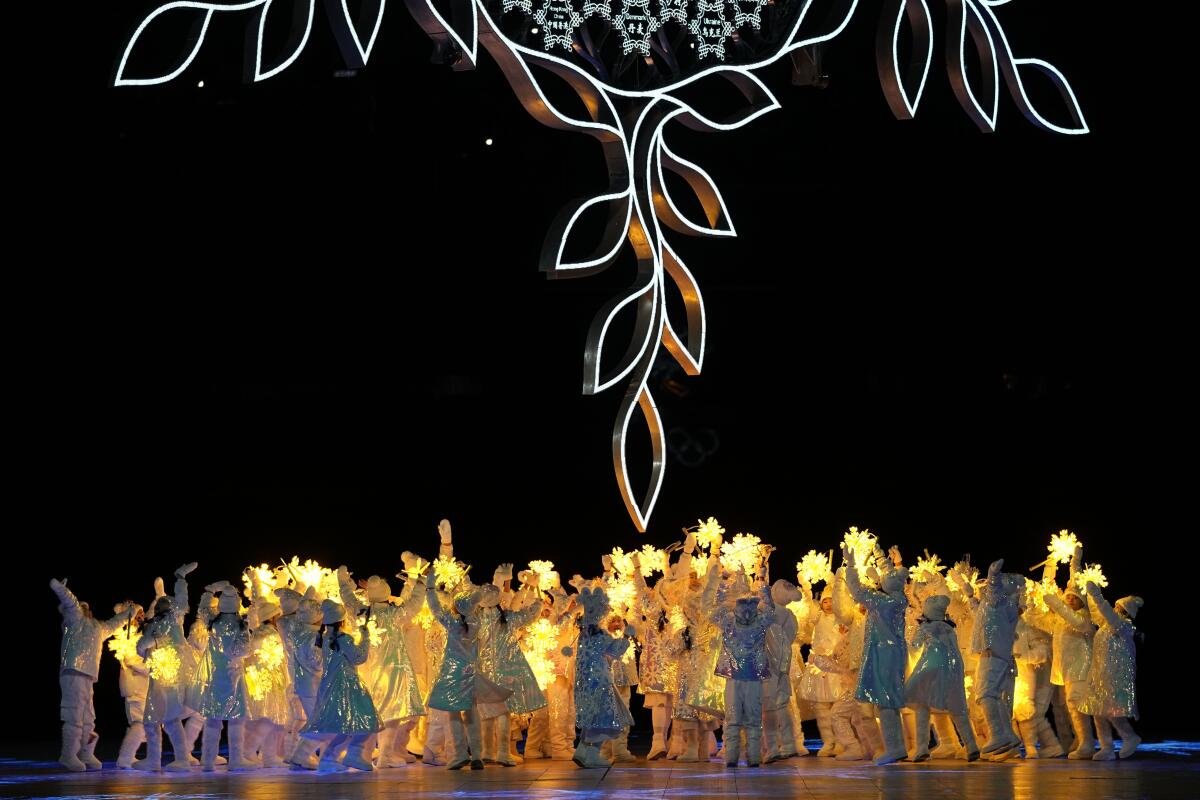
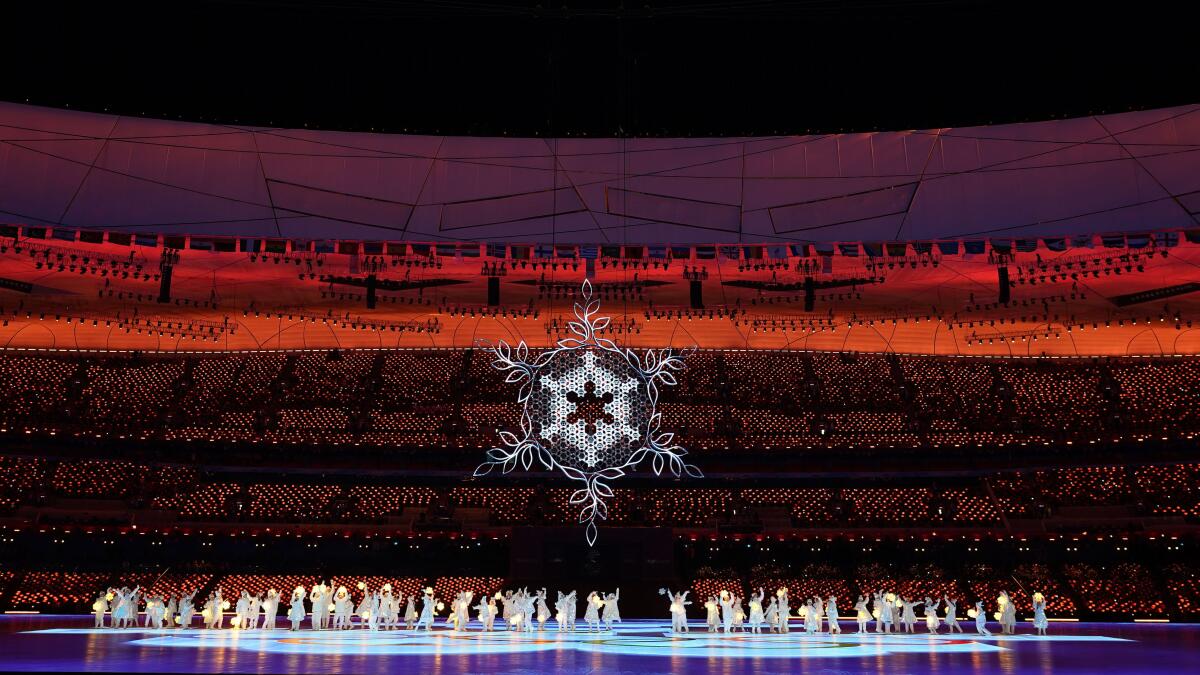
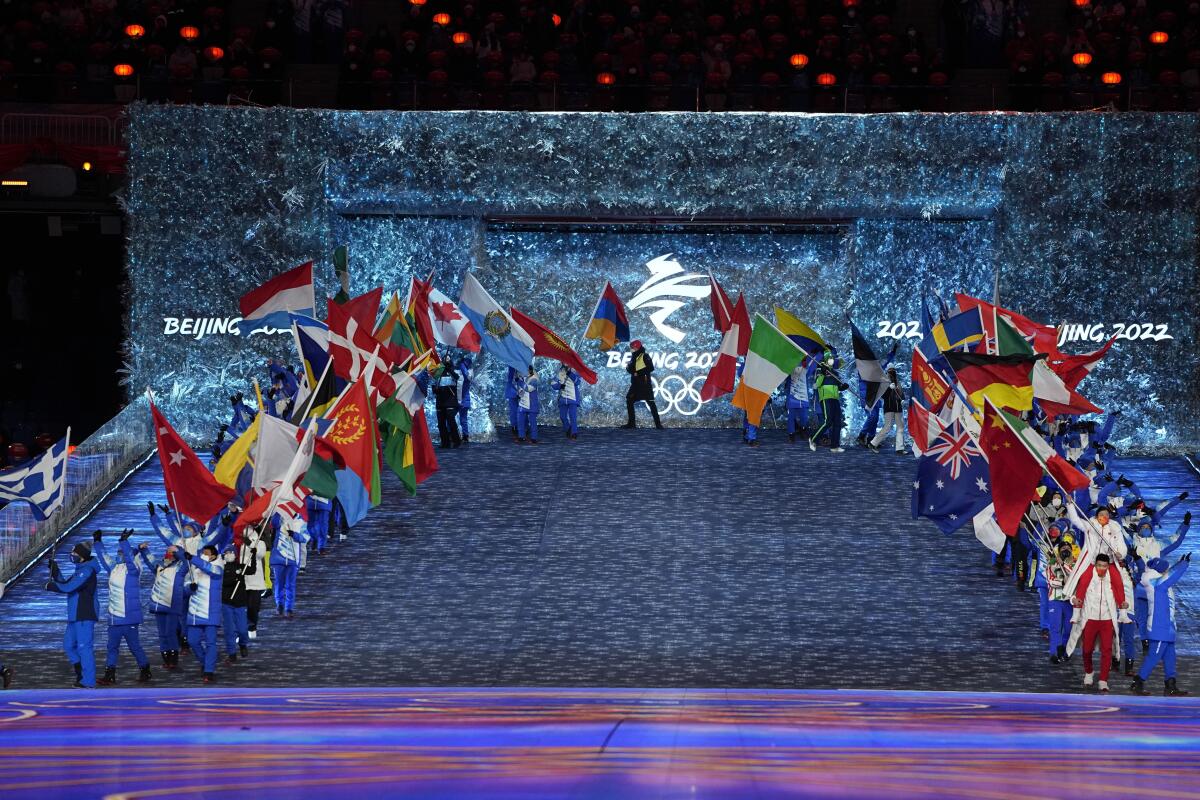
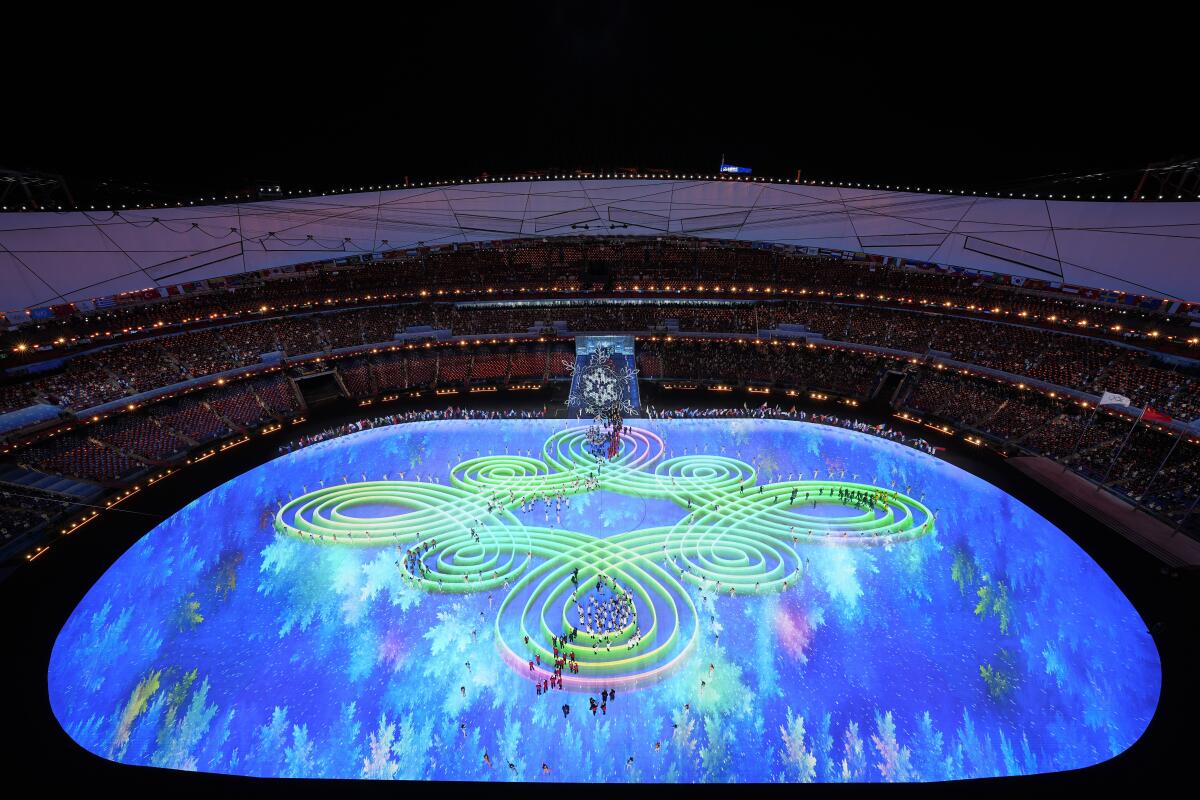
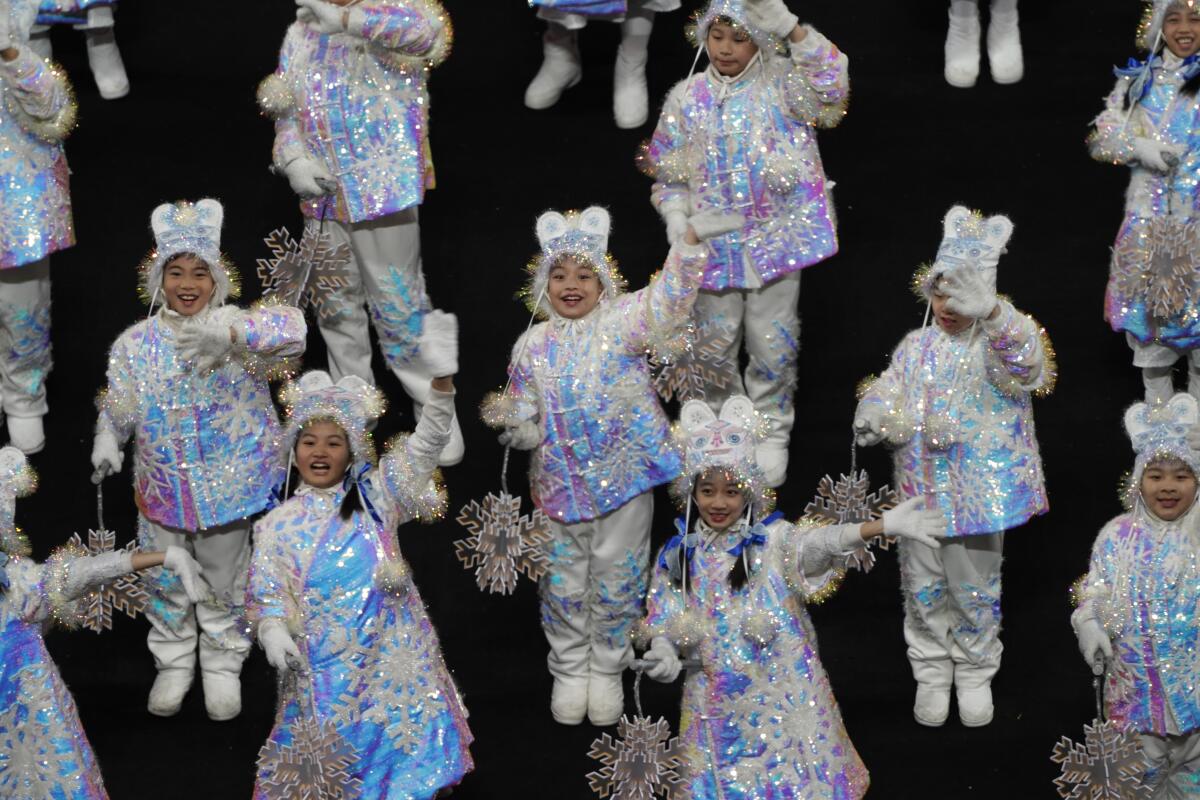
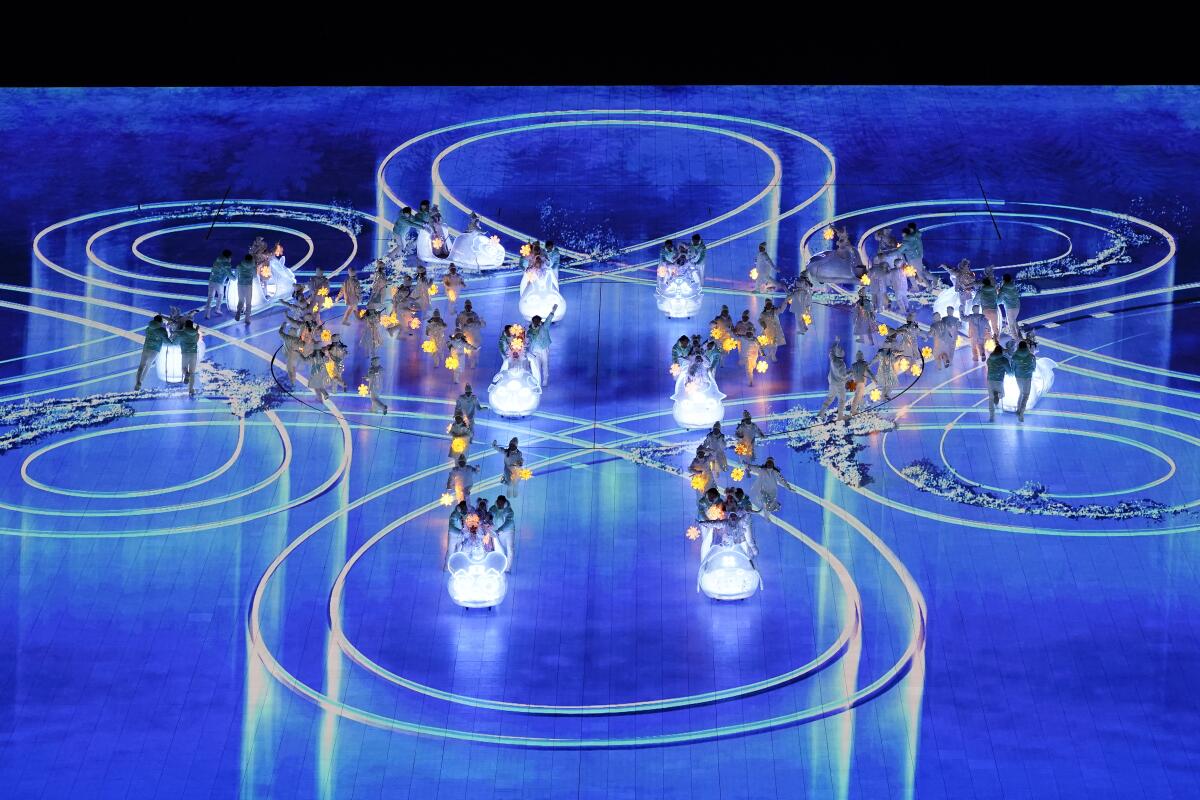
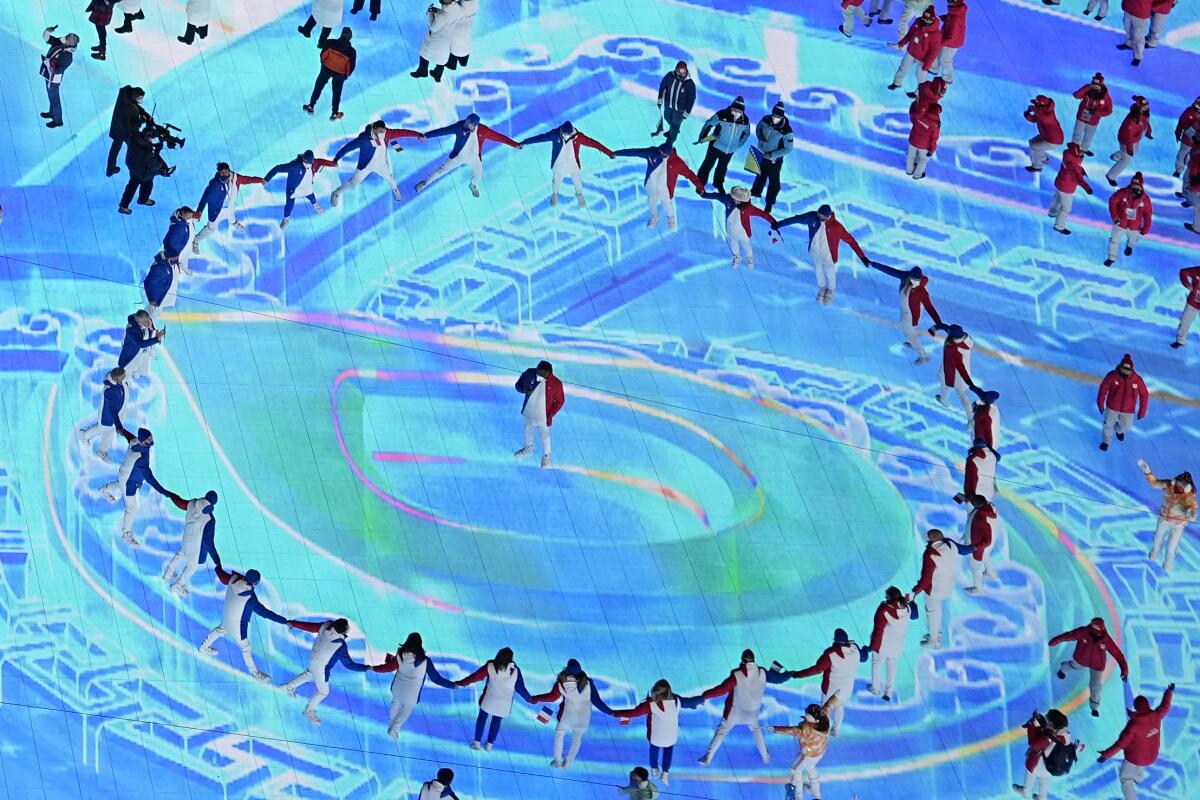
- Share via
Breaking down the U.S. medal haul for the Beijing Games
BEIJING — With a final silver medal from cross country skier Jessie Diggins in Sunday’s 30-kilometer mass start, the United States finished the Beijing Olympics with 25 medals, ranking fifth overall by total. Norway continued its dominance of the Winter Games with 37 total medals.
The United States’ eight gold medals were tied for fourth-most in 2022, but it’s the fewest for the country in a single Winter Olympics since five in 1998.
Three of the U.S. gold medals came in snowboarding, where Chloe Kim defended her halfpipe title and Lindsey Jacobellis won two gold medals in snowboard cross, first in the individual women’s race and then in the mixed team event with Nick Baumgartner.
With Kim and Jacobellis leading the way, U.S. women claimed more than half of the country’s medals for the second consecutive Winter Olympics. Excluding the four medals from mixed team events, U.S. female athletes won 13 medals in Beijing compared to eight for American men. The 52% of medals won by women continues a recent trend of female Olympic success for the United States after women won just 32.4% of the U.S. medals in 2002 Salt Lake City Games.
“Girls run the world, right?” freeskier Maggie Voisin said with a smile. “Everyone is just pushing the limits and I really feel like on the female side more than anything, it’s really, really, taken to the next level.”
Kim, Jacobellis, bobsledder Kaillie Humphries and speedskater Erin Jackson took gold medals in individual women’s events while figure skater Nathan Chen and freestyle skier Alex Hall were the only U.S. men to win individual gold medals.
Freestyle skiing, which includes aerials, moguls, halfpipe, slopestyle and big air, was the most successful sport for the United States.
Freestyle skiers combined for eight medals, including golds in the mixed team aerials event and men’s slopestyle. Hall and Nick Goepper won gold and silver, respectively, in men’s slopestyle, where the United States has won six of the nine medals awarded since the event made its Olympic debut in 2014.
“Action sports was born in America, in Southern California,” Nick Goepper said. “It has this individualistic, creative spirit and that’s just what Americans are all about.”
- Share via
American Jessie Diggins makes history with silver finish in cross-country skiing
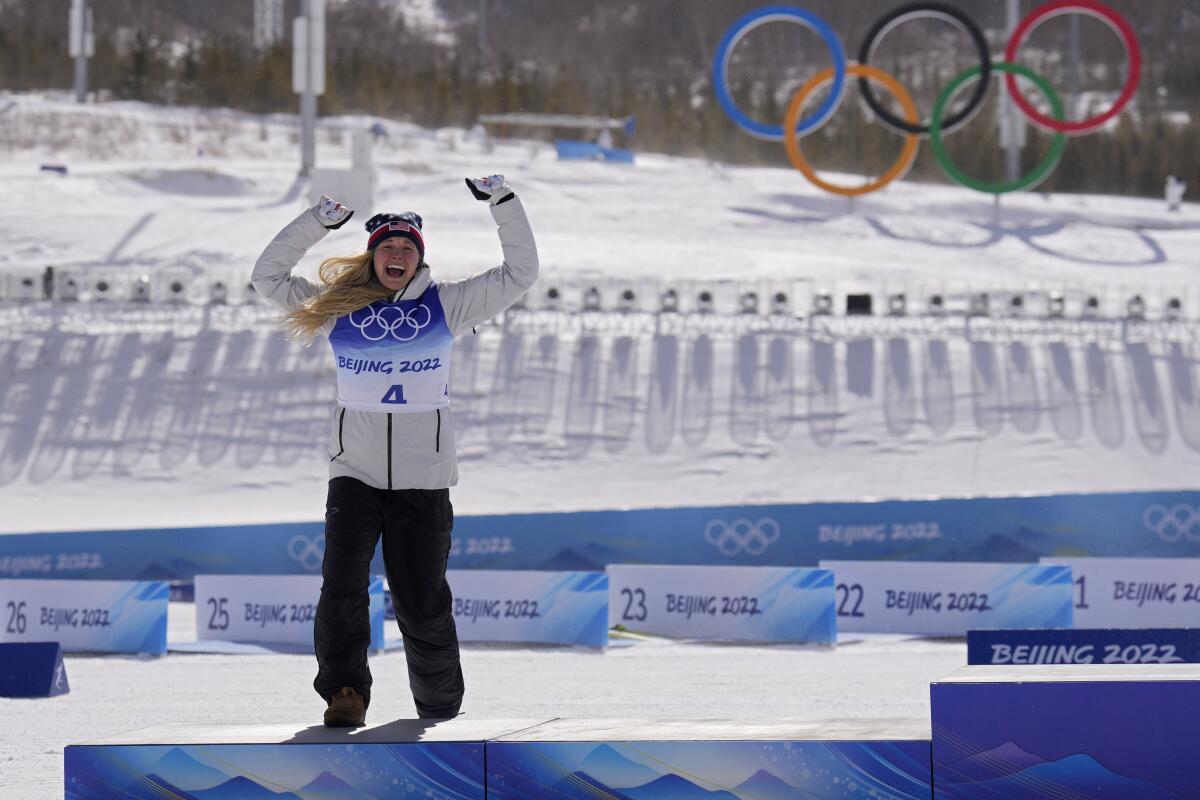
ZHANGJIAKOU, China — Norwegian great Therese Johaug won her third gold medal of the Beijing Olympics on Sunday and Jessie Diggins took silver for the best result by an American in an individual cross-country skiing event since 1976.
Fighting fierce winds and brutal temperatures, Johaug went out front early in the 30-kilometer mass start race and held on to win in 1 hour, 24 minutes, 54 seconds. Johaug also won the skiathlon — the first gold medal of the Olympics — and the 10-kilometer classic race.
“I’m born in a small place where there’s a lot of wind and a lot of cold temperatures in the region, so this was nothing for me,” Johaug said.
Diggins, also skiing alone for much of the race, kept a steady pace behind the Norwegian as gusts whipped across the tracks and battered the skiers, many with tape on their faces to protect from the cold. She dropped to the ground after crossing the finish line, 1:43.3 behind Johaug.
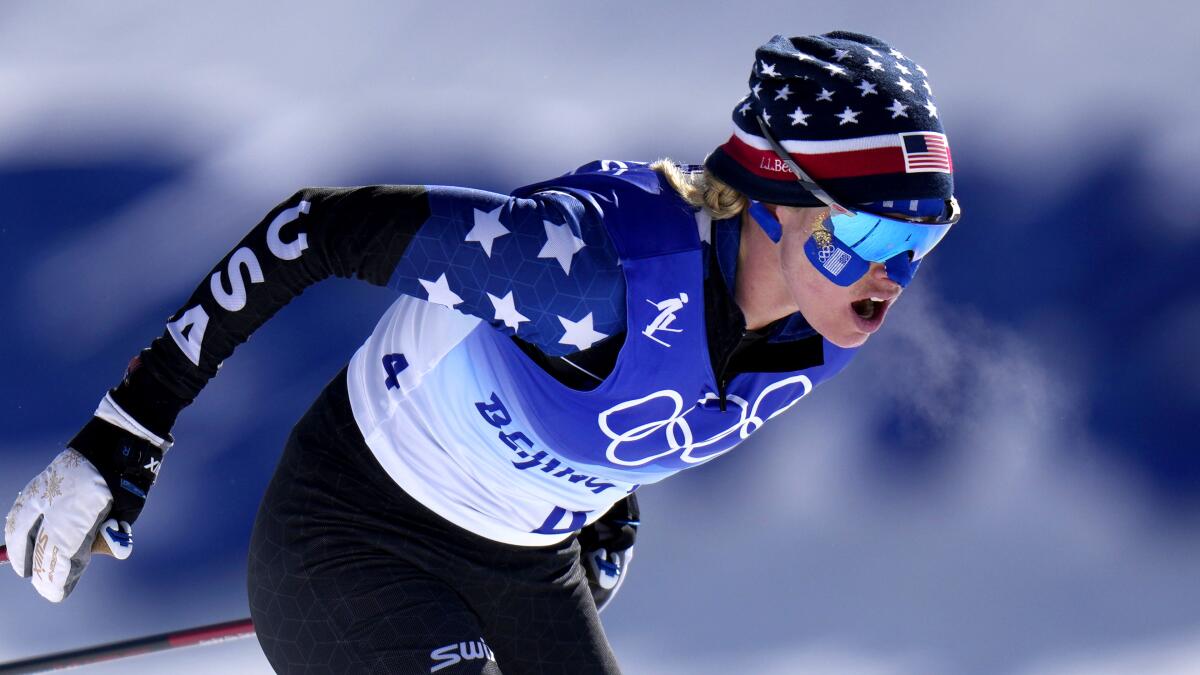
“Every last drop of energy went into that race,“ Diggins said. “The last two laps, my legs were cramping. We had amazing cheering out there, and I thought, I just can’t give up, I have to put everything I had into the snow today and finish with nothing left. I did try really, really hard.”
Diggins said she was sick with food poisoning the day before, spending the Saturday in bed and force-feeding herself.
“I was feeling pretty bad 24 hours ago,” the American said. “I was talking to my parents and my mom said, ‘Don’t decide how you feel right now. Just go out there and ski because you love to race.’ And she was right.
“That might have been the best race of my entire life, I’m not going to lie,“ Diggins said. “It was also maybe the hardest race of my whole life.”
Kerttu Niskanen of Finland led a chase group to the line for bronze, 2:33.3 behind.
- Share via
Medal count for the Beijing Winter Olympic Games
Here’s the final medal count for the Beijing Olympic Games:
- Share via
Finland defeats Russian Olympic Committee in historic upset for men’s hockey gold
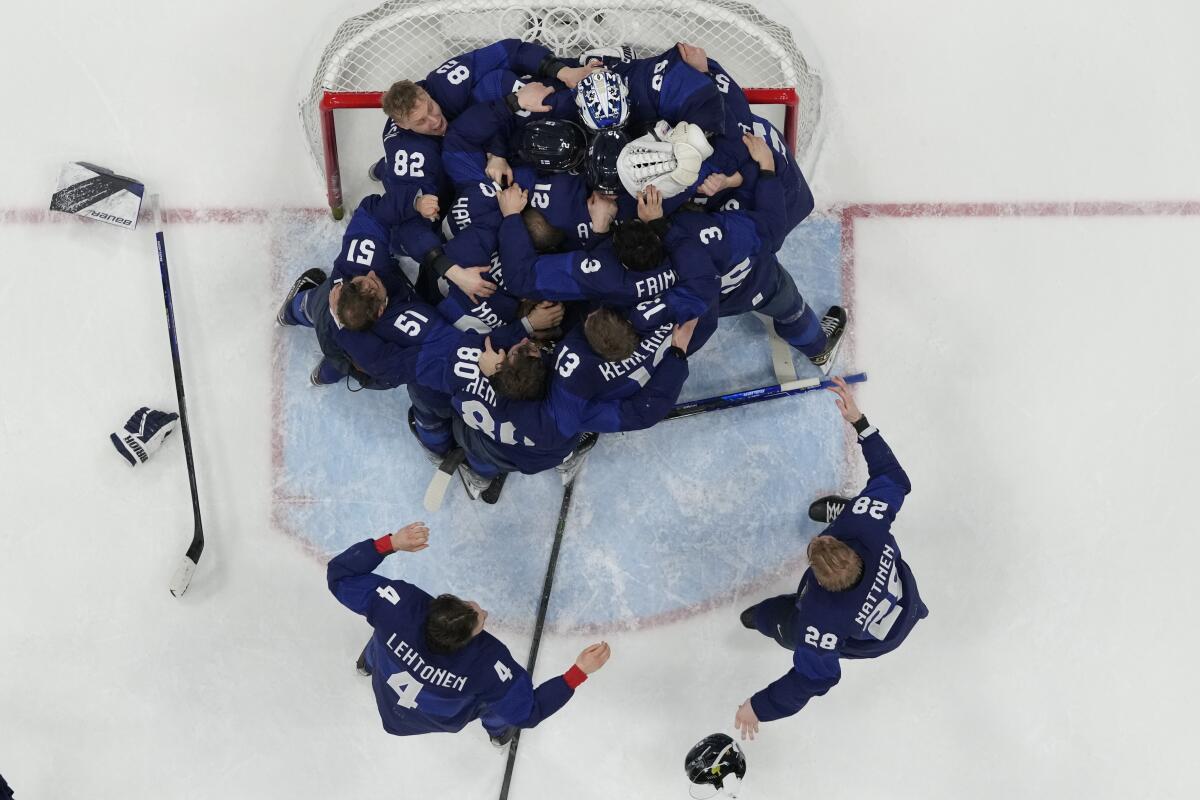
BEIJING — Finland ended the Olympic hockey tournament with a historic upset, as its men’s team won gold for the first time on the strength of a fiercely contested 2-1 victory over the Russian Olympic Committee on Sunday at National Indoor Stadium.
Hannes Bjorninen’s tip of a shot by Marko Anttila 31 seconds into the third period proved the difference as the Finns outplayed the favored Russians, who were able to build a roster around players in their domestic Kontinental Hockey League after the NHL decided not to allow its players to represent their homelands here. Finland, considered a hockey power for the last three decades, had won Olympic silver medals in 1988 and 2006 and won bronze medals in 1994, 1998, 2010 and 2014.
- Share via
Mikaela Shiffrin and U.S. miss out on medal in mixed parallel team event
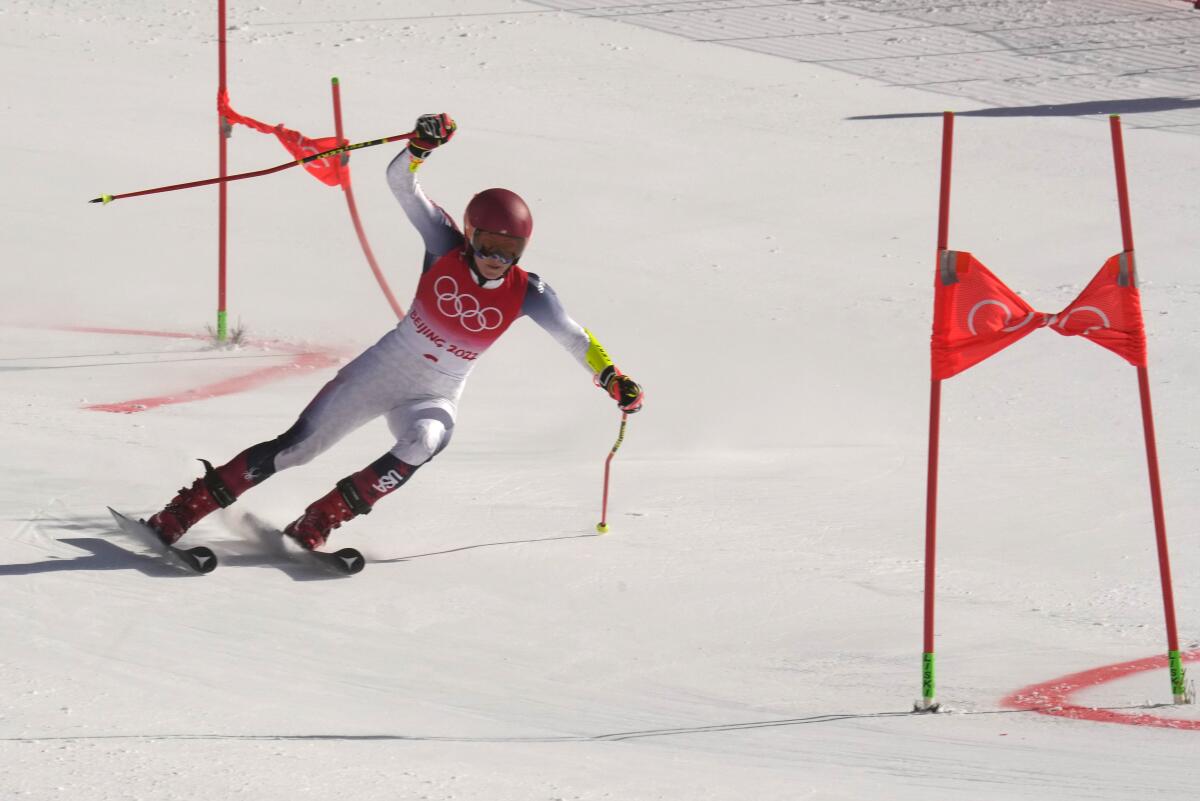
BEIJING — Mikaela Shiffrin’s forgettable Winter Olympics ended just short of a medal Sunday.
Competing as part of the U.S. squad in the mixed parallel slalom event, Shiffrin and three teammates lost to Norway in the bronze medal match at the Yanqing National Alpine Centre.
Shiffrin’s sixth event at the Games — only one other woman has matched the feat — ended in disappointment like the five individual events that preceded it, though the world’s top female skier pushed back against that idea.
- Share via
U.S. figure skaters lose appeal to receive silver medals before Olympics end
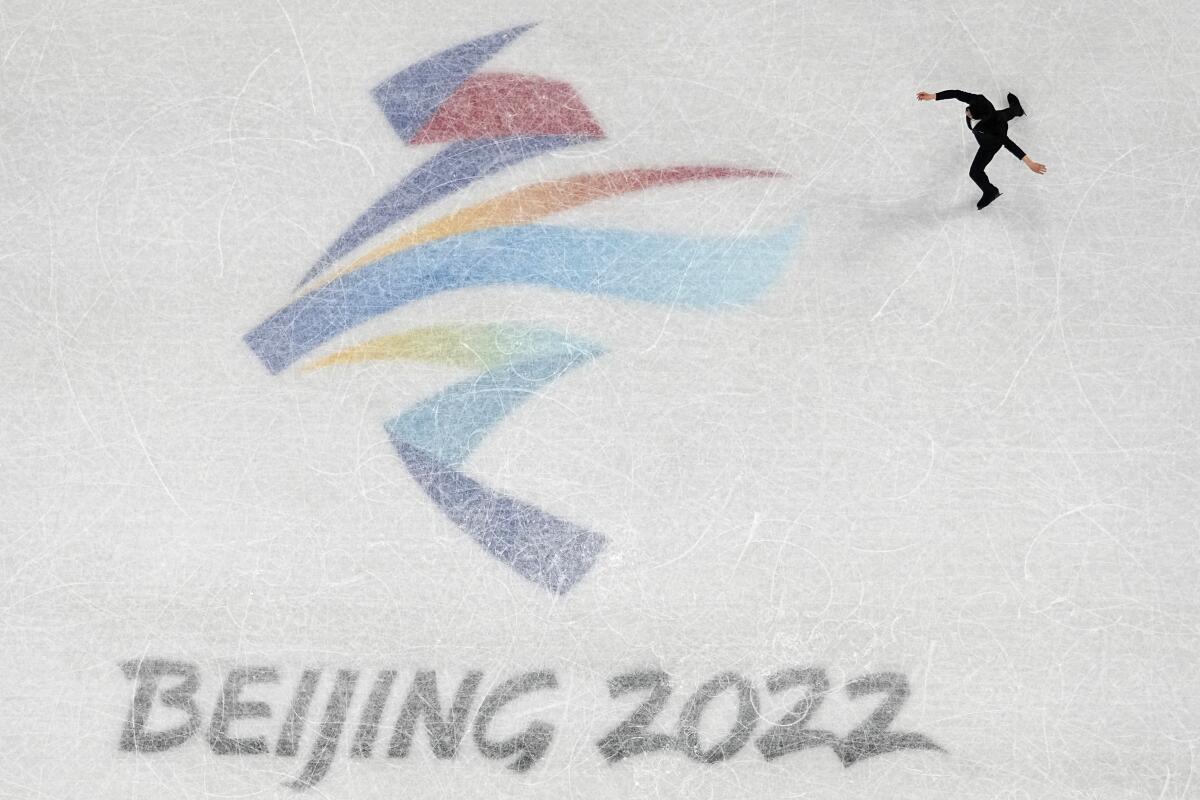
BEIJING — The Court of Arbitration for Sport rejected an application filed by the American figure skaters who had won silver medals in the team event requesting that the International Olympic Committee present their medals before the Beijing Games end on Sunday.
The IOC decided it would not hold a medal ceremony until an investigation is completed regarding Russian skater Kamila Valieva’s pre-Olympic positive test for a banned substance. Valieva led the athletes of the Russian Olympic Committee to the gold medal in the team event. The U.S. won silver and Japan won bronze. The ROC skaters who competed in the event would be disqualified if Valieva is disqualified and the teams below them in the standings would move up.
Singles skaters Karen Chen, Nathan Chen and Vincent Zhou, ice dancers Madison Hubbell, Zachary Donohue, Madison Chock and Evan Bates, and pairs skaters Brandon Frazier and Alexa Knierim had asked the CAS to order the IOC to give them their medals before the closing ceremony. In a statement, the CAS said a three-person arbitration panel had dismissed the skaters’ application. An explanation of the decision is scheduled to be published in the next few days.
- Share via
American Elana Meyers Taylor adds to medal haul, takes bronze in two-woman bobsled
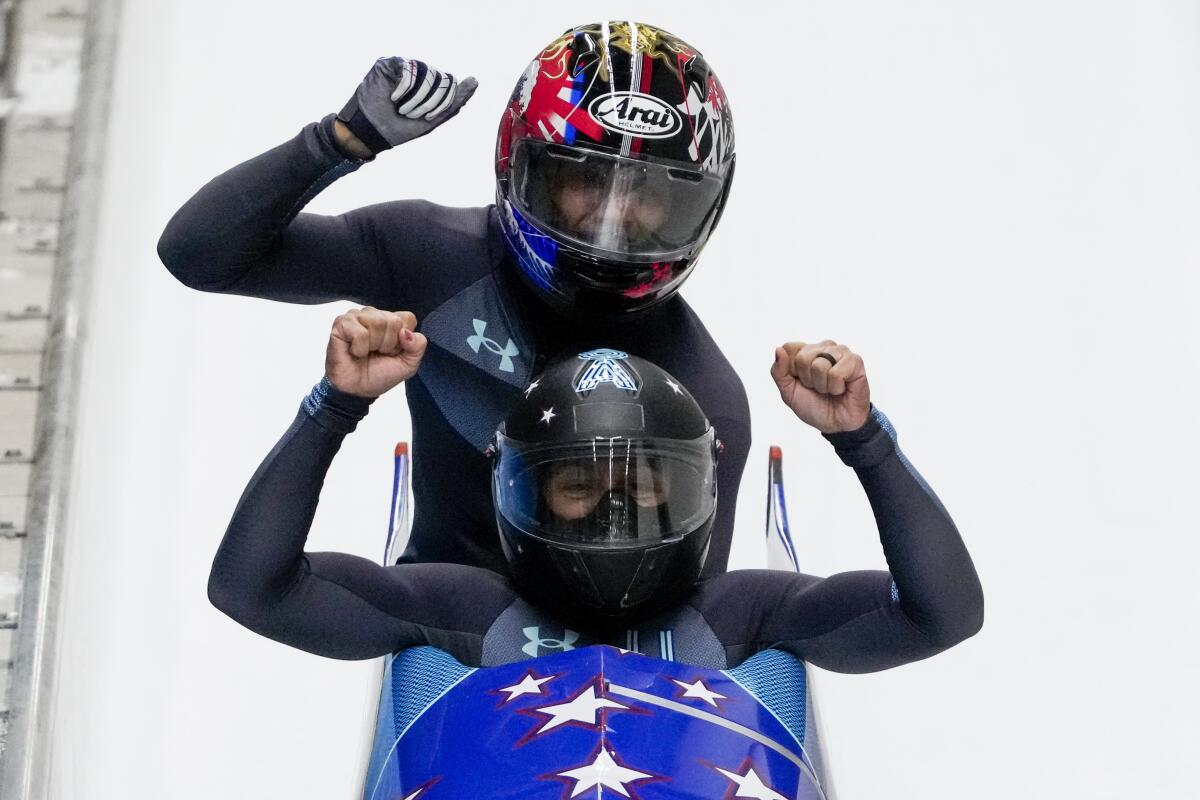
BEIJING — After winning silver in the Olympic debut of women’s monobob, Elana Meyers Taylor gave her medal to her son Nico. The two-year-old wore the red lanyard around his neck and turned the silver medal around in his hands as he rolled onto his back in a heart-warming video Meyers Taylor shared on Twitter. With two Olympic medals in tow, Meyers Taylor will get a re-do during Sunday’s closing ceremony. Her United States teammates again elected her as the flagbearer.
Nico now has another new toy.
Meyers Taylor became the most decorated Olympic U.S. bobsledder Saturday with a bronze medal in the two-woman event, bringing her total to five. The 37-year-old pilot, who paired with brakewoman Sylvia Hoffman, is the first U.S. Winter Olympian to enter five events and win a medal in all of them after taking two-woman silver in Pyeongchang and Sochi and bronze in Vancouver.
- Share via
Sui Wenjing and Han Cong win gold for China in pairs figure skating
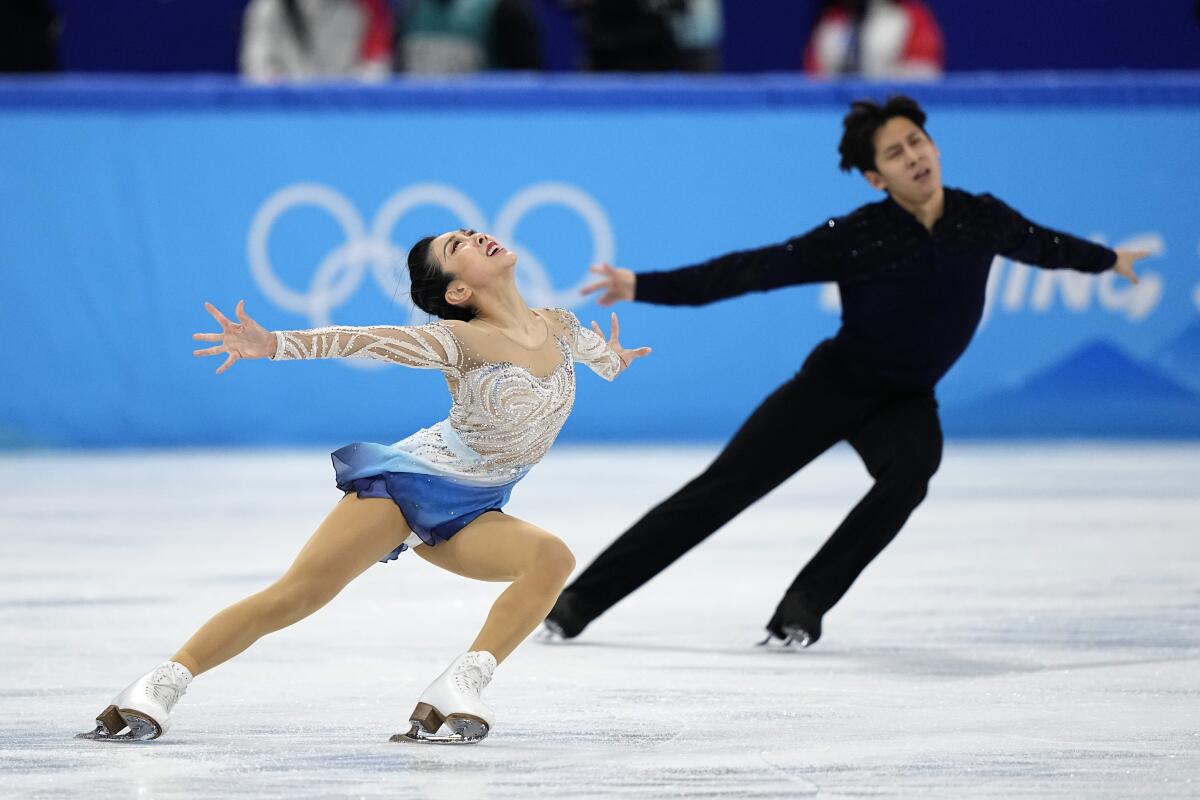
BEIJING — Sui Wenjing and Han Cong won the pairs figure skating gold medal in their home country Saturday night, performing a smooth and elegant free skate program to “Bridge Over Troubled Water” to top three duos from the Russian Olympic Committee.
The Chinese couple, who won the silver medal four years ago at the Pyeongchang Games, beat a strong field by skating the top-ranked program in both segments of the competition. They made one small mistake but earned a world-record 155.47 points Saturday for a total of 239.88, edging out Evgenia Tarasova and Vladimir Morozov (239.25) and 2021 world champions Anastasia Mishina and Aleksandr Galliamov (237.71).
- Share via
Pleasant or difficult? Olympic Village experiences at Beijing Games vary by athlete
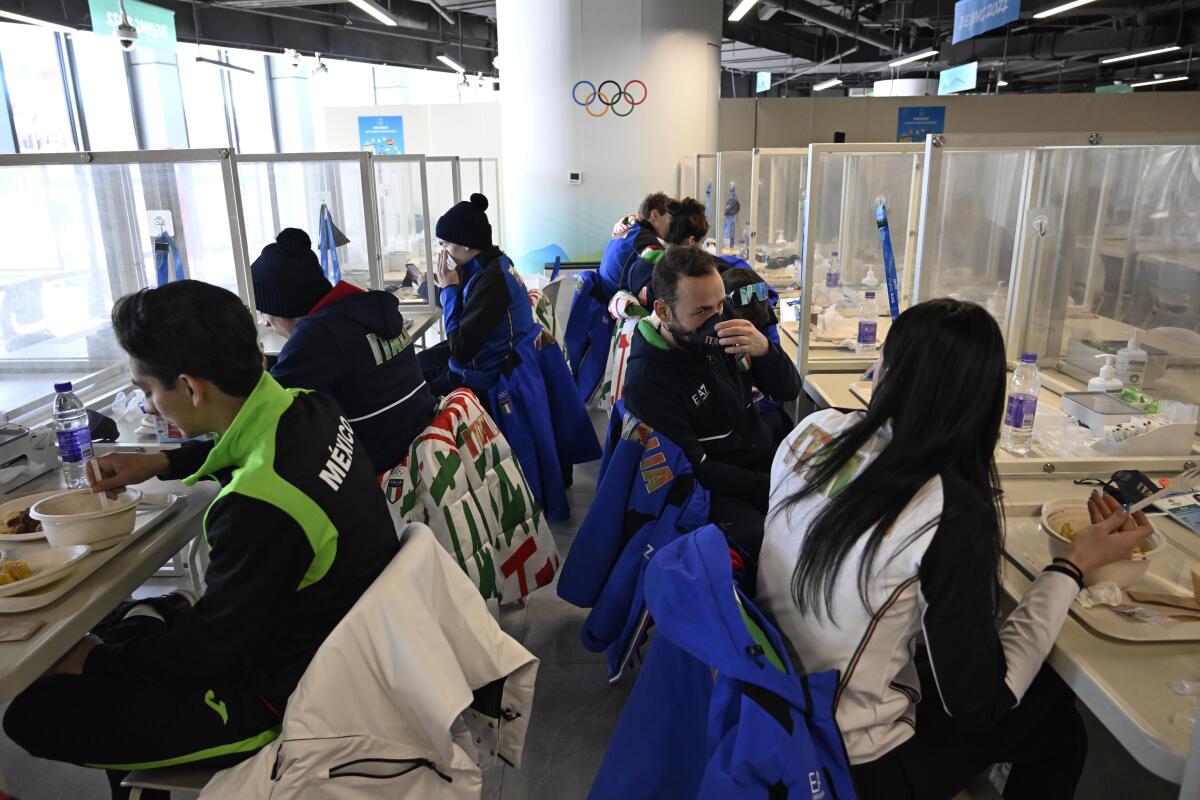
BEIJING — Lime-green buses, temporary buildings and volunteers braced against zero-degree wind whipping off the Xiaohaituo Mountain Area are scattered around the desolate parking lot that served as an important waystation for new arrivals at the Winter Olympics.
On one side of the sprawling lot, cordoned off by waist-high barriers and assisted by workers in white hazmat suits, athletes changed buses from Beijing Capital International Airport for the final leg of their journey into the mountains.
When the last athlete boarded the bus at the Banquan Service Area, workers methodically sprayed the entire lot with disinfectant. Even sections far from the bus were doused. Then the workers sprayed each other.
- Share via
Niklas Edin leads Sweden to curling gold over Great Britain
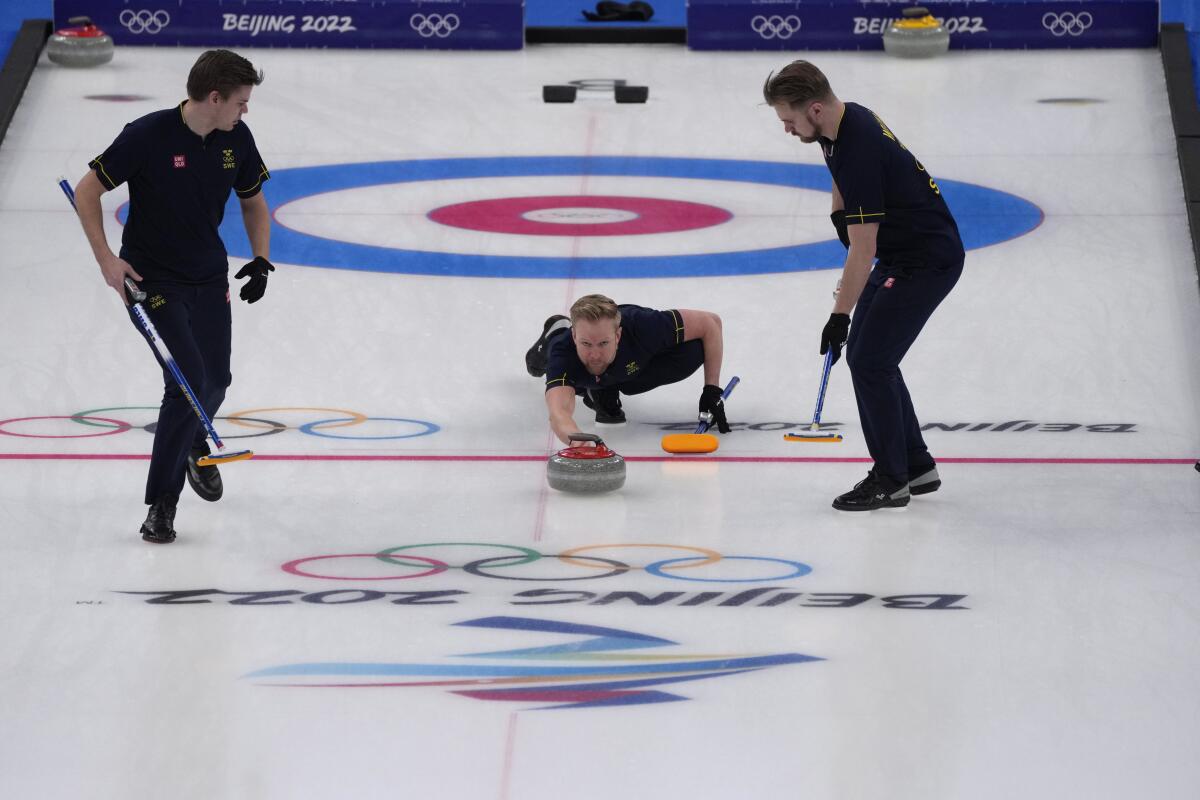
Sweden’s Niklas Edin has claimed the only major title missing from a career in which he’s established himself as the most decorated skip in curling history.
Four years after losing in the Pyeongchang final to American upstart John Shuster, Edin led Sweden to the gold medal on Saturday, beating Britain 5-4 in the first extra-end men’s final in Olympic history.
With the medal podium already set up, and Canada standing by to collect the bronze it won Friday by ending the Americans’ repeat hopes, Edin took advantage of the last-rock advantage in the first tiebreaker end and put his penultimate stone into the center of the target area.
When British skip Bruce Mouat failed to knock it out on a ricochet, the Swedes had clinched it. They paused — it’s not polite to celebrate an opponent’s miss — and then let out a yell.
Their alternate and coaching staff hurried down to the ice to join the celebration.
- Share via
China strives to flex its tech innovations to worldwide audience at Olympics

BEIJING — An automated basket tips frozen wonton into boiling water. Within minutes, the dough-wrapped bits of pork are cooked, deposited into a black plastic bowl and transported onto a conveyer belt, untouched by human hands. Pink lights flash as your lunch order arrives at the counter.
The robotic café inside the media center at the Beijing Olympics has received worldwide coverage the last few weeks. It makes for good television and eye-catching social media posts.
There are cyber-boilers and fryers and even a one-armed bartender. Unmanned servers glide across overhead tracks, lowering meals by cable, like Tom Cruise dangling from the ceiling in “Mission Impossible.”
Beneath all this mechanical flash, there might be some important political context.
- Share via
Netherlands’ Irene Schouten wins gold on final day of Olympic speedskating
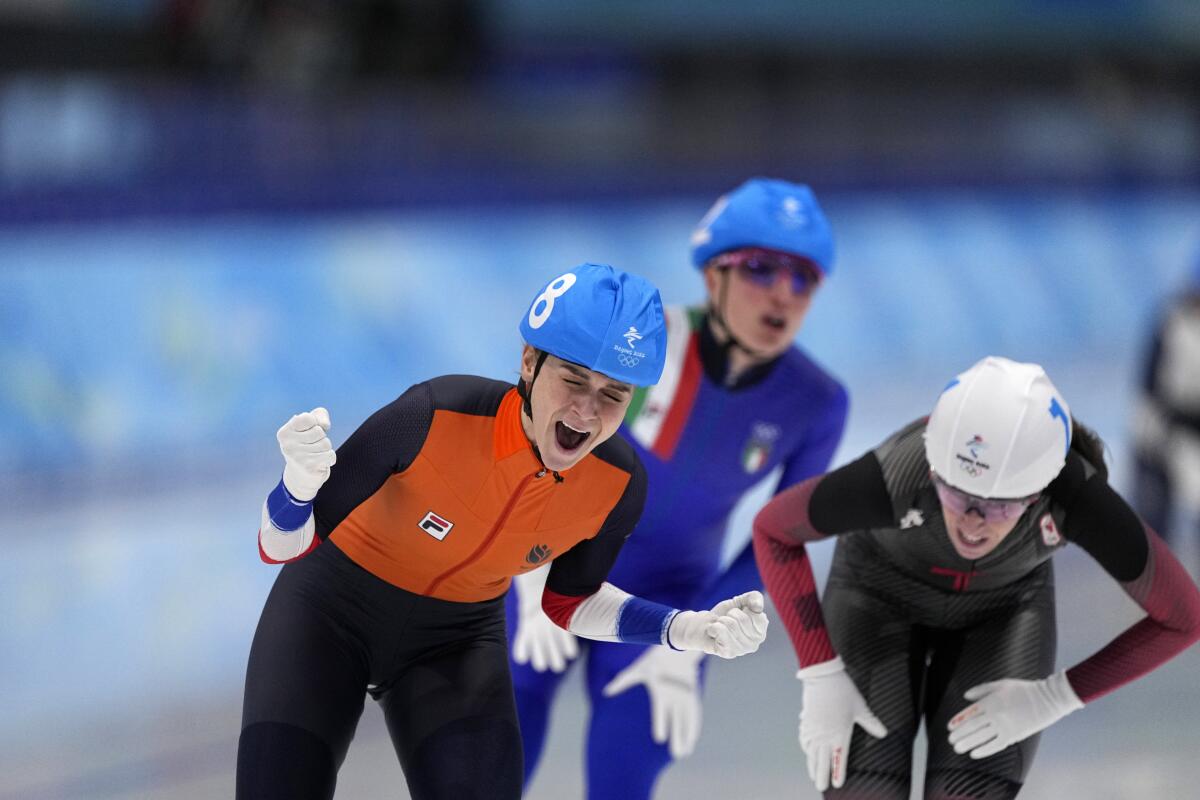
BEIJING — Irene Schouten of the Netherlands captured her third gold medal of the Beijing Olympics, chasing down Canada’s Ivanie Blondin to win the women’s mass start on Saturday.
In the final speedskating event of the Winter Games, Schouten established herself as the biggest star at the Ice Ribbon with a furious push to line to overtake Blondin.
Blondin grabbed the lead on the backstraight, but Schouten roared back with an all-out sprint to the finish line to win by 0.06 seconds.
Schouten let out a scream as she crossed the stripe, celebrating another gold after her victories in the 3,000 and 5,000 meters. In a nifty bookend, she won the first and last speedskating events in Beijing, two weeks apart.
Bart Swings of Belgium won the men’s mass start on a frustrating final day at the oval for the American team.
Joey Mantia was edged out by the tip of a blade for the bronze medal in the men’s race. The 36-year-old Floridian complained that he was grabbed by another skater, costing him his second medal of the Beijing Games.
Mia Manganello Kilburg matched Mantia with a fourth-place showing in the women’s race, though she was a bit farther back.
Blondin settled for the silver, adding to the gold she won as part of team pursuit. The bronze went to Italy’s Francesca Lollobrigida, her second medal of the Olympics after claiming a silver in the 3,000.
Swings improved on the silver he won at the 2018 Pyeongchang Games in the frenetic event — the only individual speedskating race with head-to-head competition instead of racing against the clock.
South Korea grabbed the other men’s medals. Chung Jae Won took the silver and defending Olympic champion Lee Seung Hoon settled for bronze this time.
Mantia, a three-time world champion, initially posted the same time as Lee. But the replay showed the tip of the South Korean’s skate crossed the line just ahead of Mantia’s blade, giving him the bronze by 0.001 seconds.
The Netherlands again topped the speedskating medal table, finishing with six golds and 12 medals overall. The United States finished with three medals, its best showing since 2010.
The mass start races marked the Olympic farewells for two speedskating greats.
Sven Kramer of the Netherlands ranked last in the men’s final, pushing the pace early on but dropping back when the contenders turned on the speed at the end of the 16-lap race.
The 35-year-old Dutch star finished his Olympic career with a total of nine medals, including four golds.
Claudia Pechstein of Germany made the women’s final just three days before her 50th birthday. She took points in one of the interval sprints and finished ninth.
Pechstein was competing in her eighth Olympics, the most ever by a female Winter Olympic athlete. She won five golds and nine medals in a career that also included a doping ban she continues to dispute.
- Share via
U.S. skaters file appeal to get Olympic medals
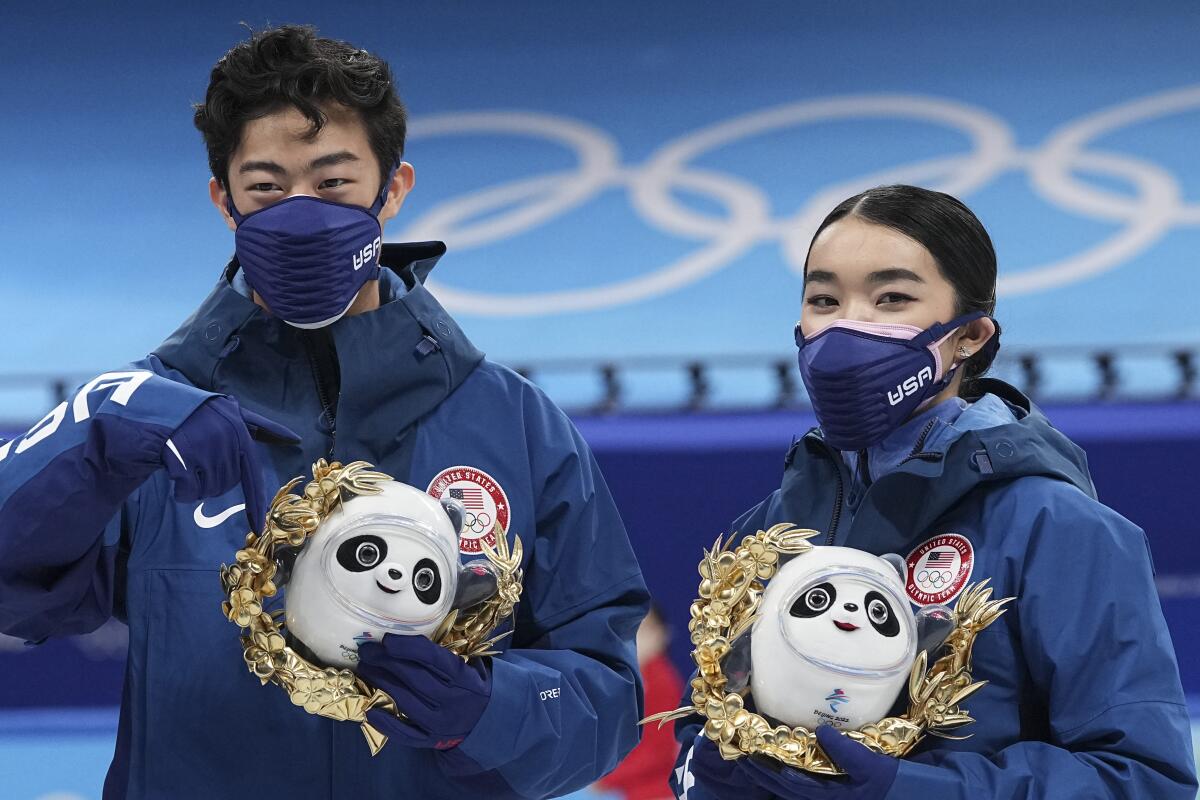
ZHANGJIAKOU, China — Attorneys for the U.S. figure skaters whose Olympic silver medals are being withheld have notified the IOC that they have filed an appeal to have them awarded before the end of the Beijing Games, the Associated Press has learned.
In a letter sent to IOC president Thomas Bach on Saturday in China, a copy of which was obtained by the AP, attorneys said they would ask the Court of Arbitration for Sport for a ruling before Sunday’s closing ceremony.
Kamila Valieva led the Russian team to a victory in last week’s team event, and the U.S. finished second. Soon after, a positive doping test for the 15-year-old skater was disclosed. CAS allowed her to continue skating at the women’s event, but the International Olympic Committee said it would not award medals in any events in which she finished among the top three.
She finished fourth in the women’s event — crying as she left the ice, then criticized by her coach after a mistake-filled long program.
This case involves the team event held the previous week. The Russians won the event by a large margin. Japan was third and Canada finished fourth.
The letter sent on behalf of the American runners-up says the IOC’s “own rules mandate that a victory ceremony ‘to present medals to the athletes shall follow the conclusion of each sports event.’”
In a meeting earlier this week with the skaters, Bach offered them Olympic torches as something of a holdover memento while the doping case, which could take months, or even years, plays out.
The attorneys said they hoped the IOC would reconsider but that because of the urgency, they were filing the appeal.
U.S. Figure Skating executive director Ramsey Baker sent the AP a statement standing in support of the skaters.
“Having a medal ceremony at an Olympic Games is not something that can be replicated anywhere else, and they should be celebrated in front of the world before leaving Beijing,” Baker said.
The letter to Bach, sent by attorney Paul Greene, who represents athletes in doping and other cases against Olympic authorities, said the IOC president had asked the athletes for their input.
“A dignified medal ceremony from our clients’ vantage point is one in the Medals Plaza as originally planned and afforded to all other medalists,” he wrote.
After Valieva’s test became public, Russia’s anti-doping agency at first put her on provisional suspension, then lifted the suspension. That triggered the IOC and World Anti-Doping Agency to lead an appeal to CAS, which acted swiftly and said Valieva could still compete.
That did not resolve the larger question about the result from the team competition.
Nine Americans stand to get some sort of medal out of that — either the second-place prize they’re aiming to receive this weekend, or a gold that could become theirs if the Russian’s are disqualified because of Valieva’s doping case.
Because she is 15, Valieva is considered a “protected person” under anti-doping rules, and is not expected to receive a harsh penalty. Her coaches and doctors are being investigated by Russian and world anti-doping authorities.
- Share via
South Korea’s Lee Seung Hoon, American Joey Mantia qualify for men’s mass start speedskating final
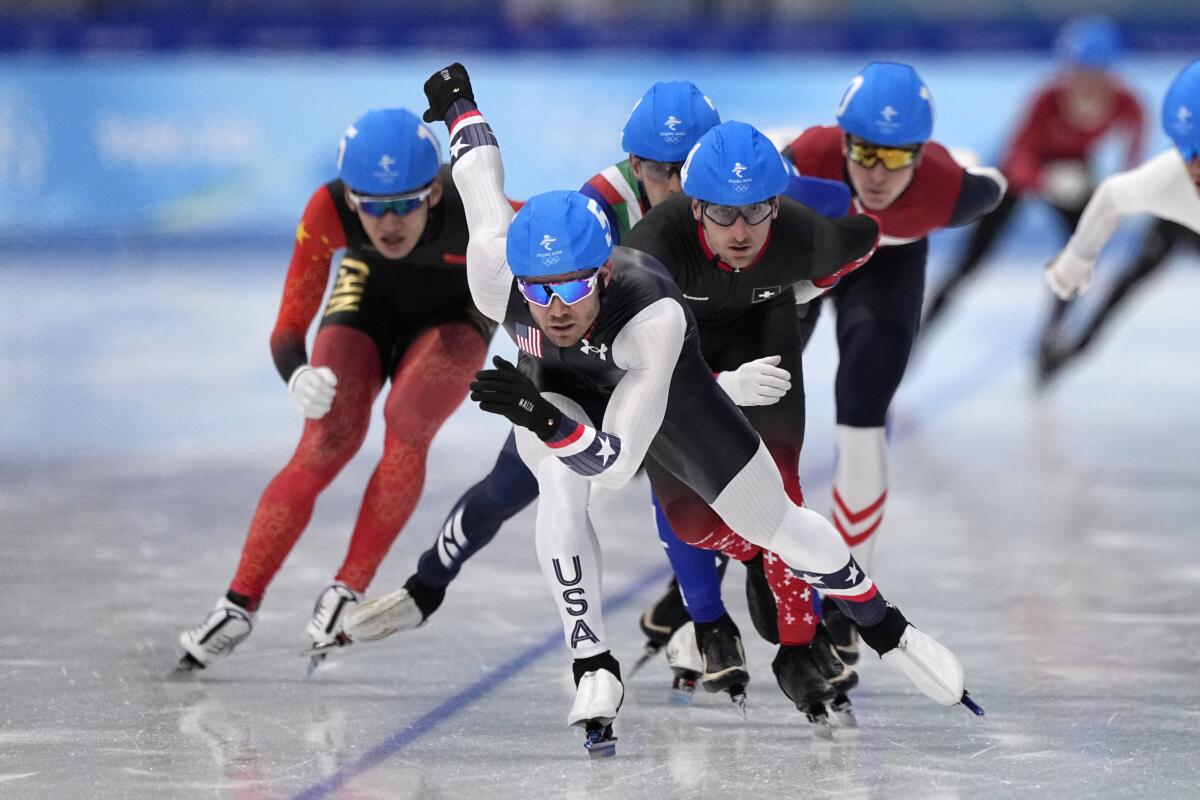
Defending champion Lee Seung Hoon of South Korea has qualified for the final of men’s mass start speedskating.
Lee won the event that made its debut four years ago in his home country.
Also moving on to the final are 2018 silver medalist Bart Swings of Belgium, three-time world champion Joey Mantia of the United States, and 2020 world champion Jorrit Bergsma of the Netherlands.
Sven Kramer of the Netherlands qualified for the last Olympic final of his career. The 35-year-old skater who is a nine-time medalist finished seventh in the semifinals.
- Share via
Final Alpine skiing race pushed back a day due to strong winds
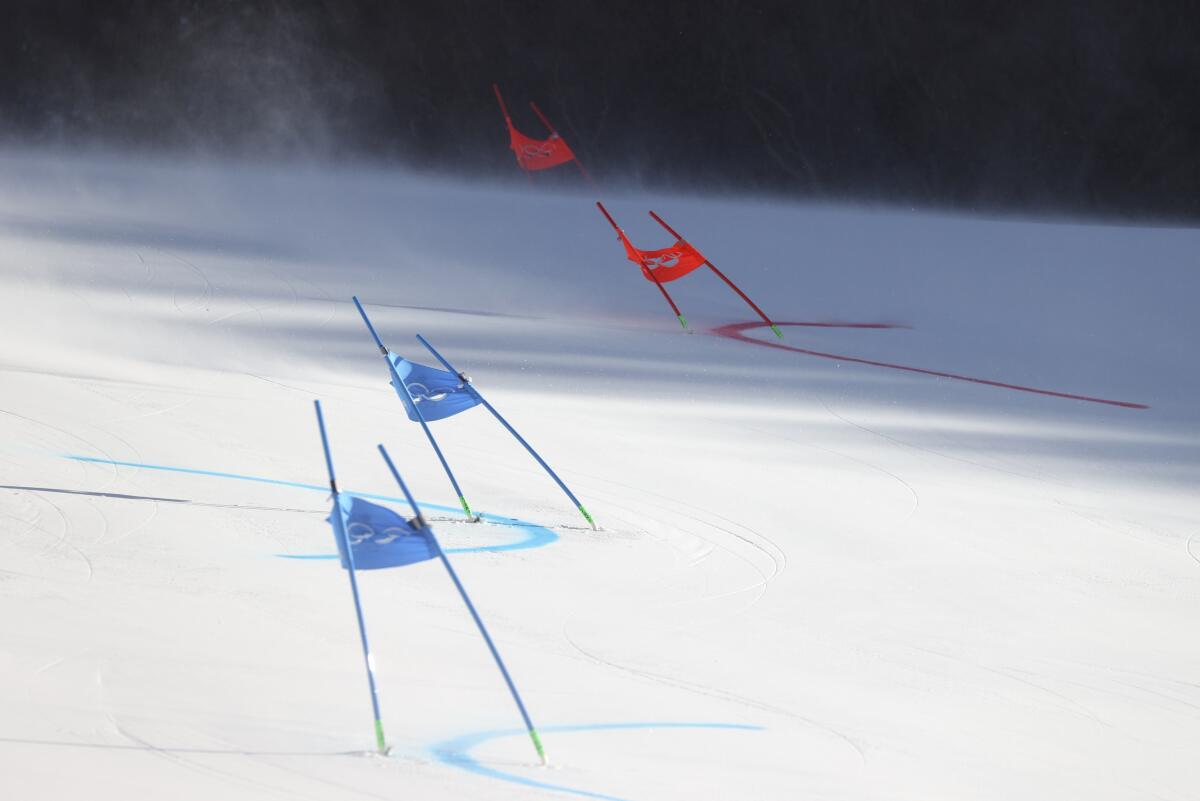
The last Alpine skiing race of the Beijing Olympics has been pushed back a day because of strong winds.
The mixed team parallel event was rescheduled from Saturday to Sunday, the last day of the Winter Games. It will start at 9 a.m. Beijing time.
It was supposed to start Saturday morning and was delayed twice because of gusts of up to about 40 mph (65 kph) before it was scrapped for the day.
- Share via
Chinese organizers say 97,000 spectators have attended Olympic medal events
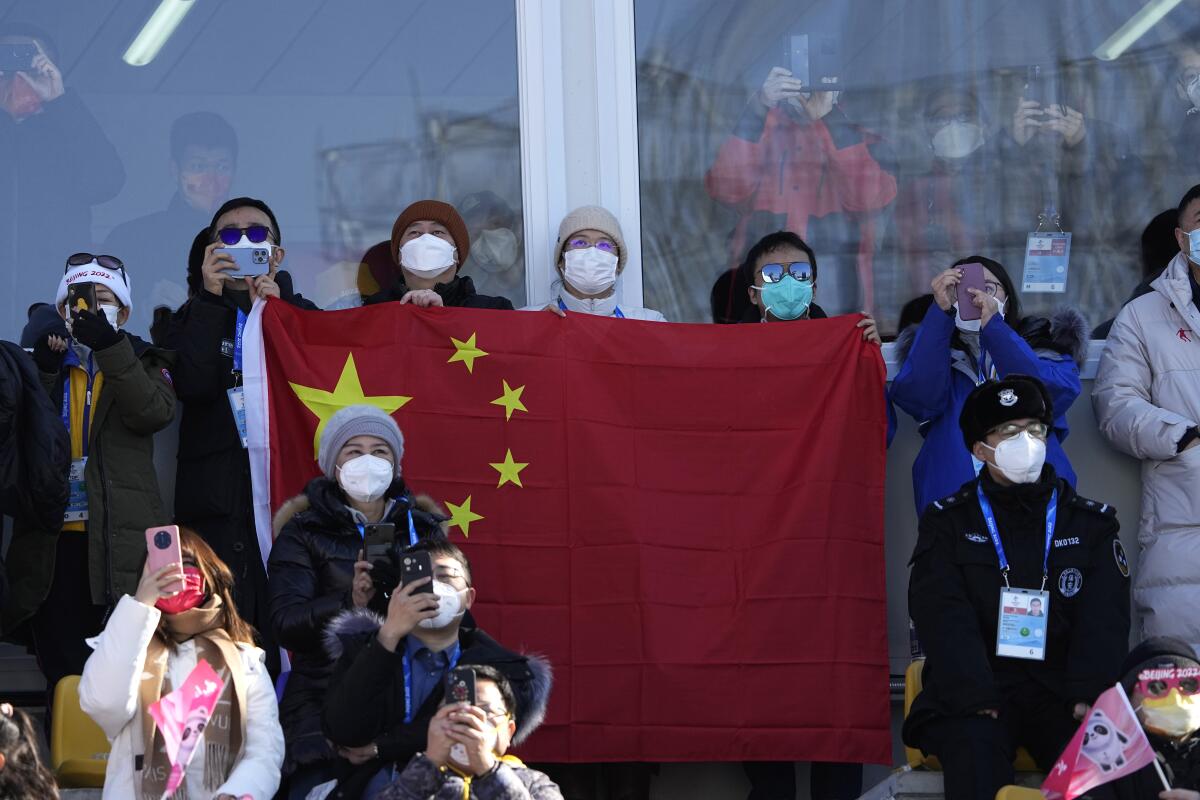
Chinese organizers say a total of 97,000 spectators have attended medal events at the Beijing Olympics.
That’s less than two-thirds of the 150,000 predicted on the eve of the Olympics more than two weeks ago. The games close Sunday.
The number was revealed at a meeting of IOC members by the executive vice president of the local organizing committee, Zhang Jiandong.
Venues in Beijing and Zhangjiakou could have invited spectators attend but fans were not allowed at Alpine skiing and sliding sports in Yanqing.
Plans to sell tickets to international visitors were scrapped last year because of the coronavirus pandemic and the block was extended to residents of China in January.
Spectators were to be invited from international communities living in mainland China, members of diplomatic missions and marketing partners.
- Share via
Beneath its placid façade, curling is a sport about precision and prognostication
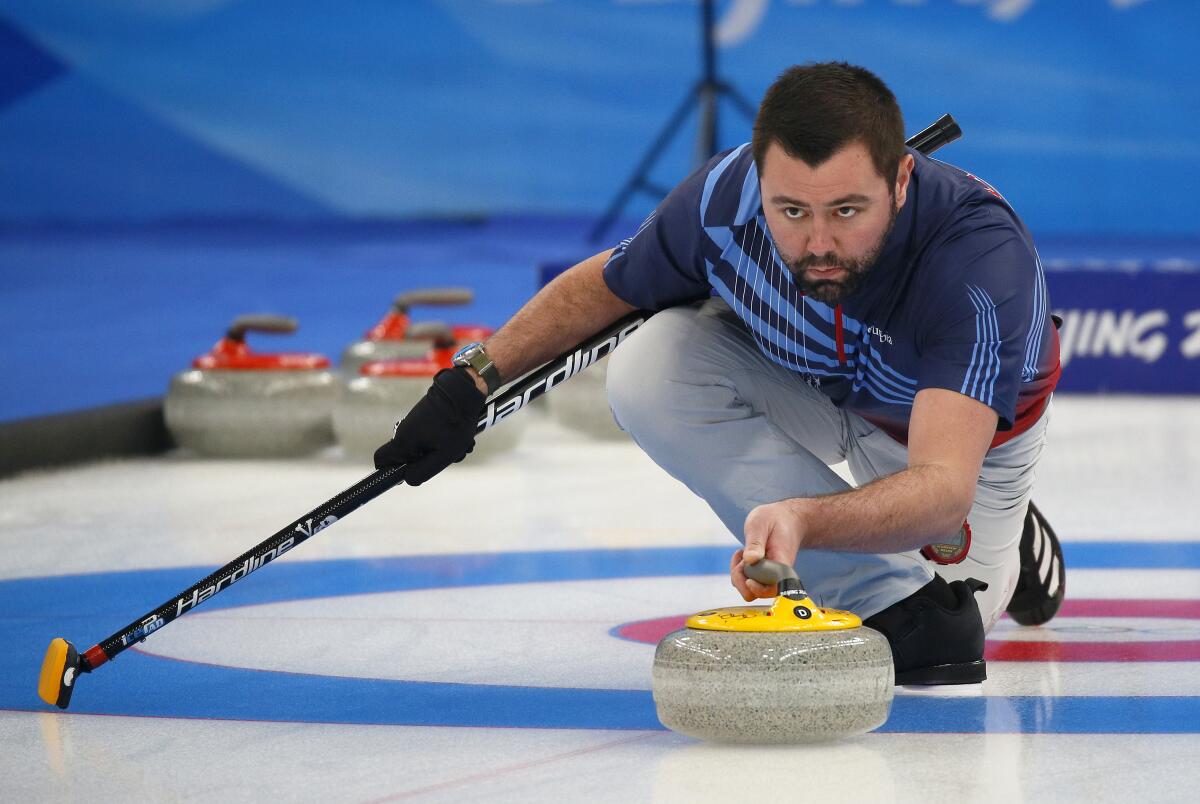
BEIJING — The smooth, glistening ice on which curlers play — it is called a “sheet” — looks pristine, perfectly flat, to casual observers. Chris Plys sees something different as he crouches, squinting.
The U.S. Olympic team member knows slight deviations alter the surface. Devilish spots where his next shot might speed up or slow down. Places where the stone might curve left or fade right a little too much.
“It’s kind of like a golfer reading a green,” Plys says. “Every sheet is going to have its own little intricacies.”
Navigating those variations is actually tougher than reading a green because in curling they are invisible, discovered by trial and error during practice, committed to notebooks and memory.
As U.S. coach Sean Beighton puts it: “Curling is a little weird, right?”
Perhaps more than a little.
Every four years, when the Winter Games come around, this sport becomes a cult favorite among American television viewers. Maybe it appeals to fans because they can imagine sliding a polished rock across the ice in a way they could never picture themselves flying down a mountainside or executing a triple axel. Maybe curling is popular because it is easily understandable.
- Share via
Two-time Olympic champion David Wise of U.S. wins silver in freeski halfpipe
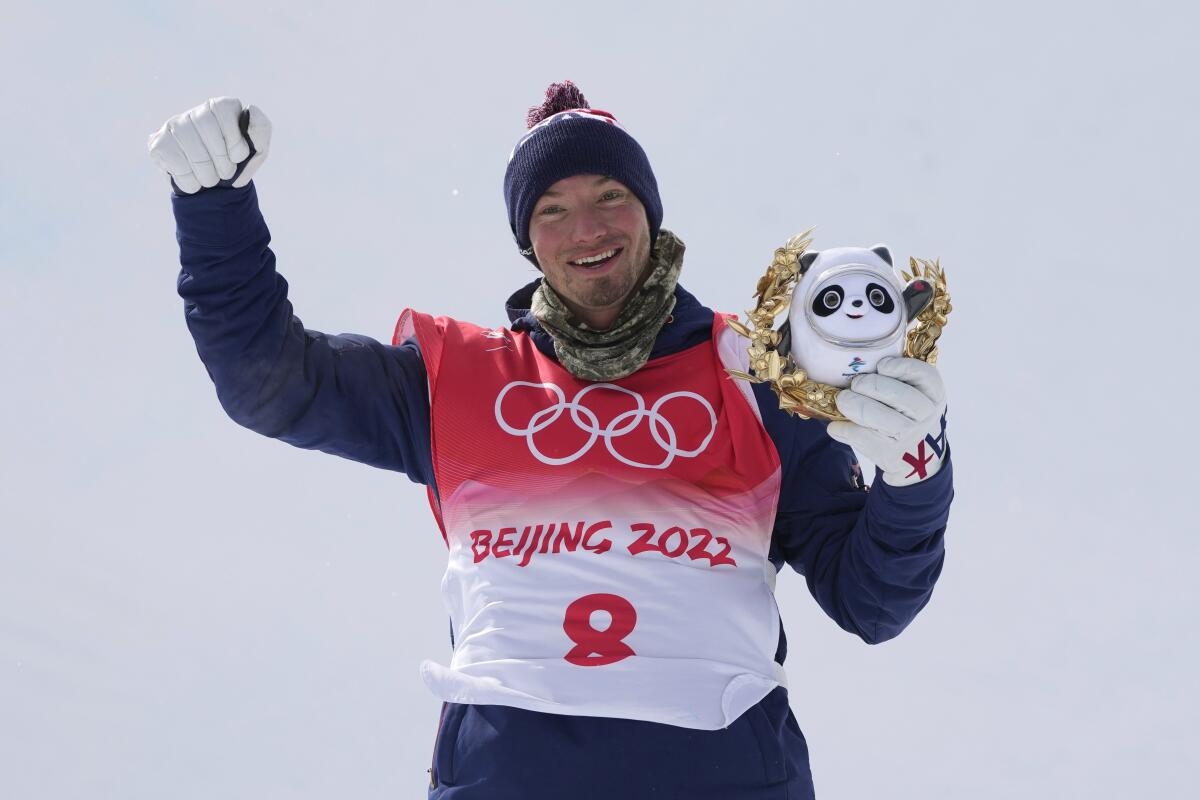
ZHANGJIAKOU, China — In a Pyeongchang podium shuffle, New Zealand’s Nico Porteous dethroned two-time gold medalist David Wise on Saturday in the Olympic ski halfpipe final to upgrade a 2018 bronze medal for his first gold. Wise medaled for his third consecutive Games with silver, and Pyeongchang silver medalist Alex Ferreira took bronze to give the United States two medals for the second time since freeski halfpipe made its Olympic debut.
Since 2014, the United States has won five of the nine men’s freeski halfpipe medals.
“Americans are good at the rebel sports,” Wise said. “I would call halfpipe a rebel sport. It’s a sport where we don’t really like to listen to the rules, we don’t really like to do things the way you tell us we should do that. We like to go out there and put our own signature on it, our own style, do it exactly the way we think it should be done, and that gets judged well in this sport because it’s cool to look unique.”
- Share via
Treatment of Kamila Valieva shows why age limit for figure skaters should be raised
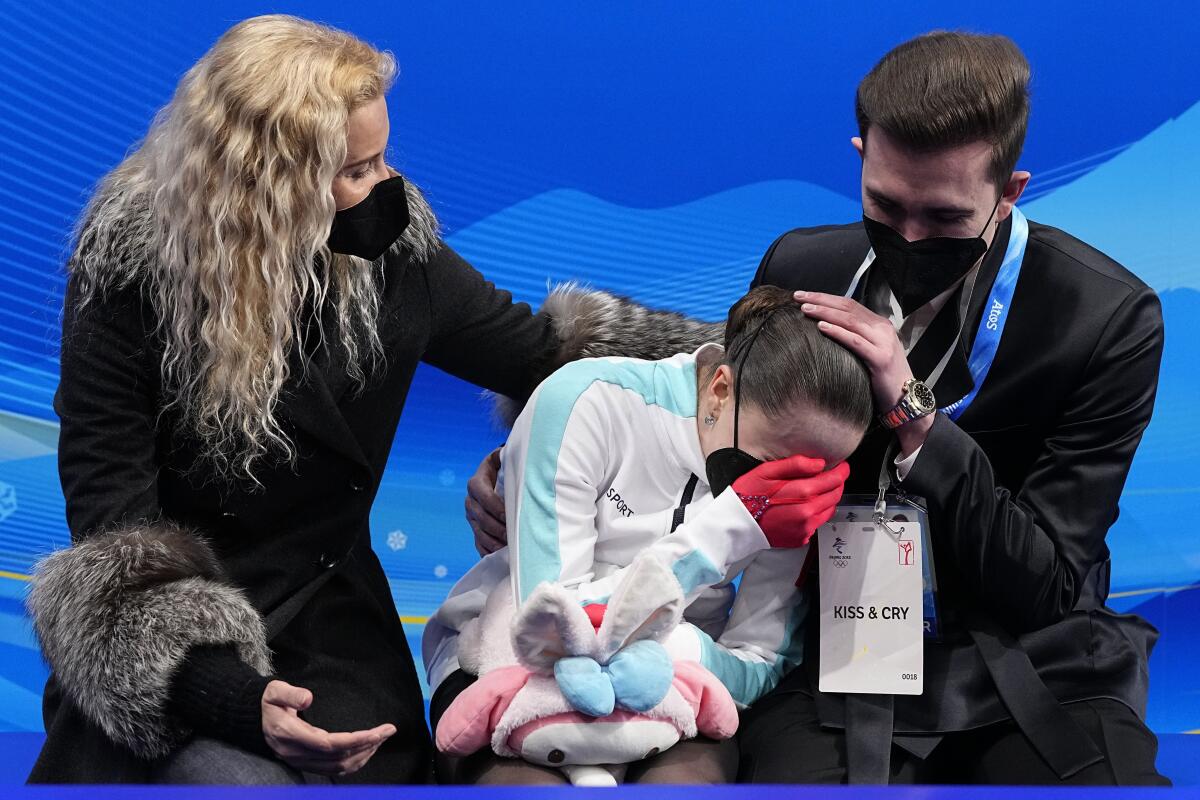
BEIJING — On the morning after figure skating’s night of infamy, International Olympic Committee President Thomas Bach awoke to the deplorable way the adults who are supposed to look after 15-year-old Russian Kamila Valieva have instead emotionally abused her.
It was startling to hear Bach say Friday that he was “very, very disturbed” to see Valieva’s meltdown in her free skate program Thursday and that he was disheartened by the “tremendous coldness” shown by her coach and support team, given that the IOC generally regards female athletes as little more than interchangeable performers whose purpose is to promote the Olympic brand. Valieva’s anguish was so raw, her entourage so callous that not even Bach could ignore it, and he tends to see rainbows and unicorns flitting around the Olympic rings while ignoring the cracks in the foundation.
- Share via
Beijing Olympics loop life: Tight security, bus trips galore and aggressive swabbing

BEIJING — Not all the questions from back home have been about gold-medal performances. Not everyone wants to know why a certain skier fell in the slalom or those curlers went for broke with the hammer throw.
When family and friends — and readers — have queried a handful of Times staff at these Winter Olympics, they have often asked about life in the bubble.
These are the second Games under the pall of the pandemic, but Tokyo was far looser last summer. The Chinese have instituted a “closed-loop system” every bit as thorough and restrictive as it sounds.
- Share via
Sui Wenjing and Han Cong of China finish with record score in pairs short program
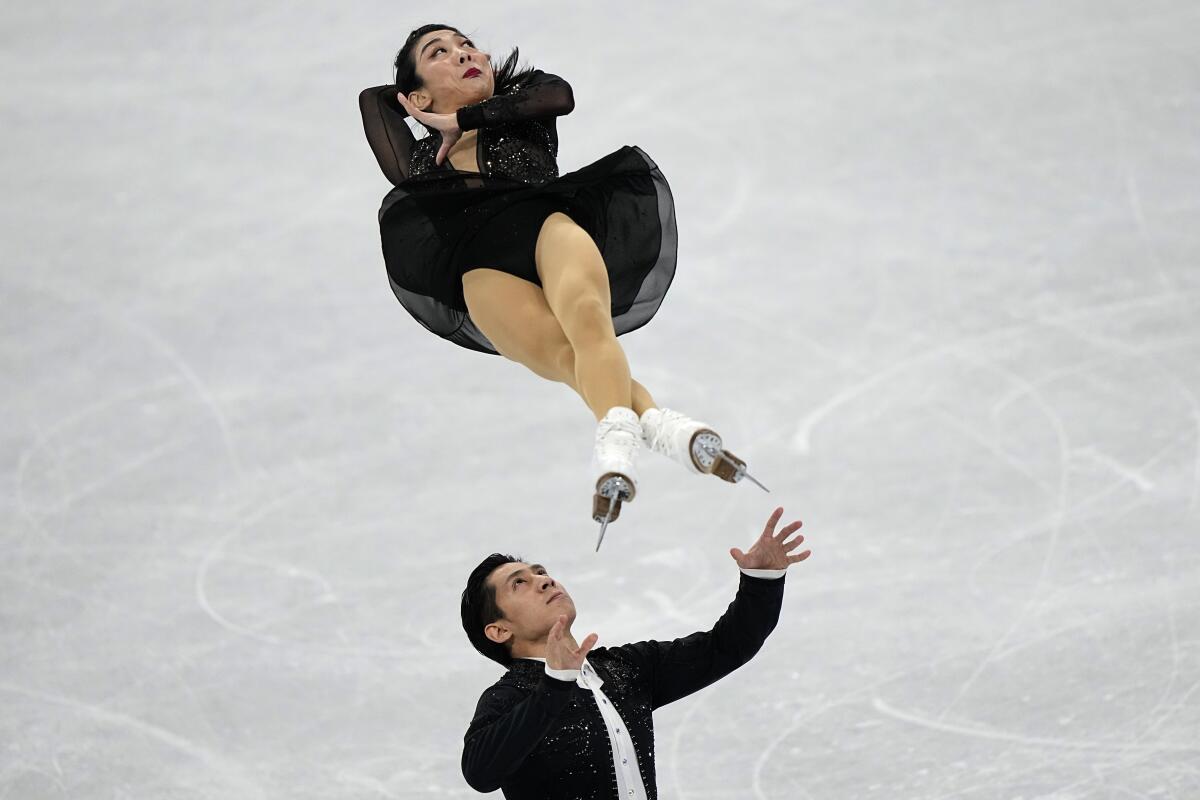
BEIJING — Pair skaters Sui Wenjing and Han Cong of China set a record for a short program score, earning 84.41 points for their performance to “Mission Impossible 2” on Friday but holding only a narrow lead after the first segment of the Olympic pairs competition.
Sui and Han, who were silver medalists four years ago at Pyeongchang, performed a riveting program. But Evgenia Tarasova and Vladimir Morozov of the Russian Olympic Committee weren’t far behind, with 84.25 points to their performance to “Galatea and Pygmalion.” Anastasia Mishina and Aleksandr Galliamov of the Russian Olympic Committee, who won the 2021 world title, are third with 82.76 points.
Americans Alexa Knierim and Brandon Frazier, who train at Great Park Ice in Irvine, performed a solid program to “House of the Rising Sun,” which earned them 74.23 points. They stand sixth entering Saturday’s free skate finale.
“Really proud of it,” Knierim said of the duo’s performance. “We stayed committed to the plan. We’ve trained so hard to endure whatever was brought to us.”
Frazier paid tribute to Knierim’s work ethic and strength. “To be here with a partner that’s so strong and giving the same amount of effort you give yourself, it’s something you can’t beat,” he said. “And I’m enjoying every second of this experience and I can’t be more grateful.”
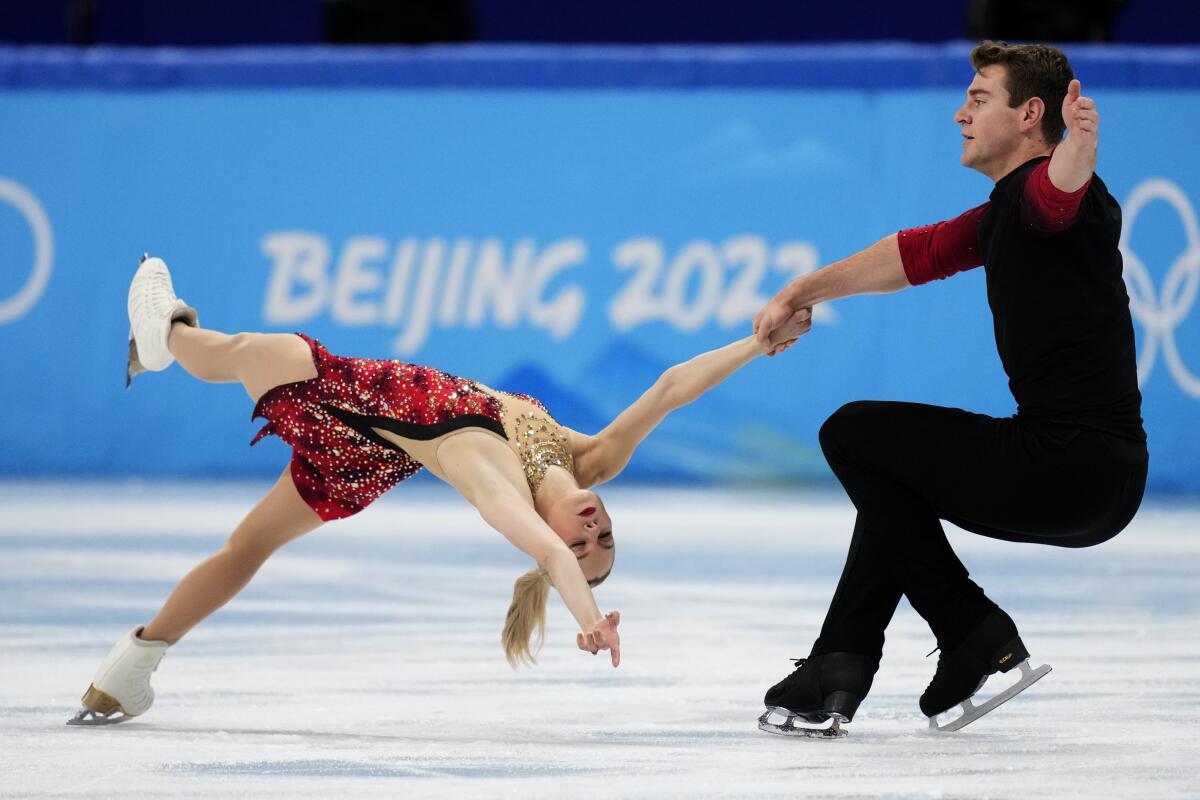
Knierim competed in the 2018 Games with her husband, Chris, and they finished 15th. When he retired she teamed up with Frazier. “It’s an absolute dream come true,” Frazier said of his first Olympic appearance.
The other American entry, Ashley Cain-Gribble and Timothy LeDuc, stood seventh, with 74.13 points.
“Officially we’re Olympians now, and it’s pretty amazing to say,” said Cain-Gribble, who said she had sustained an injury in practice two days ago but didn’t specify the nature of the injury. “To get a season-best score and to just feel like you enjoyed every moment, it makes all those days of hard work and ups and downs, it’s so worth it. I can’t say it enough: Keep fighting for your dreams because look where we are.”
LeDuc became the first openly nonbinary athlete to compete in the Olympics.
- Share via
Elana Meyers Taylor to carry American flag at closing ceremony
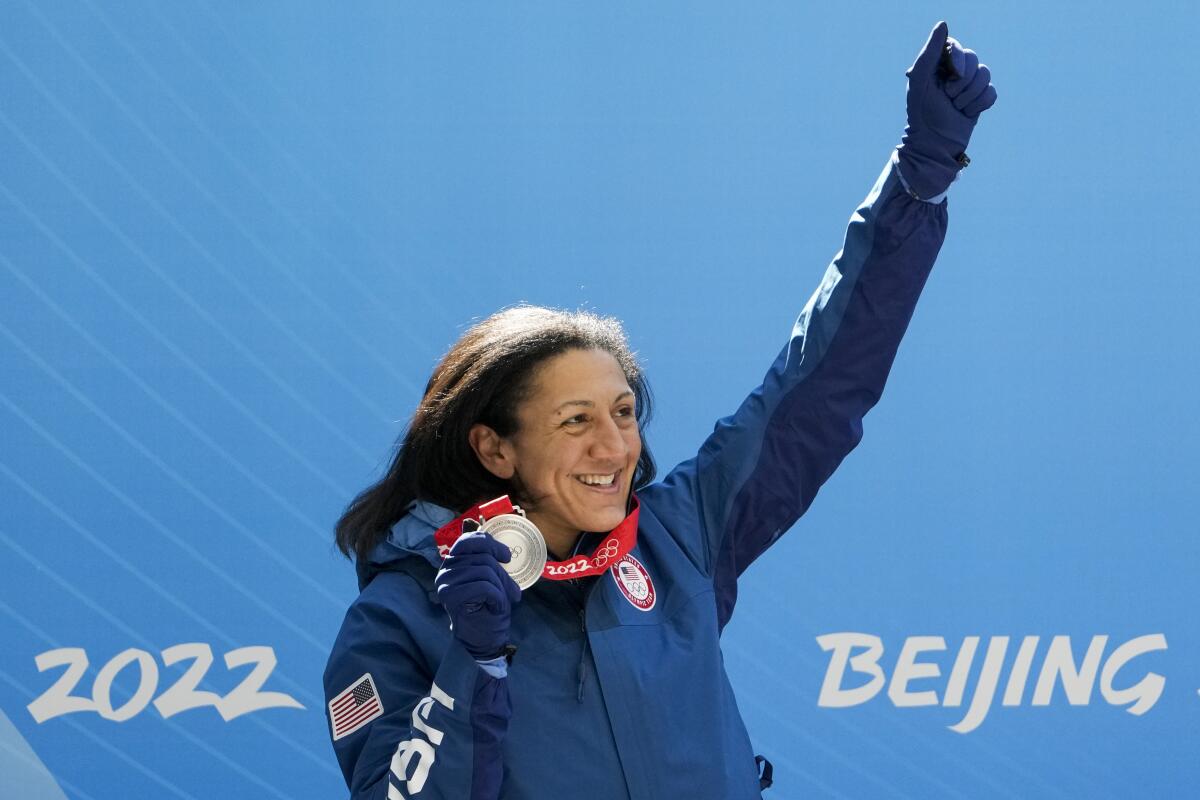
Elana Meyers Taylor has been picked to be a flagbearer again. And this time, she’ll be able to take the job.
The U.S. Olympic and Paralympic Committee announced Friday night that the four-time Olympian bobsledder will carry the American flag into Sunday night’s closing ceremony of the Beijing Games.
The announcement was synched to Meyers Taylor’s first run in the two-woman bobsled event. As soon as she crossed the line in the first heat, the USOPC revealed that she was the flagbearer pick.
Meyers Taylor was chosen to be one of the flagbearers for the U.S. at the opening ceremony Feb. 4 but could not participate because she was in isolation following a positive coronavirus test. That spot went to speedskater Brittany Bowe instead, who led the U.S. delegation into the opening alongside curler John Shuster.
Meyers Taylor earned a silver medal Monday in the first ever Olympic monobob event.
- Share via
Norway’s Johannes Thingnes Boe wins men’s biathlon mass start
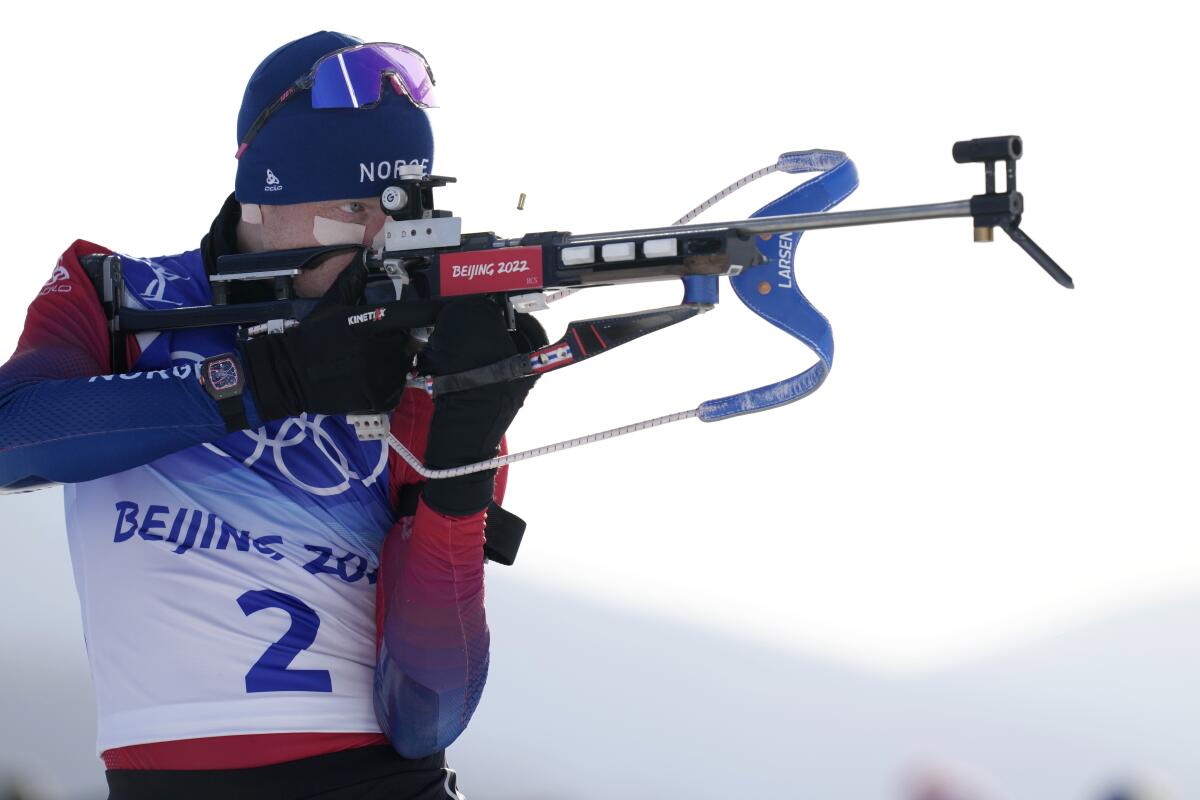
Johannes Thingnes Boe looked like his old self again, dominating from the start and holding his composure through the four shooting stages to win the Olympic gold medal Friday in the biathlon mass start race.
The Norwegian great threw his arms in the air as he crossed the line in 38 minutes, 14.4 seconds.
Martin Ponsiluoma of Sweden missed only one target in the last shooting and left the range chasing Boe. He earned silver, 40.3 seconds behind Boe. Vetle Sjaastad Christiansen of Norway shot clean in the last shooting and took bronze, finishing 1:12.5 behind.
- Share via
Thomas Krol wins men’s 1,000-meter speedskating
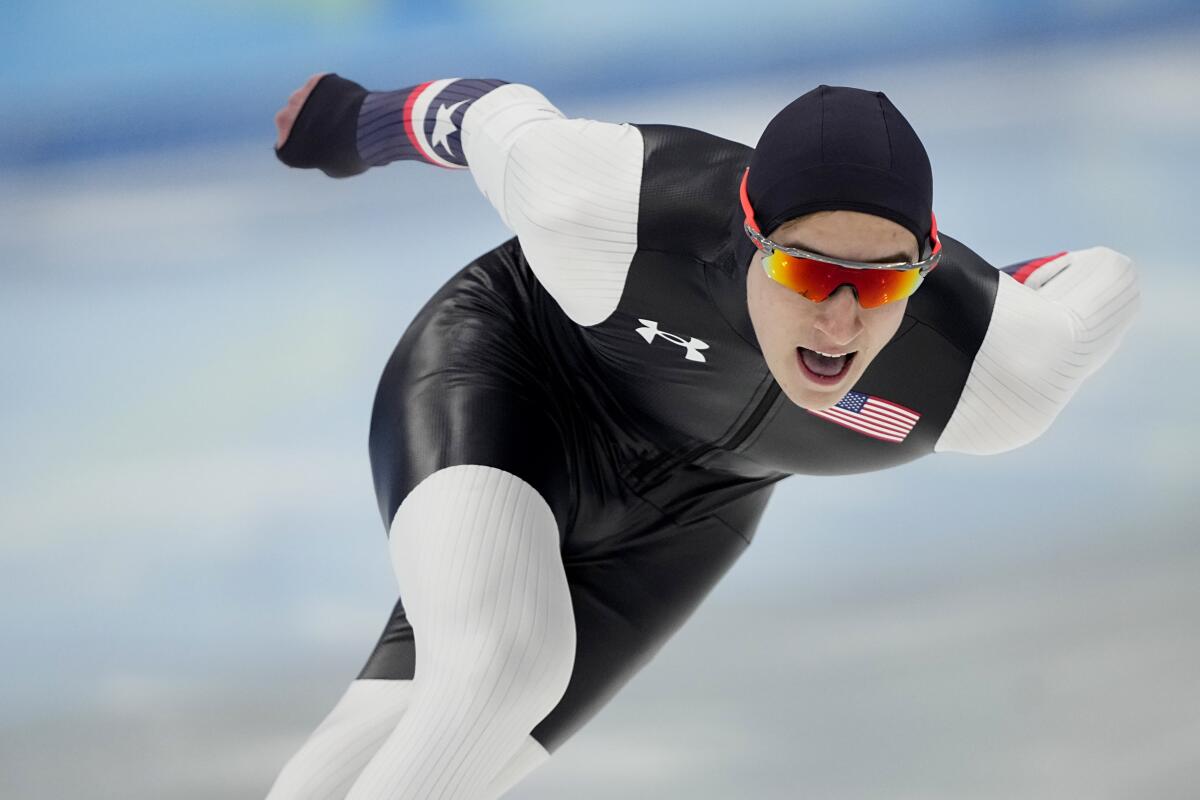
BEIJING — Thomas Krol won gold in the 1,000 meters on Friday, giving the Netherlands its third straight Olympic speedskating title in the event.
Krol was timed in 1 minute, 7.92 seconds.
Laurent Dubreuil of Canada took silver. Haavard Lorentzen of Norway, the 2018 silver medalist, earned bronze.
The Netherlands claimed its fifth gold medal in 12 events in Beijing with one day of competition remaining.
Krol extended the Dutch dominance in the 1,000. In 2014, Stefan Groothuis won and Kjeld Nuis followed with a victory in 2018. Krol led the World Cup standings this season.
It was Krol’s second medal in Beijing. He earned silver in the 1,500 behind Nuis.
Dubreuil finished in 1:08.32. Lorentzen clocked 1:08.48.
Skating in the last pair with Dubreuil, current world champion Kai Verbij of the Netherlands pulled up coming off the next-to-last turn in the race.
Jordan Stolz, a 17-year-old making his Olympic debut, was the highest finishing American in 14th.
- Share via
Canada defeats U.S. for bronze in men’s curling
BEIJING — Sixteen years after he won the Olympic curling gold medal, Brad Gushue is going back to Canada with bronze.
The Canadians capitalized on a missed final shot by American — and reigning Olympic champion — John Shuster in the second-to-last end that turned a one-point edge into an insurmountable 8-5 lead.
Gushue won gold in Turin in 2006. Back then, he shared a podium with Shuster, who won bronze.
This time, the Canadian skip knocked his American counterpart off it.
Shuster has been back at every Winter Games since, winning it all in Pyeongchang and earning the honor as a U.S. flag bearer for the Beijing opening ceremony.
Gushue wasn’t able to get through the ultra-competitive Canadian Olympic trials again until this year.
The Americans took a 5-4 lead with two points in the sixth, then Canada scored two in the eighth to take the lead. With the United States holding the last-rock advantage in the ninth, Shuster tried to knock loose two Canadian rocks in the scoring area but missed.
That gave Gushue two points, with one end to go. Canada’s third-to last shot cleared all of the American rocks out of the target area, leaving no chance for the U.S. to tie the match, and Shuster immediately conceded.
- Share via
Justine Braisaz-Bouchet wins women’s biathlon mass start
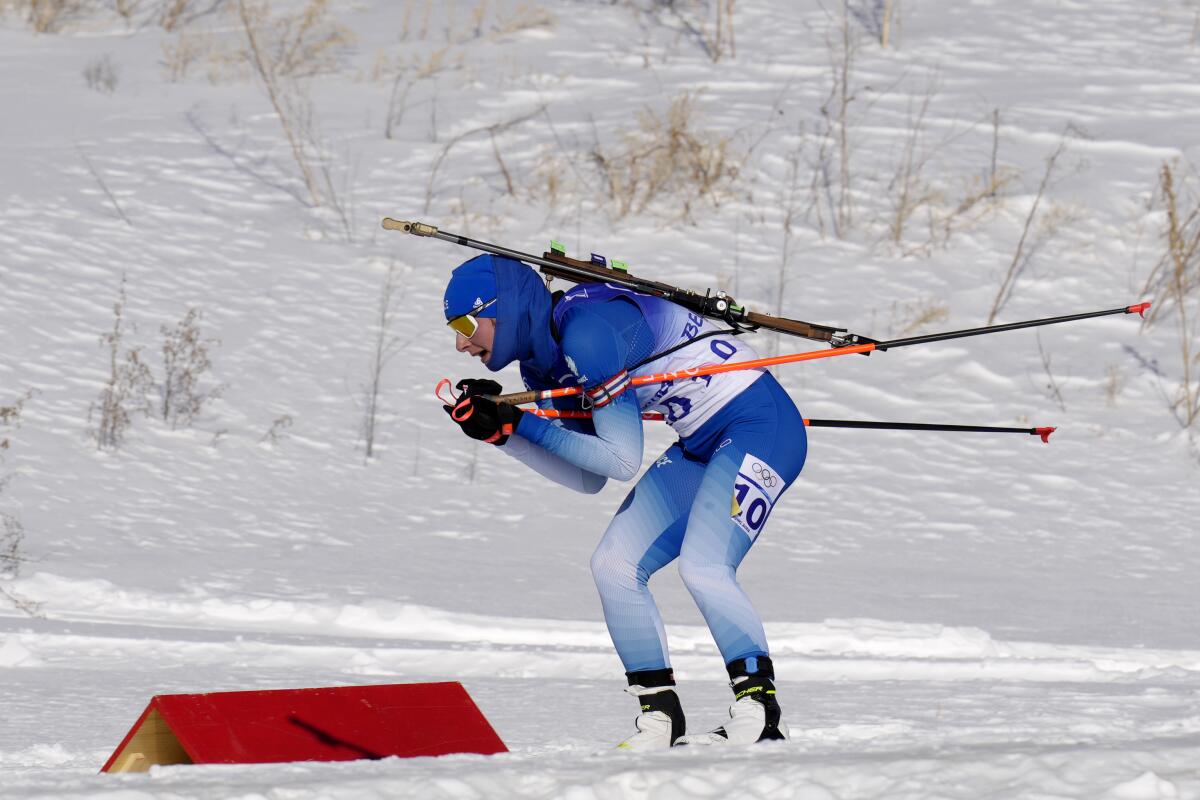
ZHANGJIAKOU, China — Justine Braisaz-Bouchet moved to the front with strong, patient shooting and stayed there with her cross-country skiing to win the women’s biathlon mass start race Friday at the Olympics.
A bitter wind affected the field as they lined up each time to shoot, but Braisaz-Bouchet only missed once in the last standing shooting and skied out of the range in first place. She held on and crossed the line carrying a French flag in 40 minutes, 18 seconds.
Norwegian teammates Tiril Eckhoff and Marte Olsbu Roeiseland missed two targets each in that last bout and left the range together, 48 seconds behind the Frenchwoman. Eckhoff chased hard and crossed the line for the silver, trailing Braisaz-Bouchet by 15.3 seconds.
Roeiseland took bronze — her fifth medal at the Beijing Games.
Roeiseland is the second biathlete, male or female, to win a medal in all four individual events at an Olympics, matching Norwegian great Ole Einar Bjoerndalen. She also won gold in the mixed relay.
The women’s competition was moved up from Saturday to Friday, just before the men’s race, because of cold temperatures and high winds in the forecast. It was minus 13 degrees C (8.6 degrees F) at the range with strong wind.
The brutal wind and cold has taken a toll on the athletes.
- Share via
Switzerland gets gold and silver in skicross final
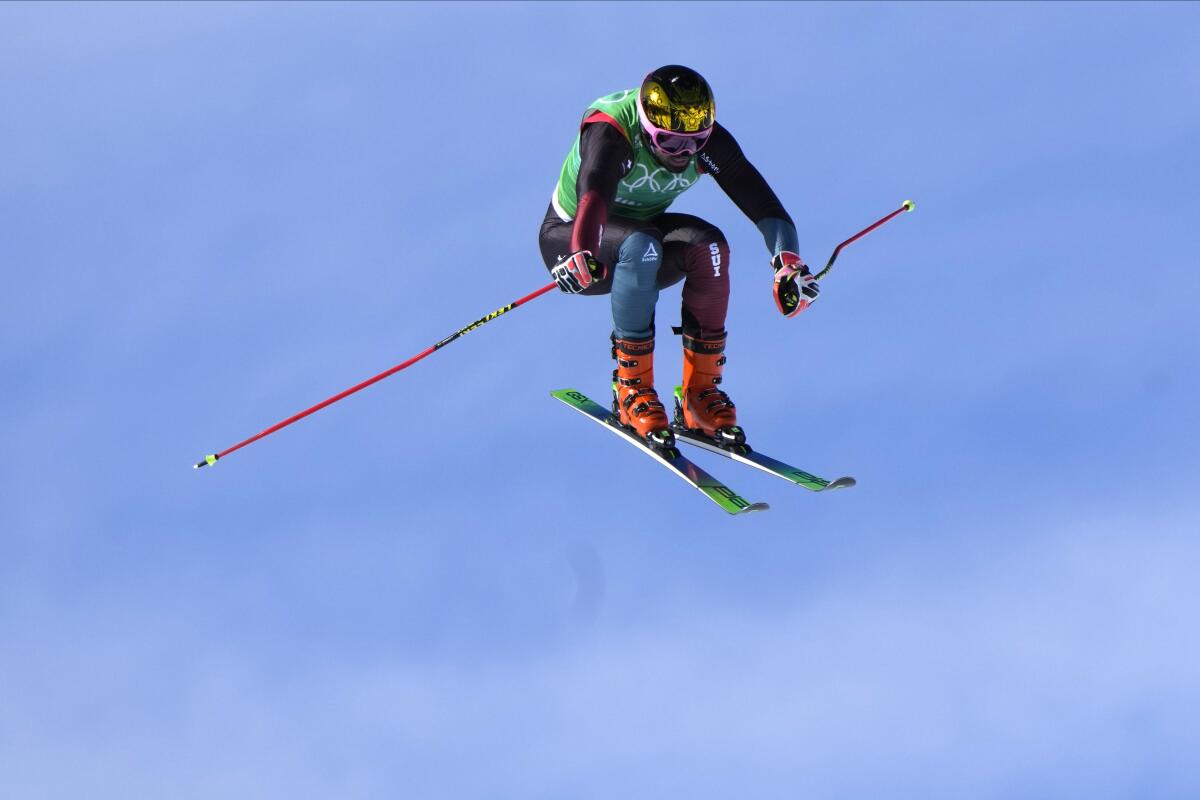
ZHANGJIAKOU, China — Ryan Regez led a 1-2 finish by Switzerland in the Olympic skicross final on Friday at Genting Snow Park.
Regez grabbed the lead early and never relinquished it along a course filled with bumps, jumps and rolling terrain. He raised his arms in triumph shortly after crossing the finish line.
His teammate, 36-year-old Alex Fiva, finished with the silver medal and Russian athlete Sergey Ridzik grabbed the bronze.
As a kid, Regez always thought his future was in Alpine skiing, more specifically the downhill. When that didn’t pan out, he started an apprenticeship as a structural draftsman before discovering skicross.
It paid off in gold.
In the small final, Italian skicross racer Simone Deromedis won the heat with a little bit of flair. He was coming off the last jump and did the splits before crossing the finish line.
- Share via
China’s Eileen Gu wins gold in women’s freestyle halfpipe
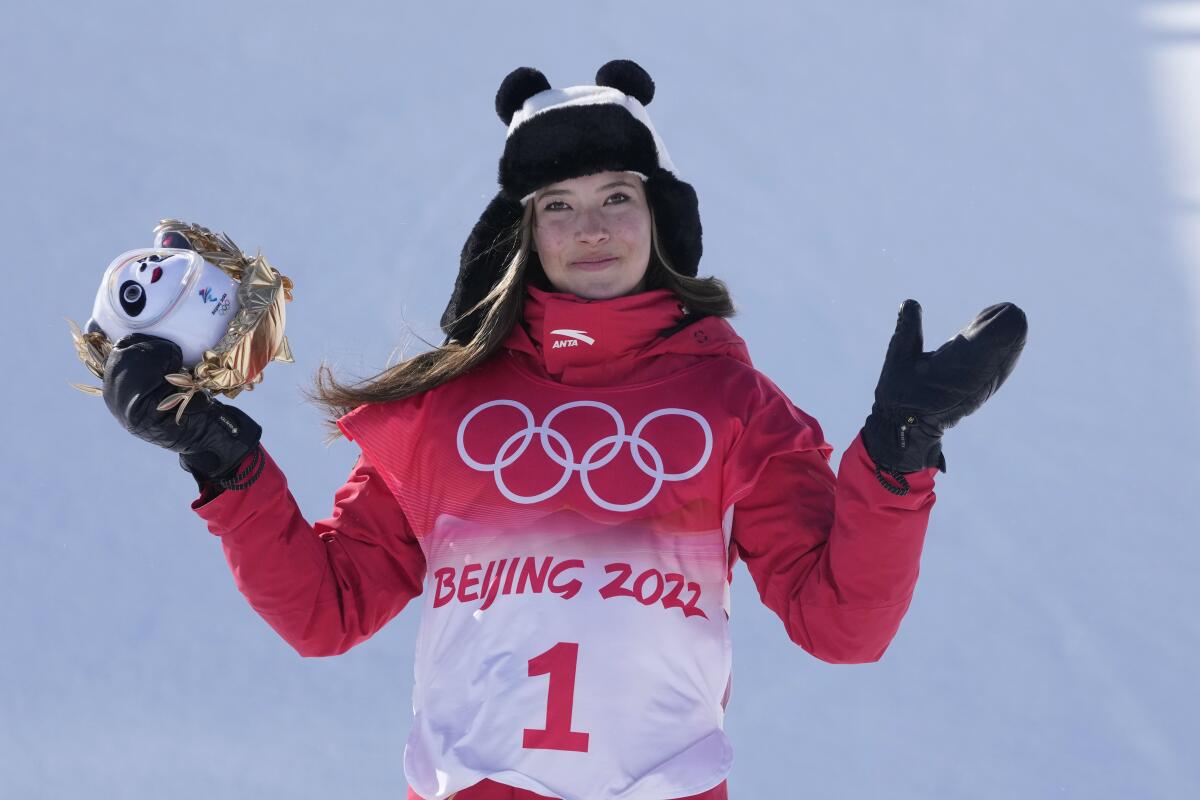
ZHANGJIAKOU, China — When some competitors barely cleared the top of the halfpipe on late-run tricks, Chinese star Eileen Gu continued to soar. Camera operators bent backward to track the teenager’s motion through the air as she climbed higher and higher just as she has for the last two weeks.
Gu reached a new level Friday, becoming the first freestyle skier to win three medals in the same Olympics. After gold and silver in slopestyle and big air, respectively, she dominated the women’s halfpipe final at Genting Snow Park. Gu recorded the two highest scores of the competition, including a gold-medal-winning 95.25 on her second attempt, before taking a teary-eyed victory lap.
Canadians Cassie Sharp and Rachael Karker took silver and bronze, respectively. American Hanna Faulhaber finished sixth in her first Olympics while Brita Sigourney and Carly Margulies finished 10th and 11th.
Fans who had been limited to just one section of the stands at Genting Snow Park braved blistering winds Friday and spilled over to fill more than two-thirds of the viewing area. Olympic volunteers arrived en masse to catch a glimpse of freeskiing’s golden girl. A group of fans held signs that read in Chinese, “Go Gu Ailing.”
- Share via
IOC president Thomas Bach comments on Russian figure skater Kamila Valieva situation
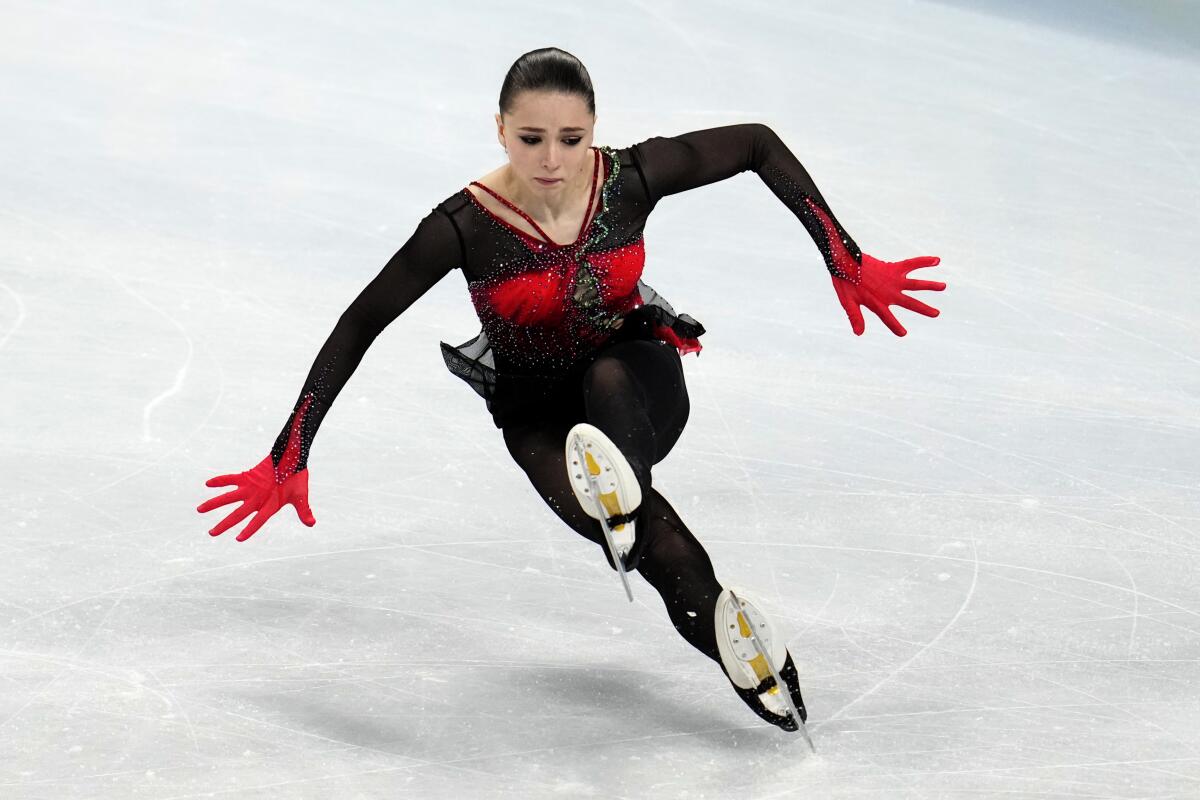
BEIJING — International Olympic Committee President Thomas Bach decried the “coldness” with which embattled Russian figure skater Kamila Valieva was greeted by her entourage after she performed a mistake-filled free skate program that dropped her from first to fourth in the women’s singles competition on Thursday and said he was “very, very disturbed” while watching her performance and the immediate aftermath on TV.
Valieva tested positive for a banned substance on Dec. 25 but was allowed to compete because the results of that test were not delivered until a day after she helped lead the Russian Olympic Committee to a gold medal in the team event. She was suspended for one day by the Russian Anti-Doping Federation. The IOC and other organizations were rebuffed by the Court of Arbitration for Sport when they requested that her suspension be reinstated.
Valieva, 15, was the favorite to win the gold medal and led after the short program but she stumbled several times on Thursday. After she left the ice cameras and recording equipment picked up her coach, Eteri Tutberizde, asking her, “Why did you let go?” in implying Valieva had lost focus after she was unable to land her second jump, a triple axel. “Explain it to me, why. Why did you stop fighting? You let go after that axel. Why?”
Tutberidze is known as a hard-driving coach who turns young teenagers into champions, though at the cost of short careers.
In the meantime, Tutberidze ignored another of her students, Anna Shcherbakova, who won the gold medal. Bronze medalist Alexandra Trusova, who also is coached by Tutberidze, apparently was upset that she didn’t win despite performing five quads in her program and said, “I don’t want to do anything in figure skating ever in my life. Everyone has a gold medal, I don’t.”
Bach, a former fencer, said his competitive history helped him recognize that Valieva was under considerable pressure. “But this pressure is beyond my imagination and in particular for a girl of 15 years old, and to see her there struggling on the ice, seeing how she tries to compose herself again, how then she tries to finish her program, you could in every moment and the body language you could feel that this is an immense, immense stress and maybe she would have preferred just to live the ice and leave this story behind her,” he said.
“But that was not all. When I afterward saw how she was received by her closest entourage with such what appeared to be a tremendous coldness, it was chilling to see this. Rather than giving her comfort, rather than to try to help her, you could feel this chilling atmosphere, this distance. And if you were interpreting the body language of them, it got even worse because there was even some kind of dismissive gestures.”
He also said he was concerned with the treatment Trusova received. “All of this does not give me much confidence in the closest entourage of Kamila neither with regard to what happened in the past nor as far as it concerns with the future,” he said. “I can only wish for her that she has the support of her family, support of her friends, the support of the people who help her over this extremely difficult situation and that then we can only hope for her to see that this is being addressed in the right way and there is not a traumatic experience for such a young woman.”
Bach also said he wanted to correct published reports that he had offered Olympic torches as a consolation prize to members of the silver medal-winning U.S. skaters in the team event while they await the outcome of an investigation into Valieva’s positive test. The IOC decided not to award medals during the Games. The offer of the torches, he said, was made to express appreciation for the American skaters’ participation in a meeting to discuss why the medals were not awarded here.
- Share via
U.S. falls to Britain in curling semifinals, will play Canada for bronze
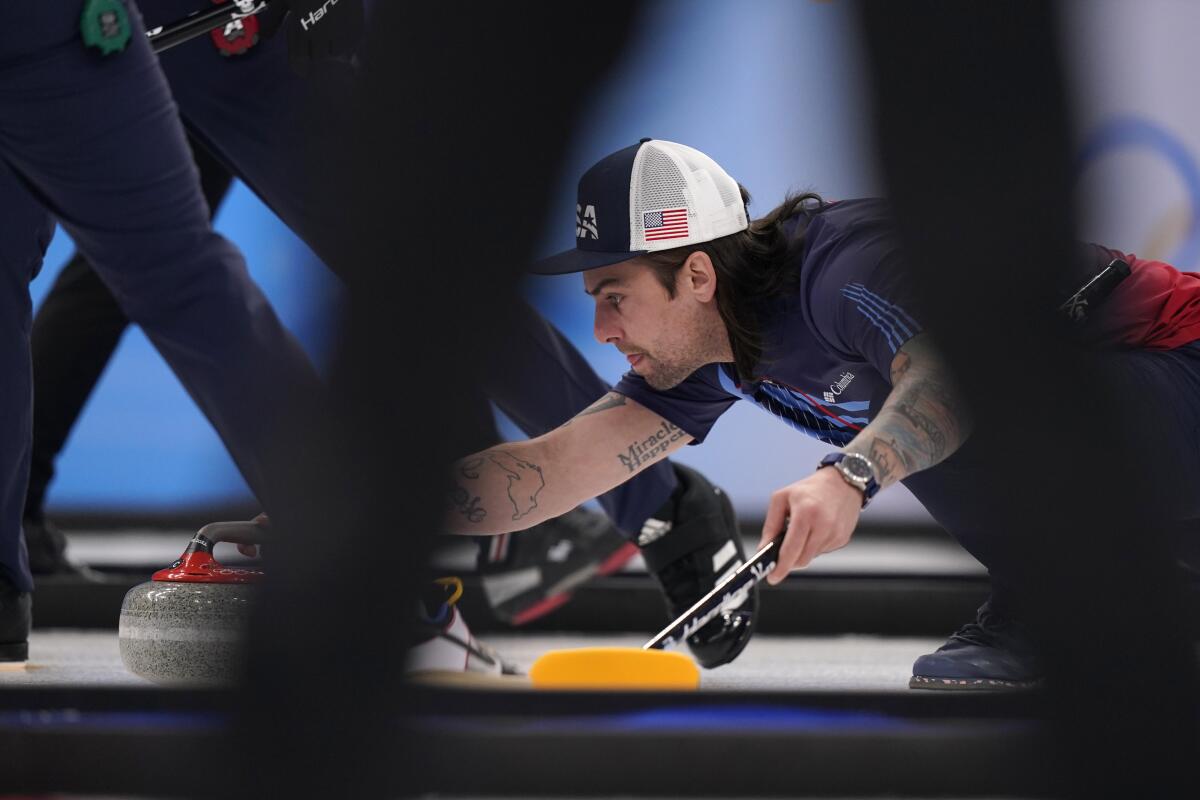
BEIJING — The British have clinched their first medal of the Beijing Games, thanks to Bruce Mouat and the men’s curling team.
Four Scottish lads beat the defending Olympic champion U.S. 8-4 in the semifinals Thursday night to clinch no worse than a silver medal and earn the right to play Sweden for the gold.
Although Scotland is curling’s birthplace and the sport remains a national passion, the British have not won the men’s gold — and have just two medals of any color — since the sport returned to the Winter Games in 1998.
“It’ll be some party back home if we do,” British lead Hammy McMillan said. ”It would mean the absolute world to everyone if we do.“
The Swedes topped Canada 5-3 in the other semifinal at the Ice Cube curling venue. Skip Niklas Edin will have a chance to complete his set of Olympic medals, having won bronze in Sochi and a silver in Pyeongchang.
John Shuster, who won bronze in 2006 and gold four years ago — the only Olympic curling medals in U.S. history — will skip the Americans in the third-place game against Canada.
“What we have to just realize is we have the opportunity to come back here and be on an Olympic podium, winning an Olympic medal for the United States of America,” Shuster said. “And I think we’re going to — I know we’re going to be ready to come out tomorrow and play and do that.”
Trailing 5-4 at the five-end break, the Americans intentionally blanked three straight ends to retain control of the last-rock advantage, known as the hammer. They would have happily done it again in the ninth end, but Britain boxed them in, and Shuster intentionally threw away his last stone — conceding one point to retain the hammer in the 10th, trailing 6-4.
In the final end, Mouat left Shuster no good options for his final stone, and in desperation he wound up knocking away all of the red rocks in the scoring area to leave two British yellow ones.
“We lost to a team that played better. That’s the long and the short of it,” U.S. second Matt Hamilton said. “There’s nothing you can really say or to sugarcoat it.
- Share via
Once again, Mikaela Shiffrin doesn’t finish, calls herself a ‘joke’
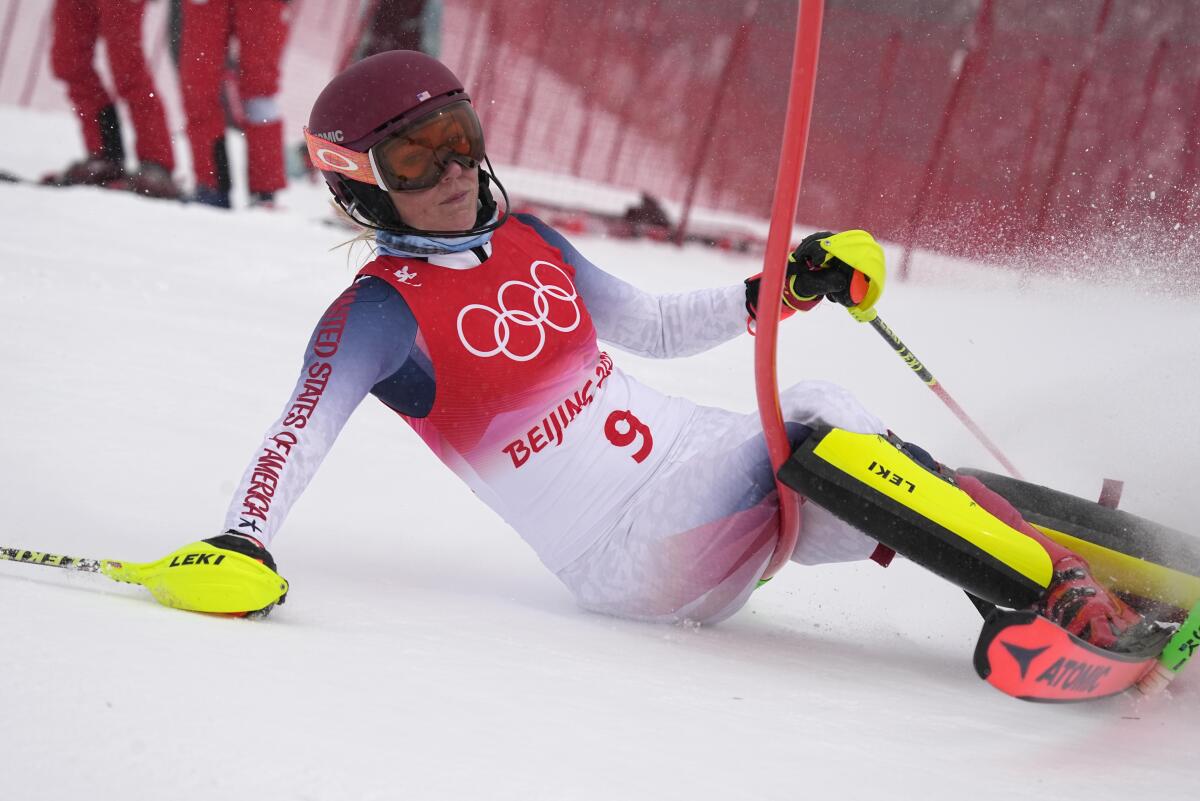
BEIJING —The final obstacle between Mikaela Shiffrin and a medal was the plunging slalom course called the Ice River.
After two weeks of hype and heartbreak at the Winter Olympics, all the world’s most dominant female skier needed was a clean run through the 63 gates to earn a spot on the podium in the combined.
But as the sun fought to break through snow flurries that dusted the Yanqing National Alpine Centre on Thursday, Shiffrin’s inexplicable Olympics took another inexplicable turn in her fifth and final individual event.
One of her skis clipped a gate seconds into the race and sent her crashing into the snow as disbelieving gasps filled the finish area from people watching the giant video board.
The race — and her last chance to win an individual medal — ended in a staggering instant as she didn’t finish a race for the third time at these Games.
“Come on, how many times have I [not finished] in my whole career?” Shiffrin asked rhetorically. “Of course, she’s at least going to make it to the finish. This could just be the medal that salvages everything after all. Right now I just feel like a joke.”
- Share via
ROC figure skater Kamila Valieva tumbles out of medal contention
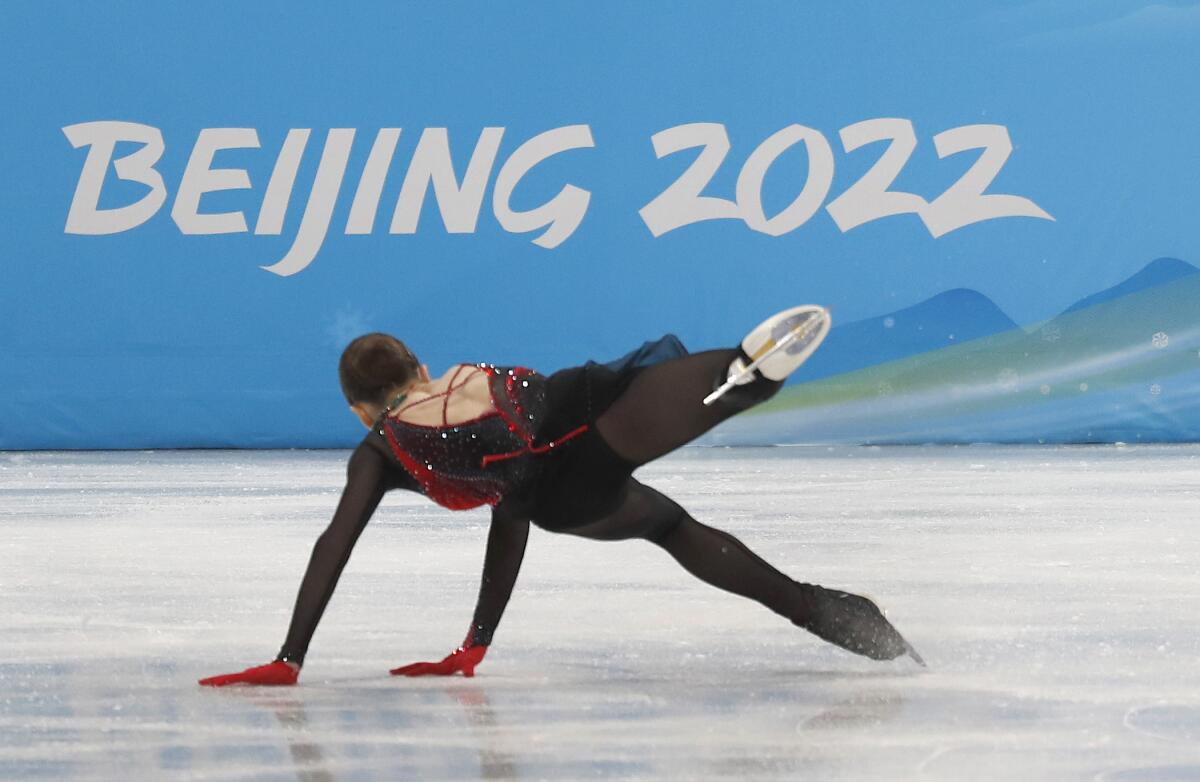
BEIJING — Maybe the pressure was too much for a teenager — even a precociously talented teen such as Kamila Valieva.
The 15-year-old Russian figure skater, embroiled in doping accusations all week at these Beijing Olympics, faltered in the women’s free skate final on Thursday night, tumbling from the lead and finishing in fourth place.
Fellow Russian Anna Shcherbakova took advantage of Valieva’s stumbles, rising from second place to capture gold at Capital Indoor Stadium on Thursday night.
Alexandra Trusova, also of the Russian Olympic Committee, won silver and Kaori Skamoto of Japan took bronze.
- Share via
Miho Takagi wins women’s speedskating 1,000 meters; Brittany Bowe gets bronze
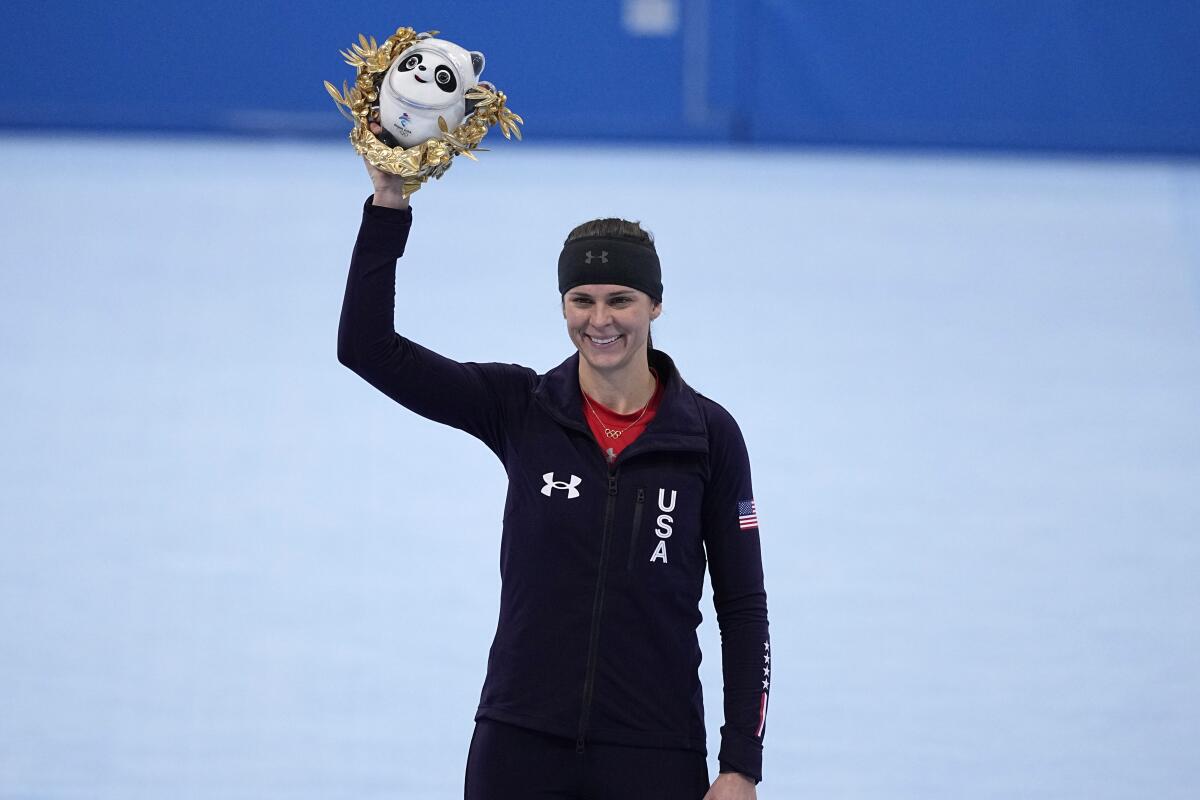
BEIJING — Miho Takagi of Japan won her fourth speedskating medal of the Beijing Games and the first individual gold of her career with an Olympic-record victory in the women’s 1,000 meters Thursday.
The silver went to Jutta Leerdam of the Netherlands, while Brittany Bowe of the United States claimed the first individual medal of her career with a bronze.
Takagi added to silver medals in the 500, 1,500 and team pursuit at the Beijing Games — especially sweet after losing a gold in the pursuit when her older sister, Nana, fell in the final turn with Japan leading.
Miho Takagi eclipsed her performance from the Pyeongchang Games four years ago, where she took gold in the team pursuit, silver in the 1,500 and bronze in the 1,000.
Takagi won with a time of 1 minute, 13.19 seconds, easily breaking the previous Olympic record of 1:13.56 set in 2018 by Jorien ter Mors.
Ter Mors did not get a chance to defend her title after failing to make the powerful Dutch team, but the Netherlands still came away with a medal.
Leerdam posted a time of 1:13.83 despite dragging her left hand on the ice to stay upright in a turn.
Bowe grabbed the bronze in 1:14.61, only 0.1 ahead Russian skater Angelina Golikova and a huge relief for the longtime star of the U.S. program.
Bowe’s only medal over three Olympics had been a bronze in the team pursuit at the Pyeongchang Games.
The 2018 Games were especially excruciating for the 33-year-old former inline champion from Ocala, Fla. Bowe had one fourth-place showing and two fifths in her three individual events, missing out on three potential medals by a total of 0.85 seconds.
This time, the clock worked in her favor.
Bowe’s medal was the third at the Beijing Games for a much-improved American team — with all three ex-inline skaters from Ocala contributing to the haul. Erin Jackson won the 500 meters, and Joey Mantia led a bronze-medal effort in the men’s team pursuit.
The U.S. team won only one medal — total — at the last two Winter Olympics.
Bowe was widely lauded before the Games for giving up her spot in the 500, an event she won at the U.S. trials, to ensure that Jackson would be able to skate in Beijing.
The gold medal favorite slipped at the trials and finished third, putting her spot on the team in jeopardy. Bowe’s generosity allowed Jackson to begin preparing for the Olympics without the weight of wondering if she’d get a chance to race in her best event.
The Americans wound up with a third spot after the final allocations were made, so Bowe and Jackson both competed in the 500.
Jackson skated to a groundbreaking gold, becoming the first Black woman to win an Olympic speedskating medal, and she was effusive in her praise for Bowe’s gesture.
Bowe finished 16th in the 500 and only managed a 10th-place showing in the 1,500. She was down to perhaps her last chance in 1,000 since it seems unlikely she’ll return for a fourth Olympics in 2026.
After a lap, it was clear that Bowe wasn’t going to catch the blistering times of the top two skaters, but she hung on at the end to claim a bronze that almost surely felt like a gold.
A few hours before the race, Jackson — who has already traveled back to the U.S. after her only Olympic event — tweeted words of encouragement to Bowe.
“You are a mentor. A friend. A teammate. A sister,” Jackson wrote. “Thank you for playing a huge part in my journey to gold.”
- Share via
Michelle Gisin wins women’s combined; Mikaela Shiffrin does not finish
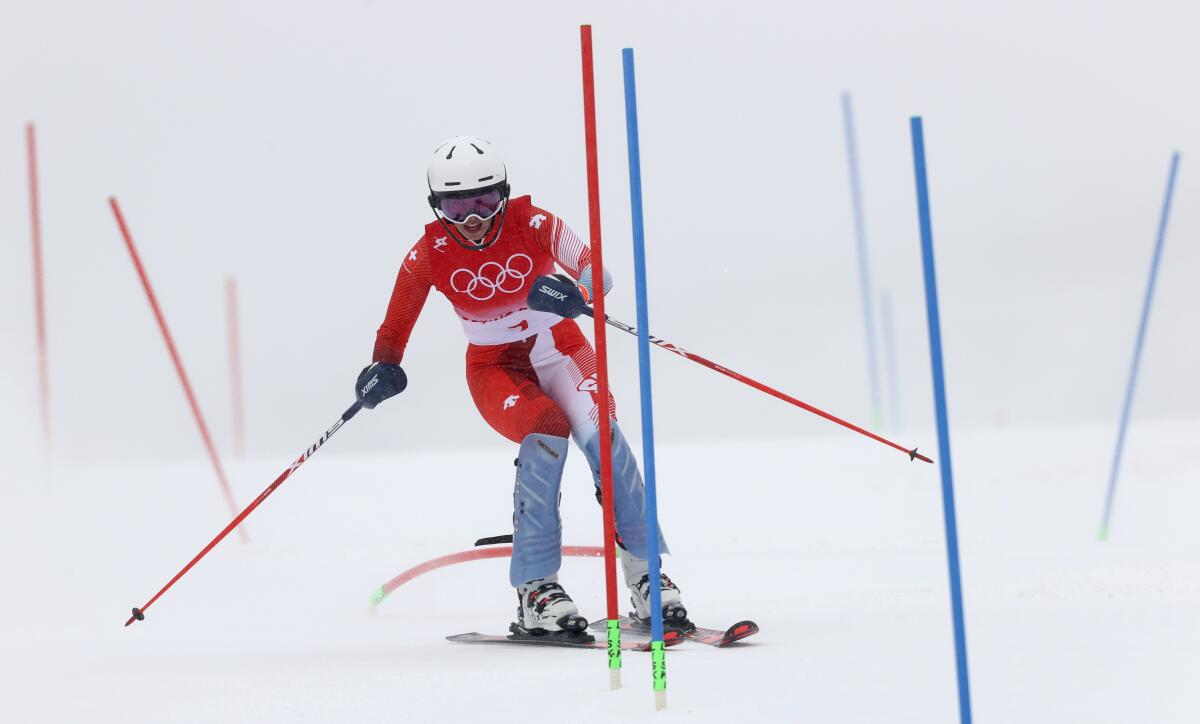
BEIJING — Michelle Gisin’s second straight Olympic title in the Alpine combined lifted Switzerland’s ski team to new heights.
Gisin won Thursday’s two-leg race on the Ice River course, completing her slalom run shortly after Mikaela Shiffrin again skied off course. That gave the Swiss team a record fifth Alpine gold medal at the Beijing Games.
No country has ever won so many Alpine events at one Winter Games.
Gisin beat Switzerland teammate Wendy Holdener by more than a second. Federica Brignone of Italy was third.
All three had already won medals in China. Gisin took bronze in the super-G, Holdener earned bronze in the slalom and Brignone won a silver in the giant slalom.
Switzerland’s other gold medalists were Corinne Suter in the women’s downhill, Lara Gut-Behrami in the women’s super-G, Marco Odermatt in the men’s giant slalom and Beat Feuz in the men’s downhill.
Shiffrin was fifth-fastest in the downhill portion of the race but the two-time Olympic champion went out without making it to the bottom in the slalom leg. The American won a silver medal in the combined four years ago.
Shiffrin has had a rough time on the slalom slope. She skied out in the giant slalom and the slalom — the two events she has previously won at the Olympics. She then finished ninth in the super-G and 18th in Tuesday’s downhill.
Ester Ledecka ended up in fourth place in her bid to win a back-to-back double.
The 2018 super-G champion became the first competitor to win gold in two different sports at the same Winter Games four years ago. She successfully defended her gold in snowboarding’s parallel giant slalom last week but missed out in both the super-G and the combined.
- Share via
American men go four-for-four, send full team to freeski halfpipe finals
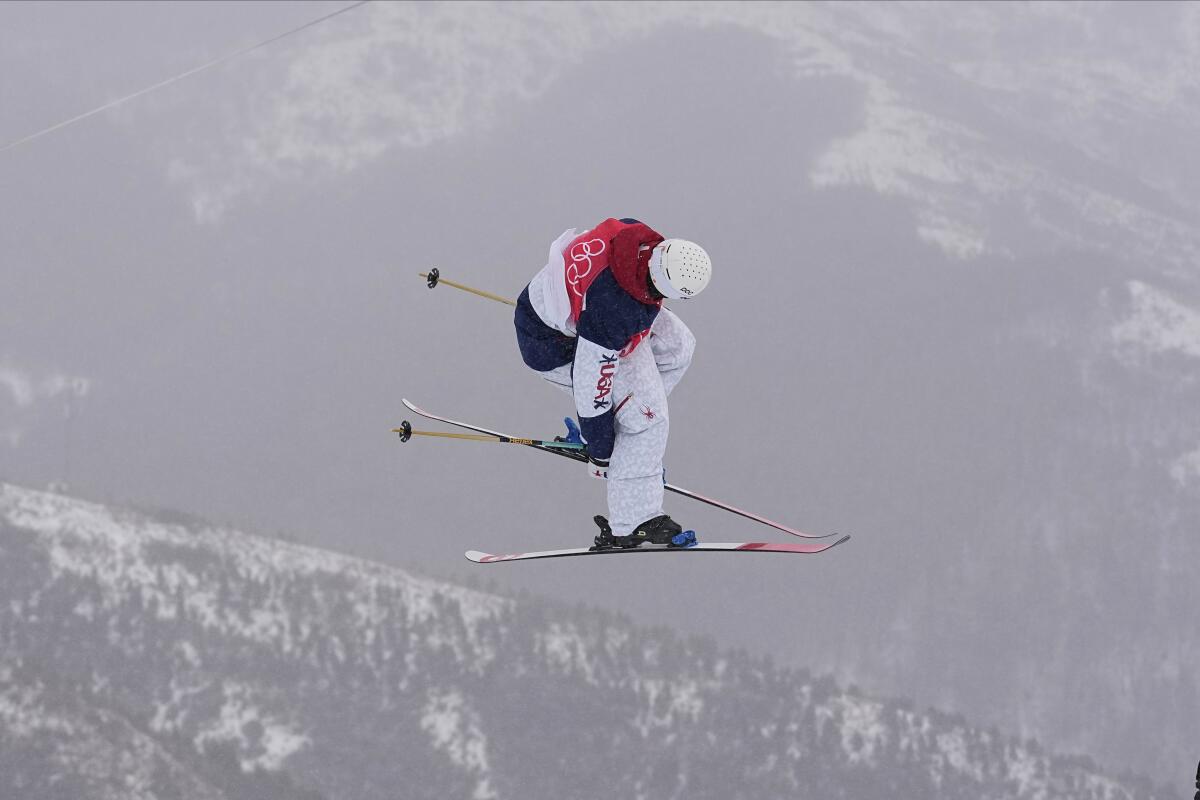
ZHANGJIAKOU, China — The United States has one-third of the field in the men’s freeski halfpipe final after all four American riders qualified during Thursday’s preliminary rounds. After winning gold and silver in Pyeongchang, the U.S. can sweep the podium at Saturday’s 9:30 a.m. final after having three of the top four qualifiers and four of the top seven.
The dominant qualifier performance didn’t come as a surprise to two-time Olympic champion David Wise, who admitted that after the United States went four-for-four in the 2018 Olympic finals, he was expecting similar representation at Genting Snow Park.
“We weren’t going to jinx it but we kind of knew we had it,” said Wise, who qualified in fourth. “In this event above all else, we had a really good chance of getting all four guys into the final.”
Two-time Olympian Aaron Blunck provided some drama after falling on his first run but landed his second to qualify first with 92 points on his second attempt. He was the only American to fall on his first attempt, but when asked about potentially worrying that his teammate wouldn’t make it, Alex Ferreira didn’t seem fazed.
“Unconcerned,” said the 2018 silver medalist who qualified in seventh position.
Since freeski halfpipe made its Olympic debut in 2014, Americans have won three of the six medals, including both golds that went to Wise.
Birk Irving, the only male U.S. halfpipe skier who does not have prior Olympic experience, qualified third behind New Zealand’s Nico Porteous, who took the bronze medal in Pyeongchang.
Gus Kentworthy, who won silver in slopestyle in 2014, returned for his third Olympic Games after switching citizenship to represent Great Britain. The 30-year-old was born in his mother’s home country of England and grew up in Colorado before representing the United States until 2019. But searching for an opportunity to make a final Olympic appearance, Kentworthy opted to use his dual citizenship to honor his mother and find a relatively easier path to Beijing compared to battling it out with the deep pool of American riders.
Kentworthy qualified in 12th, taking the final spot.
- Share via
Canada wins women’s hockey gold
BEIJING — Lifting an already remarkable rivalry to an even higher level of skill and emotion, Canada’s women’s hockey team used its powerful offense to earn a gold medal victory over its U.S. counterpart.
Marie-Philip Poulin cemented her reputation as a clutch player by scoring twice as Canada defeated the U.S. 3-2 on Thursday at Wukesong Arena, ending the Americans’ reign as Olympic champions.
The U.S. and Canada have met in six of the seven Olympic gold medal games played since women’s hockey was added in 1998. Canada has won four of those meetings and also prevailed over Sweden in the 2006 gold medal game. The U.S. won gold in 1998 and 2018.
- Share via
Eileen Gu qualifies first for freeski halfpipe finals
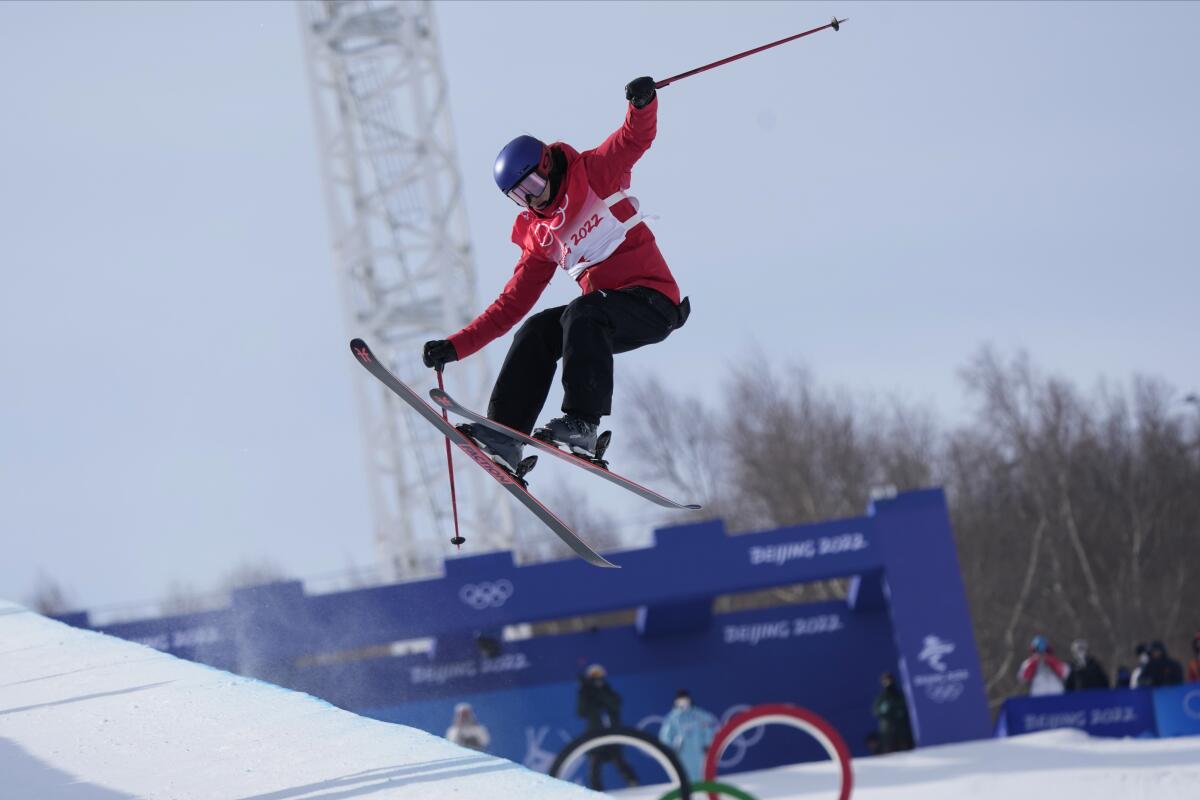
ZHANGJIAKOU, China — Already a gold and silver medalist in big air and slopestyle, respectively, China’s Eileen Gu crushed the competition in her best event by qualifying first in women’s halfpipe at Genting Snow Park on Thursday. The 18-year-old earned more than 90 points on both of her runs, including a high score of 95.50 on her second attempt. The next closest qualifier was Canada’s Rachael Karker, who finished second with 89.50 points.
Gu will try to complete the rare medal trifecta during Friday’s final, which starts at 9:30 a.m., where she can become the first freestyle skier to win medals in three different disciplines at the same Olympics. The San Francisco-born teenager was undefeated in halfpipe World Cup competition this season and won the superpipe competition at X Games in 2021, where she made the podium in all three of her events, a first for an X Games rookie.
Americans Brita Sigourney, Hanna Faulhaber and Carly Margulies qualified in eighth, ninth and 10th, respectively as 2014 slopestyle silver medalist Devin Logan missed the cut by one position.
The 13th-place finish was an unwelcome birthday present for Logan, who said she will still celebrate her 29th birthday Thursday by cheering on her U.S. teammates in the men’s halfpipe qualifying in the afternoon. The early exit is the end of Logan’s Olympic career, she said.
“My body hurts,” Logan said. “I’m all on Aleve and shoulders taped up, but it’s one of those things where it’s kind of what Shaun White is like: You see the next generation pushing and it’s like, ‘OK, I think I left my mark and I think it’s going to be OK.’”
Faulhaber is one of those young skiers pushing the sport forward. The 17-year-old Olympic rookie put down two solid runs despite saying she felt “Olympic jitters.”
Her consistent approach has impressed veterans like Sigourney, a three-time Olympian and 2018 bronze medalist who said she’s only feeling more pressure during these Games after getting on the podium four years ago.
“She’s honestly kind of inspiring me because she’s so relaxed it seems and just having so much fun,” Sigourney said of Faulhaber. “I’m like, ‘Oh, I need to channel that energy because I’m kind of a mess today.’ ... That reminds me definitely of my first Olympics where I was just kind of naïve and there to just soak it all in and had so much fun so I’m really happy for her.”
- Share via
No new coronavirus cases reported for first time at Beijing Olympics
BEIJING — For the first time since the Winter Olympics started, organizers reported no new coronavirus cases.
The milestone Thursday comes after new cases declined significantly in recent days — they have been in the single digits for nine of the last 10 days and there have been only nine combined cases during the last five days.
Organizers have reported 435 positive coronavirus tests since Jan. 23. Two hundred and sixty-three of the positive cases came through arrival tests at Beijing Capital International Airport and the rest have come from daily testing that’s required of every person inside the bubble where the Games, which end Sunday, are being held.
- Share via
Aerial skiing demands big air, big pressure in one-and-done final
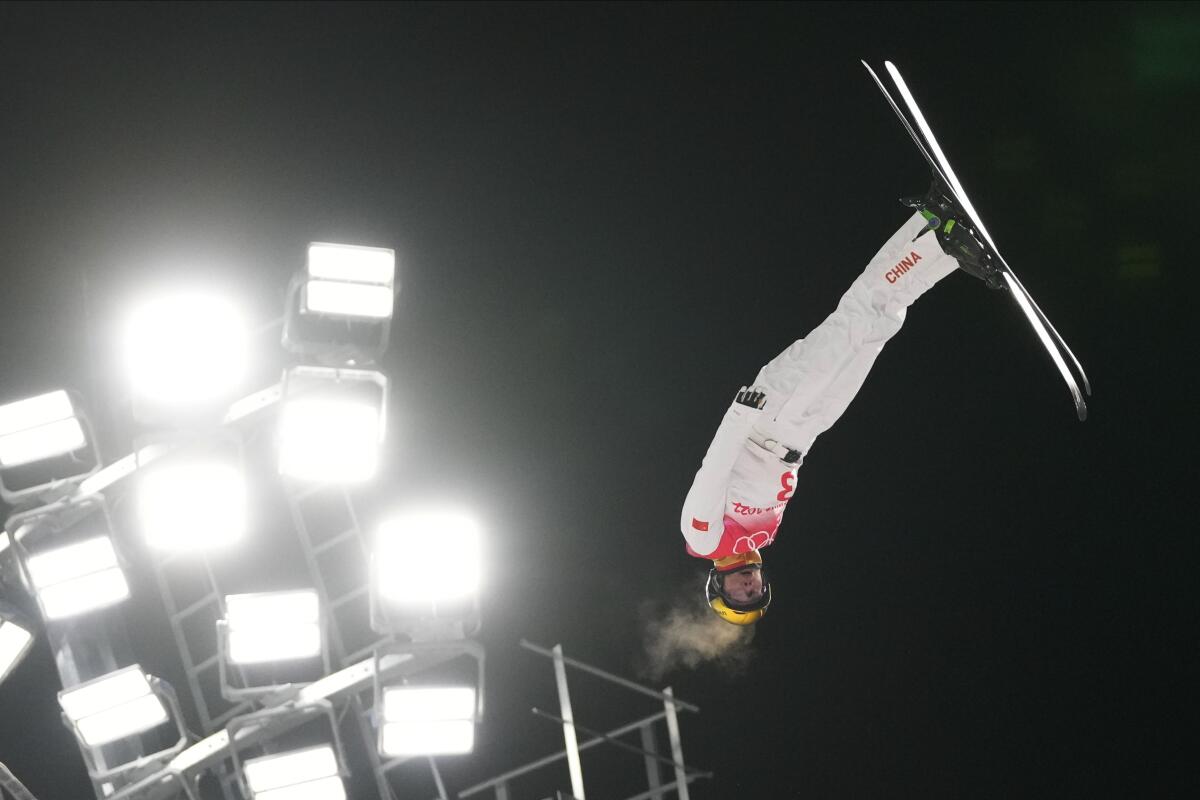
ZHANGJIAKOU, China — On one side of Genting Snow Park, snowboarders won medals after falling more than landing. Freestyle skiers who missed their first runs took solace knowing they had two more tries.
On the aerials course, Chris Lillis didn’t have that cushion.
In a sport that flies arguably higher than any other at the adrenaline-fueled Winter Olympics, aerial skiers also have the smallest margin for error. With no do-overs in the one-jump six-man freestyle skiing aerials super final, Lillis and teammate Justin Schoenefeld finished sixth and fifth, respectively, on Wednesday.
China’s Qi Guangpu won his first Olympic gold by stomping a quintuple-twisting, triple-flipping trick that elicited cheers from the crowd of volunteers and Chinese reporters pulling for the hometown jumper in his fourth Olympics. Qi’s score of 129.00 smashed the competition as defending gold medalist Oleksandr Abramenko of Ukraine took silver with 116.50 points followed by the Russian Olympic Committee’s Ilia Burov, who scored 114.93 points.
Lillis, who took silver at the world championships in 2021, was in podium position after the first 12-man final. After landing a quadruple-twisting, triple-flipping trick during the first final to advance in third place, Lillis upgraded to five twists in the last round, but over-rotated and fell backwards. The 23-year-old called it “devastating” to not finish on the podium, especially when he knew he had the capability, but embraced the sport’s high-stakes format that “sets us apart from other freestyle sports.”
“There’s a lot of pressure and that’s something we just train to execute,” Lillis said. “Every jump, every day. I think the format is great. We like it.”
- Share via
Eileen Gu’s Olympic run launches her into stardom and the political fray
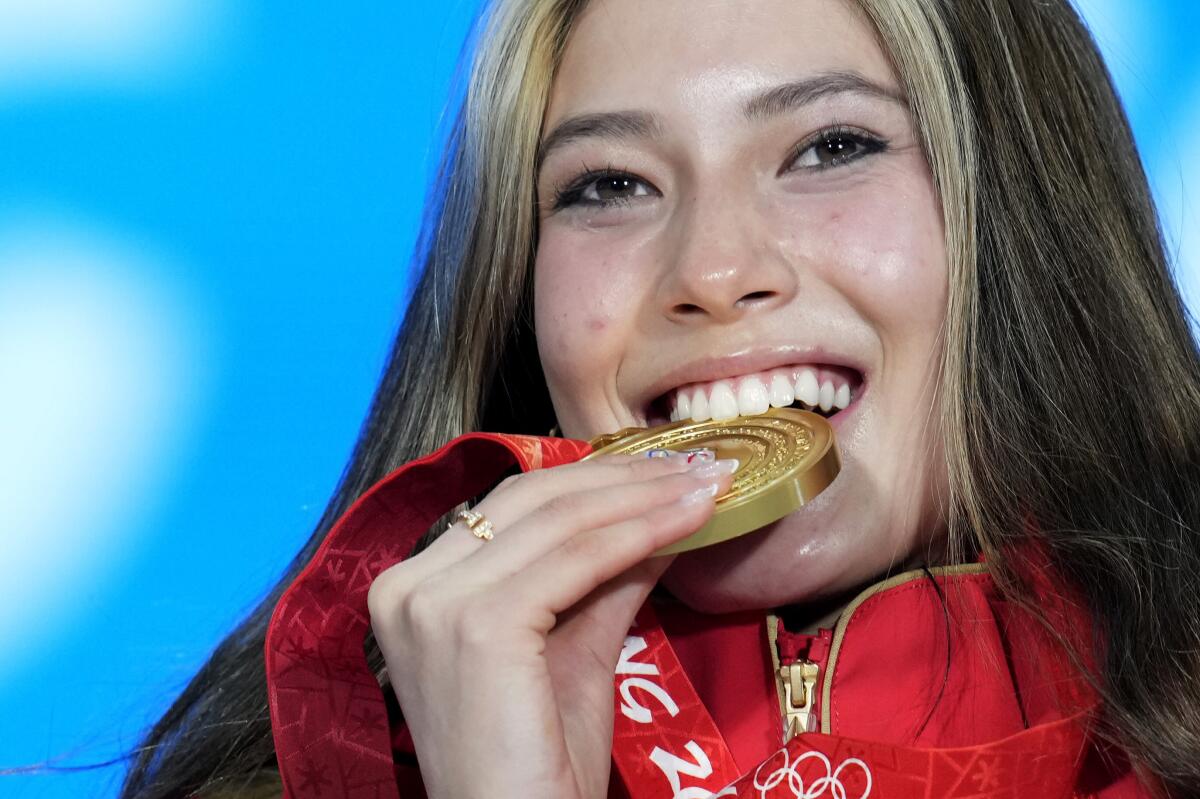
BEIJING — In one Winter Olympics sweep, Eileen Gu has solidified her place as one of the biggest sports stars in the world, not to mention one of the most politically divisive.
The California native has won two medals competing for China and is going for a third in the women’s freestyle skiing halfpipe on Friday, known to be her best event. But Gu’s success comes in tandem with a highly controversial Winter Games and an increasingly strained relationship between China and the U.S., directly challenging her insistence that sports, and her skiing career, are apolitical.
Gu, 18, has posted win after win in international competition ahead of the Olympics. She’s currently one of the most visible athletes in China and beyond, having appeared in fashion magazines and represented Chinese and American brands including Red Bull, Louis Vuitton and JD.com.
In her Olympic debut, Gu vaulted ahead of her competitors in the final run of the women’s freestyle skiing big air with a double 1620, cinching gold with a trick she had never performed in competition or practice. She made another last-minute comeback in her second event, snagging silver in slopestyle and finishing less than a point short of first place.
As her profile has risen, Gu has confronted questions that put her on the spot in the growing U.S.-China divide.
- Share via
Elliott: U.S. men’s hockey team a victim of its own unrealized expectations
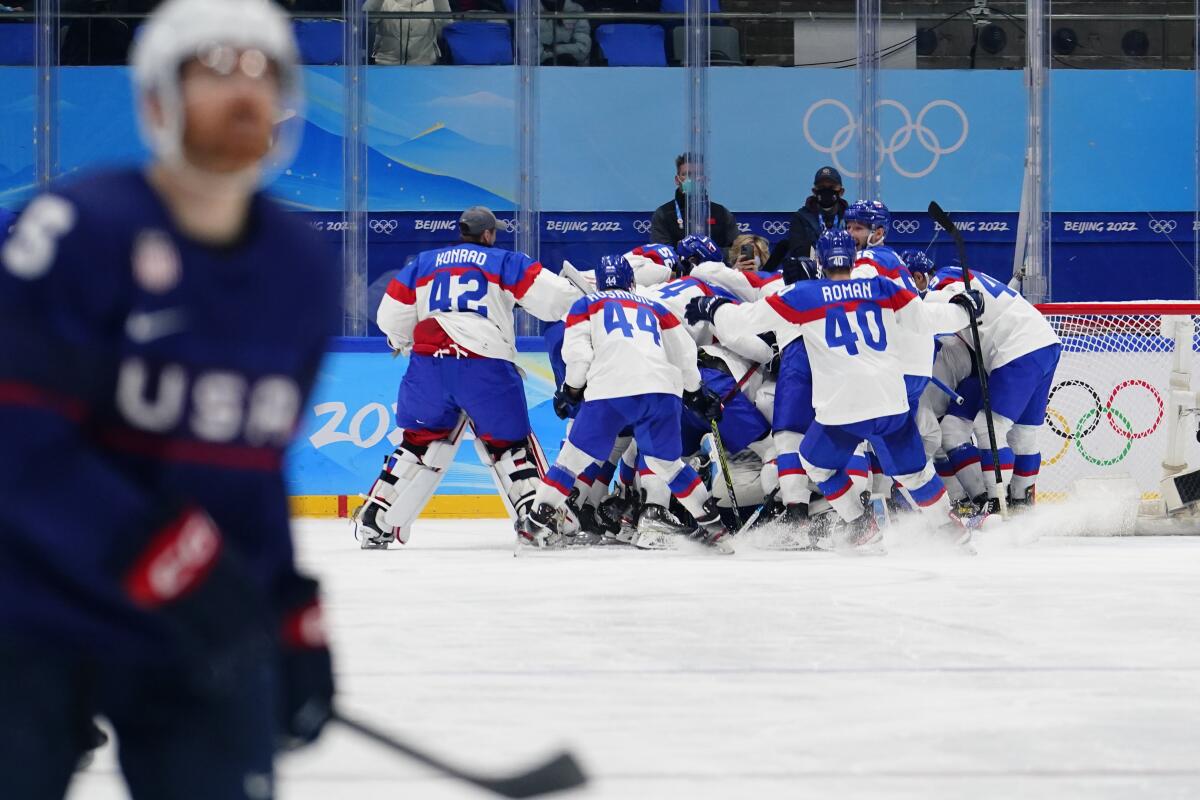
BEIJING —They’d only just begun to explore their potential when their Olympics ended abruptly, leaving members of the top-seeded U.S. men’s hockey team achingly short of what they were sure they could accomplish.
Their stunning 3-2 shootout loss to Slovakia in the tournament quarterfinals didn’t seem real to them as they glided off the ice at National Indoor Stadium on Wednesday. A play made more precisely here, a battle won there, and the youngest U.S. men’s team since 1994 might have been planning for the tournament semifinals.
Slovakia made those plays, won those battles, tied the game late in regulation after pulling their goaltender in favor of an extra skater and got the lone goal in the shootout. After Peter Cehlarik scored in the fourth round and Slovakia goaltender Patrik Rybar stopped an attempt by U.S. captain Andy Miele, the winners poured off the bench to celebrate their minor miracle.
“We had the dream that we are going to go far but we knew it’s going to be tough,” forward Juraj Slafkovsky said. “But now we are in the semifinals and it’s like, dream come true. It’s unbelievable.”
It was equally improbable, in a different way, to the Americans.
- Share via
U.S. women eliminated in curling; men still have a shot
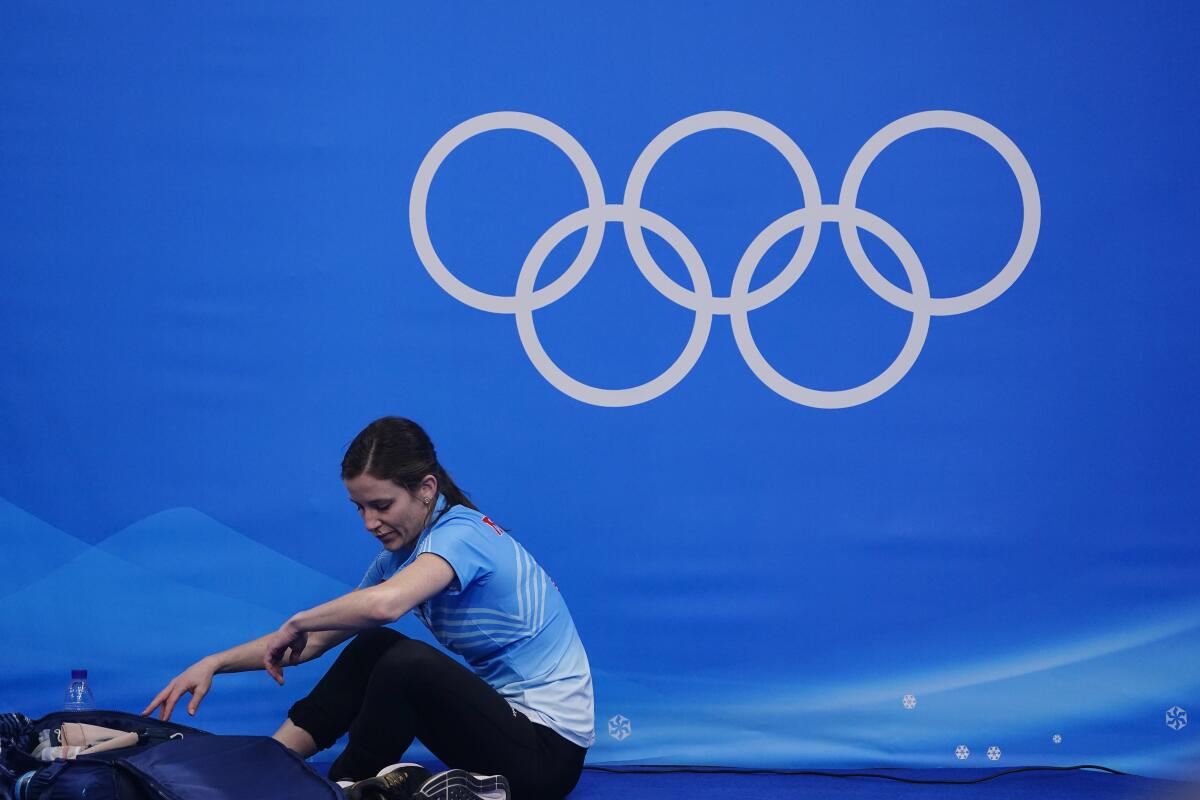
The U.S. women’s curling team is out of the Olympics. The men have one more chance to advance to the playoffs at the Beijing Games.
Tabitha Peterson’s foursome lost 10-7 to Japan on Wednesday night in its round-robin finale. That dropped the Americans to 4-5 at the Winter Games.
Switzerland (7-1) had already qualified, and reigning gold medalist Sweden (6-2) joined them with an 8-5 victory over Russia. There are five teams fighting for the remaining two spots: 2018 bronze medalist Japan (5-3) and ‘18 silver medalist South Korea (4-4) along with Canada (4-4), Britain (4-4) and China (4-5).
The U.S. men will have a chance to repeat as gold medalists — as long as they beat Denmark in the final round-robin session on Thursday morning.
After eight of nine matches played, the Americans are 4-4 and in fourth place in the race for the four spots in the Beijing Olympics semifinals. Britain and Sweden are already in at 7-1, and Canada also clinched a berth with an 8-6 victory over Russia on Wednesday.
John Shuster’s foursome would reach the playoffs with a victory over last-place Denmark. They could also advance if they lose, but they would need help.
- Share via
South Korea’s Choi Minjeong, Canadian men’s relay team win short track gold
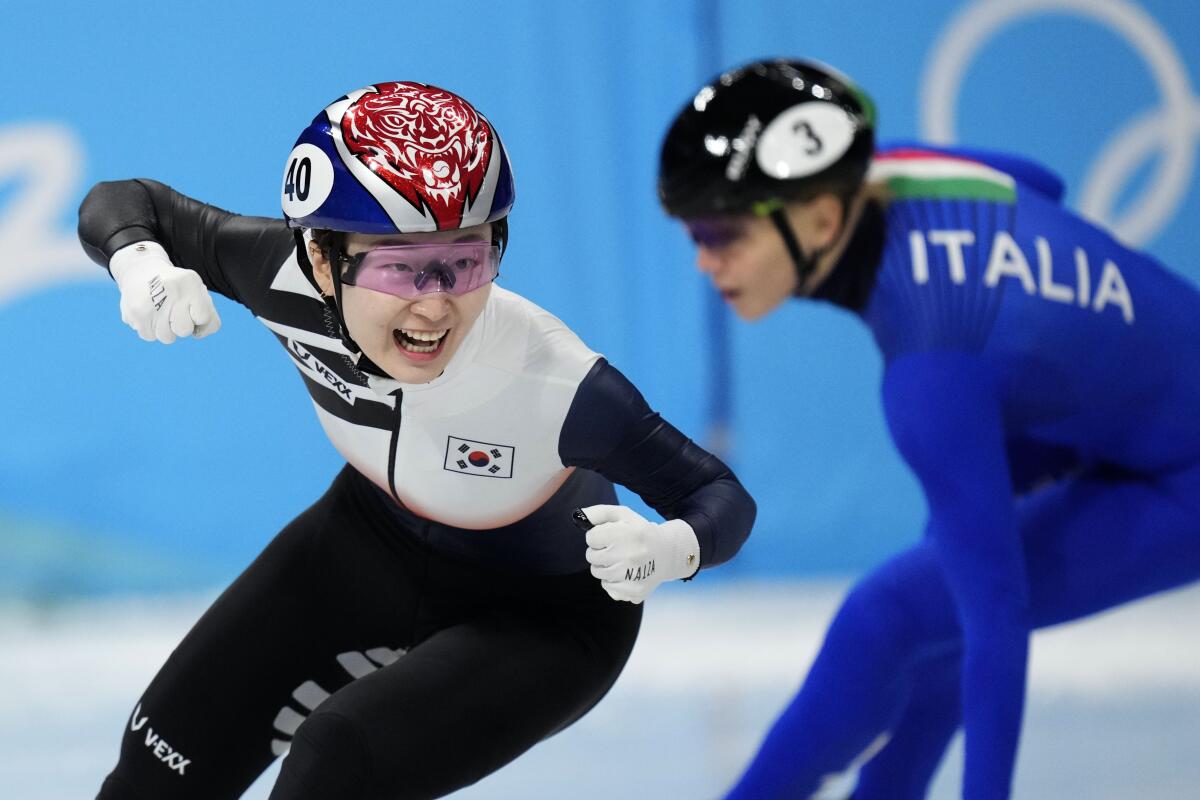
Choi Minjeong of South Korea has successfully defended her Olympic title in 1,500-meter short-track speedskating.
She won in 2 minutes, 17.789 seconds.
Arianna Fontana of Italy took silver by two-thousandths of a second over Suzanne Schulting of the Netherlands.
It was Fontana’s 11th career Olympic medal and third in Beijing. The most decorated short track skater in history also won the 500 and took silver in the mixed team relay.
Schulting earned her fourth medal in Beijing. She finished second in the 500, won the 1,000 and won the 3,000 relay.
Also on Wednesday, Canada won the men’s 5,000-meter relay.
The team of Charles Hamelin, Steven Dubois, Jordan Pierre-Gilles and Pascal Dion skated cleanly Wednesday night to take their nation’s eighth gold medal in the 45-lap race with a time of 6 minutes, 41.257 seconds.
At age 37, Hamelin broke his own record as the oldest male short track skater to win an Olympic medal. It was his sixth career medal, making him Canada’s most decorated male Olympian.
South Korea earned silver. Italy claimed bronze.
Dubois won his third medal in Beijing. He finished second in the 1,500 and third in the 500.
- Share via
Germany wins women’s cross-country team sprint; Norway wins men’s race
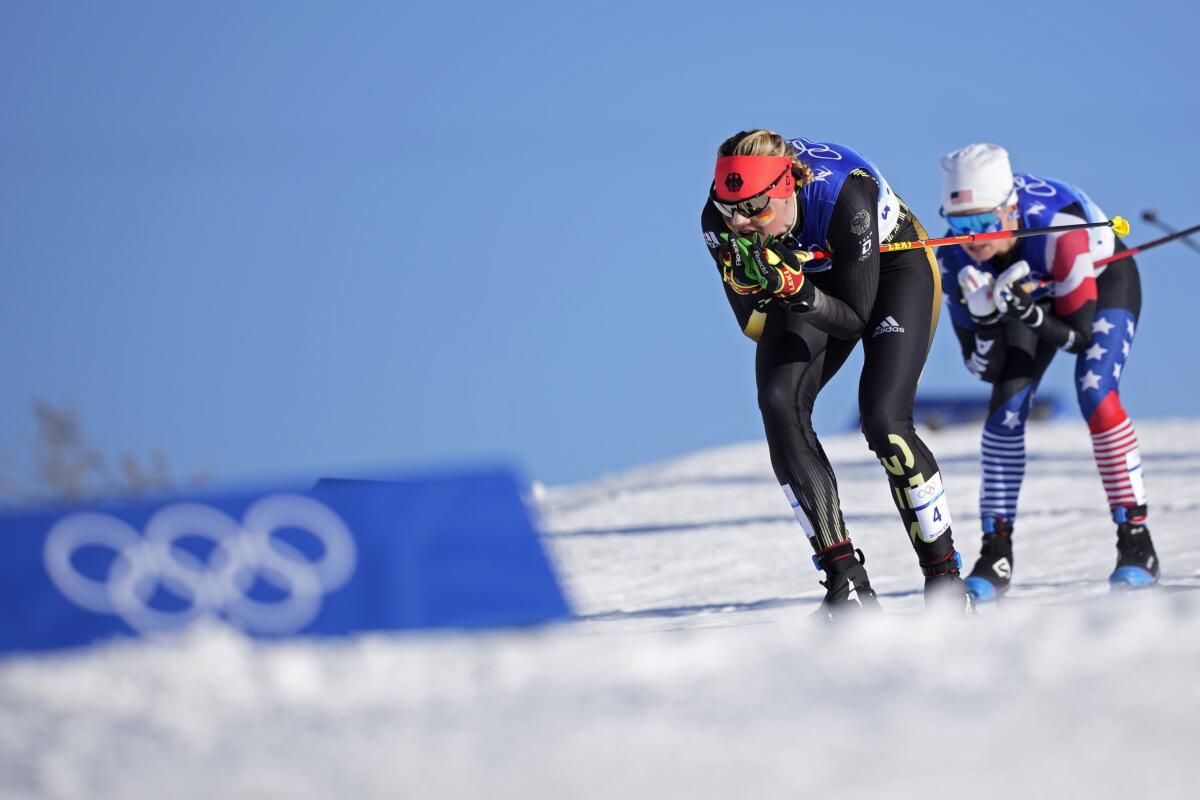
ZHANGJIAKOU, China — Johannes Hoesflot Klaebo completed a second straight cross-country sprint double Wednesday by teaming with Erik Valnes to give Norway the Olympic gold medal at the Beijing Games.
Klaebo is the first man to win both the team and individual sprint at two straight Olympics. Bjorn Lind won both sprint races at the 2006 Turin Games but failed to repeat four years later in Vancouver.
Klaebo and Valnes won Wednesday’s race in 19 minutes, 22.99 seconds.
Joni Maki of Finland stayed ahead of Russian skier Alexander Terentev to take silver, 2.46 seconds behind the Norwegians. The Russians earned bronze, 4.29 seconds behind.
Maki teamed with Iivo Niskanen, who won gold in the 15-kilometer classic race. Terentev’s teammate was Alexander Bolshunov, who won gold in the skiathlon.
The three broke away from a group of eight on the final lap. Sweden finished fourth.
In the women’s race, Victoria Carl outpaced Swedish sprint champion Jonna Sundling to the finish line to give Germany the gold medal.
Carl and teammate Katharina Henning won in 22:09.85. Sundling and Maja Dhalqvist ended up second, only .17 seconds behind.
The Russian team of Natalia Nepryaeva and Yulia Stupak took bronze, .71 seconds behind.
Finland finished fourth, just ahead of the defending champion United States.
- Share via
Clement Noel of France wins men’s slalom
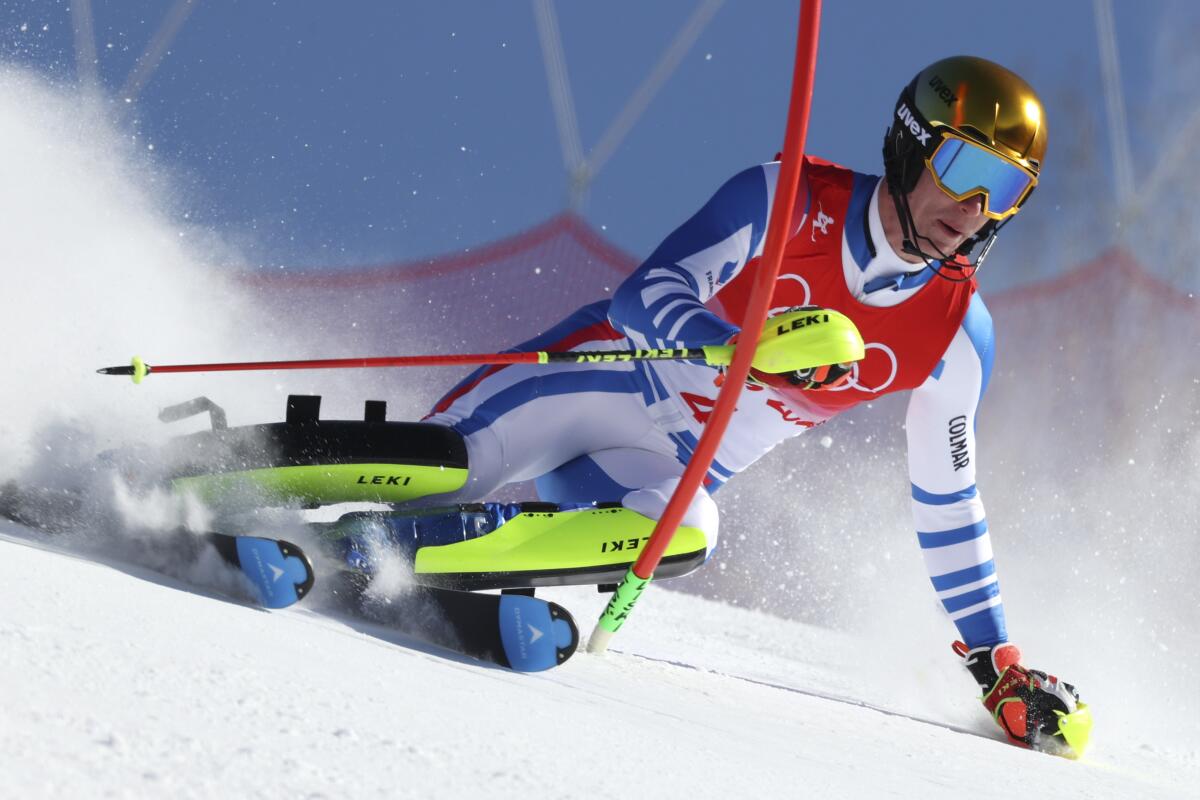
BEIJING — French skier Clement Noel put down a blistering second run to win the slalom at the Beijing Olympics by a large margin on Wednesday.
Noel moved up from sixth following the first leg to beat first-run leader Johannes Strolz of Austria by 0.61 seconds after posting the fastest second run.
World champion Sebastian Foss-Solevaag of Norway held his position and picked up the bronze, finishing 0.70 behind.
Noel finished fourth in the slalom at the 2018 Pyeongchang Games.
Strolz also won the gold medal in the combined last week.
- Share via
U.S. loses to Slovakia in men’s hockey quarterfinals
BEIJING — The top-seeded U.S. men’s hockey team was eliminated in the quarterfinals of the Olympic tournament Wednesday when Peter Cehlarik scored the only goal in a tiebreaking shootout and gave underdog Slovakia a 3-2 victory at National Indoor Stadium.
U.S. goaltender Strauss Mann stopped three shots in the shootout but couldn’t stop Cehlarik’s forehand shot in the fourth round. When Andy Miele couldn’t score, the Slovaks completed the upset.
Slovakia had tied the close and well-played game with 43.7 seconds left in the third period after it pulled its goaltender in favor of an extra skater. Marek Hrivik poked in the rebound of a shot by Michal Cajkovsky to send the game to a 10-minute period of sudden-death play with each team skating three-on-three. Neither could score in overtime, sending the game to a decisive shootout.
Slovakia, coached by former NHL player and coach Craig Ramsay, showed a good amount of skill and solid positional play. But the U.S. team played a smart game and capitalized on its best assets—its speed and youthful resilience.
For the third consecutive game, the U.S. men allowed the first goal of the game.
Slovakia forward Juraj Slafkovsky, 17, who is considered a potential top-10 pick in this year’s NHL draft, gave his team the lead at 11:45 of the first period with his fifth goal of the tournament. The U.S. had been chasing the puck in its own zone and had been losing puck battles when Slovakia defenseman Peter Ceresnak saw Slafkovsky standing alone between the circles. Slafkovsky took Ceresnak’s pass and skated in a few strides before unleashing a shot that got past Mann on the glove side.
The U.S. pulled even on a crisp and well-executed passing sequence with 45.7 seconds left in the first period. Nick Abruzzese of Harvard, a Toronto Maple Leafs draft pick, finished it off, taking a pass from University of Michigan star Matty Beniers and slipping the puck between Patrik Rybar’s leg pads.
The U.S. went ahead 2-1 at 8:56 of the second period, again using its legs in transition and scoring off the rush. This time, Nathan Smith of Minnesota State passed to defenseman Nick Perbix of St. Cloud State, who fed Sam Hentges in front. Hentges, a 2018 Minnesota Wild draft pick, scored from close range.
The U.S. had a five-on-three advantage early in the third period for 1 minute 23 seconds but couldn’t score an insurance goal. But its defense was solid and made the two-goal production hold up until Slovakia pulled Rybar and replaced him with an extra skater and tied the score.
- Share via
Americans Alex Hall, Nick Goepper win gold, silver in slopestyle
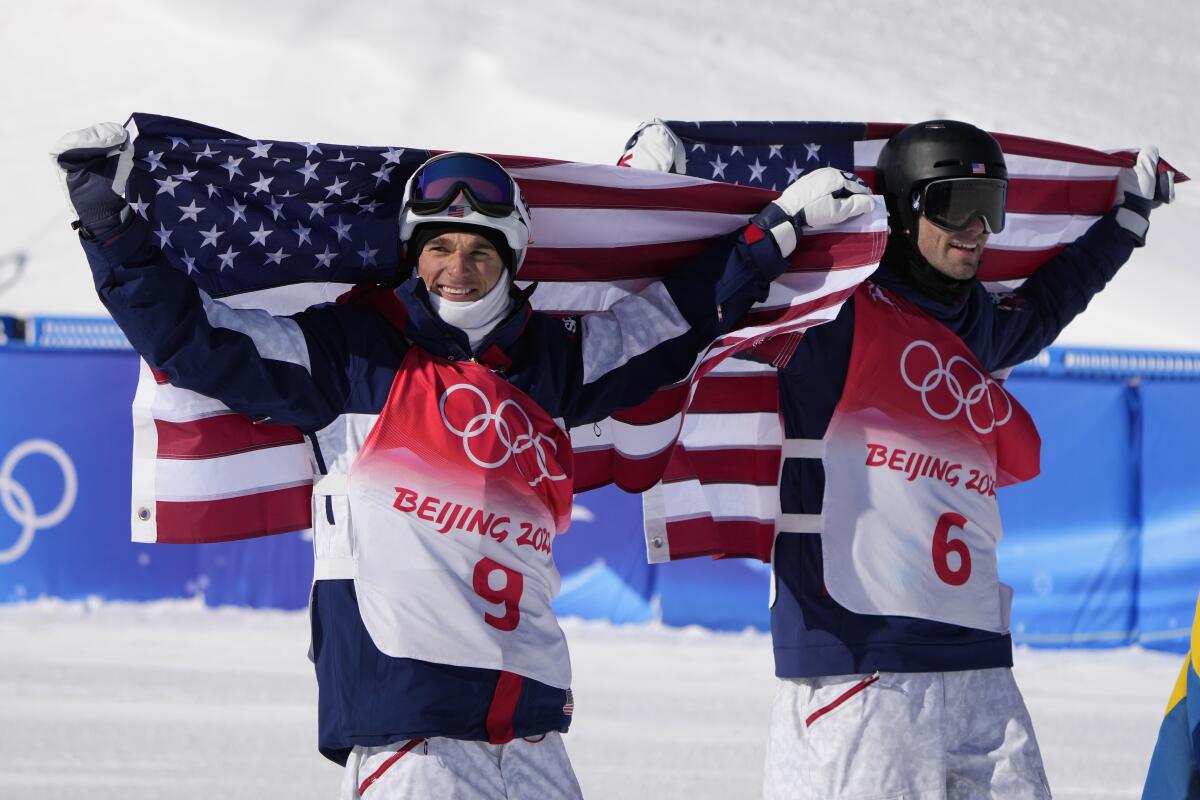
BEIJING — The pristine white snow at Genting Snow Park is more than just Alex Hall’s office for the day. To the two-time Olympic freeskier, it’s a sun-soaked, freezing-cold, blank canvas on which to paint his next picture.
Where elite athletes would generally rely on preset routines long before arriving at an event, slopestyle riders have perfected the art of adaptation. No regulation halfpipes or jump dimensions here. Each course at each contest is new, and when it came to the course at Genting Snow Park, each athlete carved a different work of art.
Wednesday. on the Olympic course’s final day of competition, Hall’s masterpiece came with a gold filter, as he won his first Olympic gold medal with a first-run score of 90.01. Americans went first and second on the podium with Nick Goepper taking his second second consecutive Olympic silver medal.
- Share via
Russian skater Kamila Valieva is in first place after short program
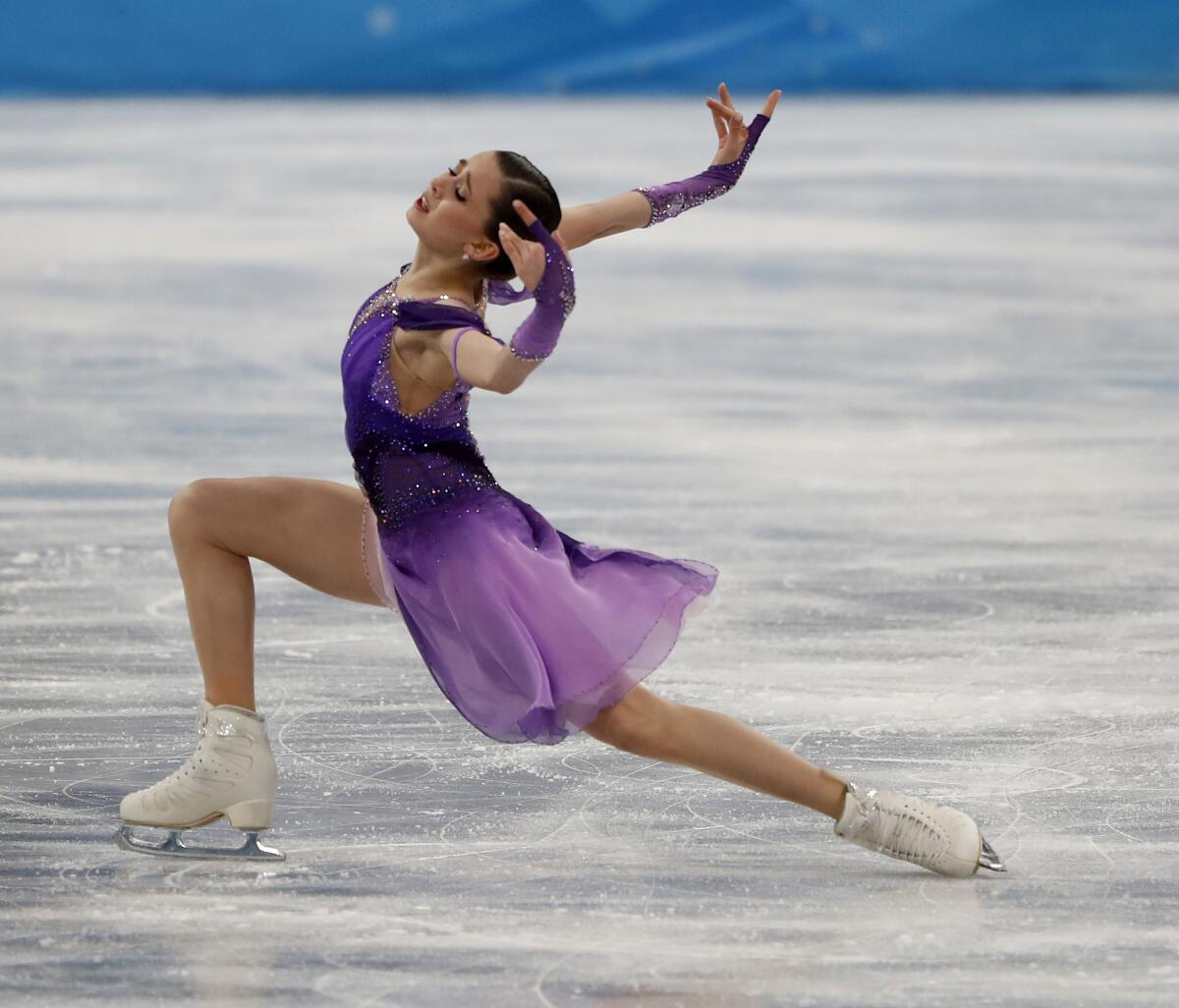
BEIJING — Kamila Valieva skated off the Olympic ice with the lead in the women’s short program and tears in her eyes.
They were not tears of joy.
The enormous pressure and scrutiny on the 15-year-old Russian dynamo, who is at the center of the latest Olympic doping scandal, appeared to finally get to her Tuesday night. Despite an incredible performance by the standards of just about anyone else, Valieva could hardly hold it together while she awaited her scores.
She wound up earning 82.16 points, more than eight off her own world record, but more than enough to top teammates Anna Shcherbakova and Alexandra Trusova as they go for a Russian sweep of the podium.
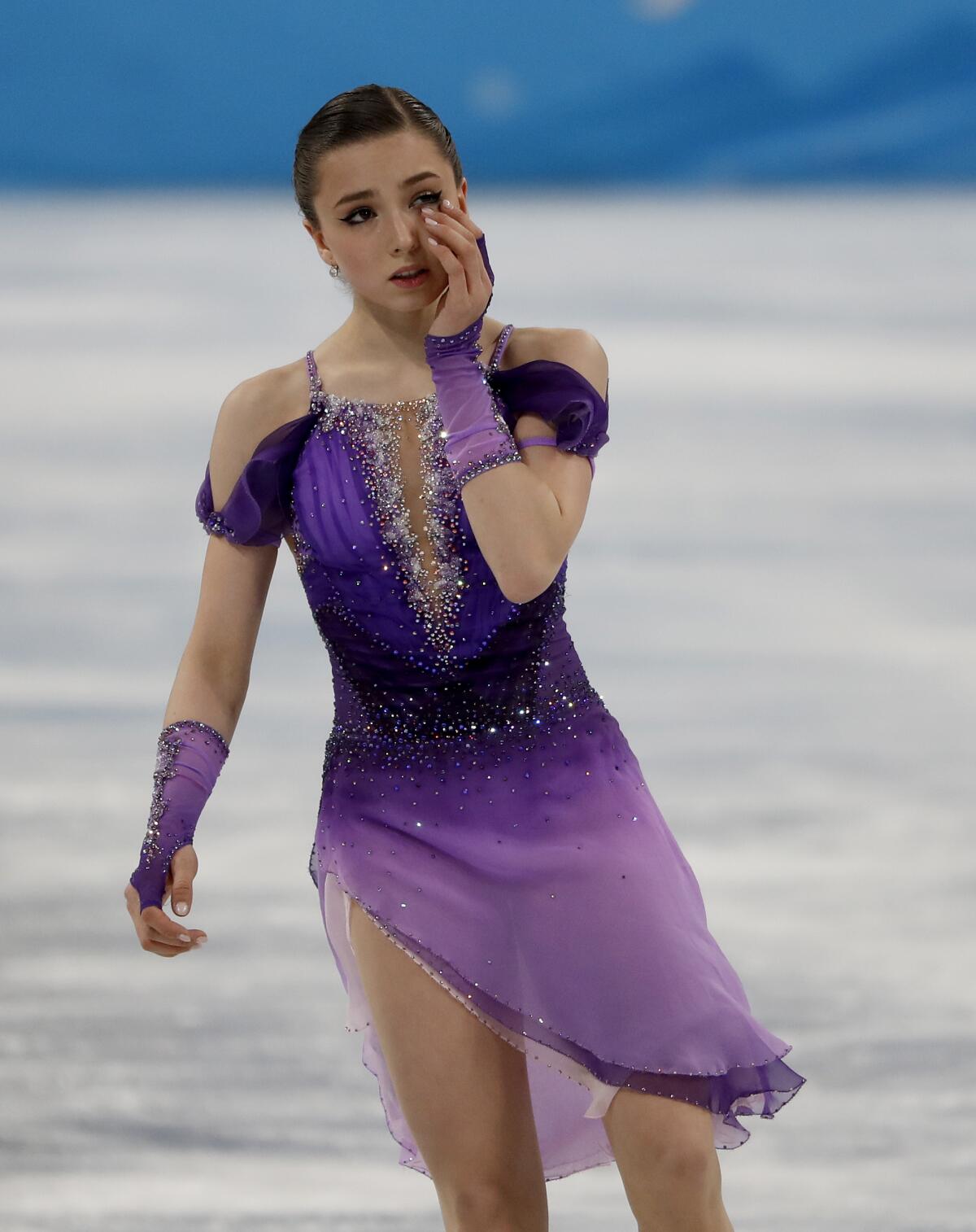
Valieva did not speak afterward, walking through the mix zone of reporters in stoic silence. The Russian Olympic Committee also declined to bring her to the news conference, which is required only for medal rounds, and when asked about the scandal, Shcherbakova said: “I will not say anything about this situation.”
“Whether it is fair, I am not quite sure,” said Japan’s Kaori Sakamoto, who sits in third place. “I would like to refrain from answering that question. Right now I would just like to focus on my own performance.”
Shcherbakova, the reigning world champion, was second with 80.60 points after a clean program. Sakamoto’s score of 79.89 points broke up the “Quad Squad” with Trusova, who fell on her opening triple axel, in fourth with 74.60.
“I think that everything was like always, like every competition,” Shcherbakova said. “I didn’t feel anything different from other competitions, and it was really controlled [and] focused.”
The trio of Russian women, all coached by the embattled Eteri Tutberidze, are trying to deliver the second podium sweep in Olympic figure skating and the first in the women’s competition. The free skate is Thursday night.
— Dave Skretta
- Share via
Weather adds an air of dangerous unpredictability to skiing
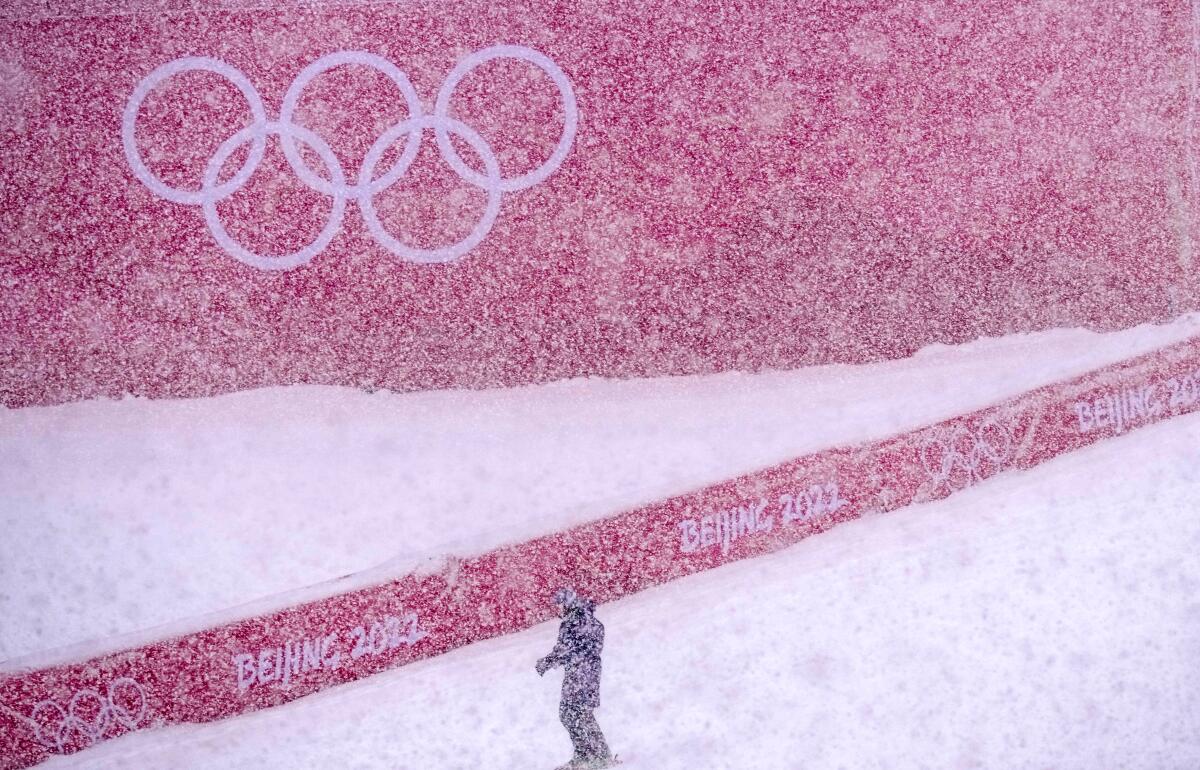
BEIJING — A small army of workers fought the snow with brooms, flat-edged shovels and leaf blowers in a cacophony of scraping and high-pitched whirring that drowned out the public-address announcer’s shouts for each skier fortunate enough to cross the finish line at the Yanqing National Alpine Centre.
The popular Winter Olympics mascot, Bing Dwen Dwen, waddled aimlessly through the empty grandstands as snow accumulated around the panda’s saucerlike eyes. Staffers built snowmen wearing KN-95 masks, others fashioned snowballs or stared at the final stretch of the steep Ice River course that seemed to vanish into an impenetrable bank of fog and snowflakes.
The men who staggered away from the finish after the first run of the giant slalom Sunday morning had never experienced anything like it.
“The first run was far from responsible in my opinion,” Austria’s Manuel Feller said.
Norway’s Henrik Kristoffersen summed up the problem in a language that crossed international boundaries: “I didn’t see s—.”
Racing down the side of a mountain at speeds that can approach 90 mph is challenging enough, but Alpine skiers must also contend with ever-changing weather. An ill-timed gust of wind, the sun breaking through clouds — or vanishing behind them — can transform a course from one minute to the next.
- Share via
Germany makes history, taking top three spots in two-man bobsled
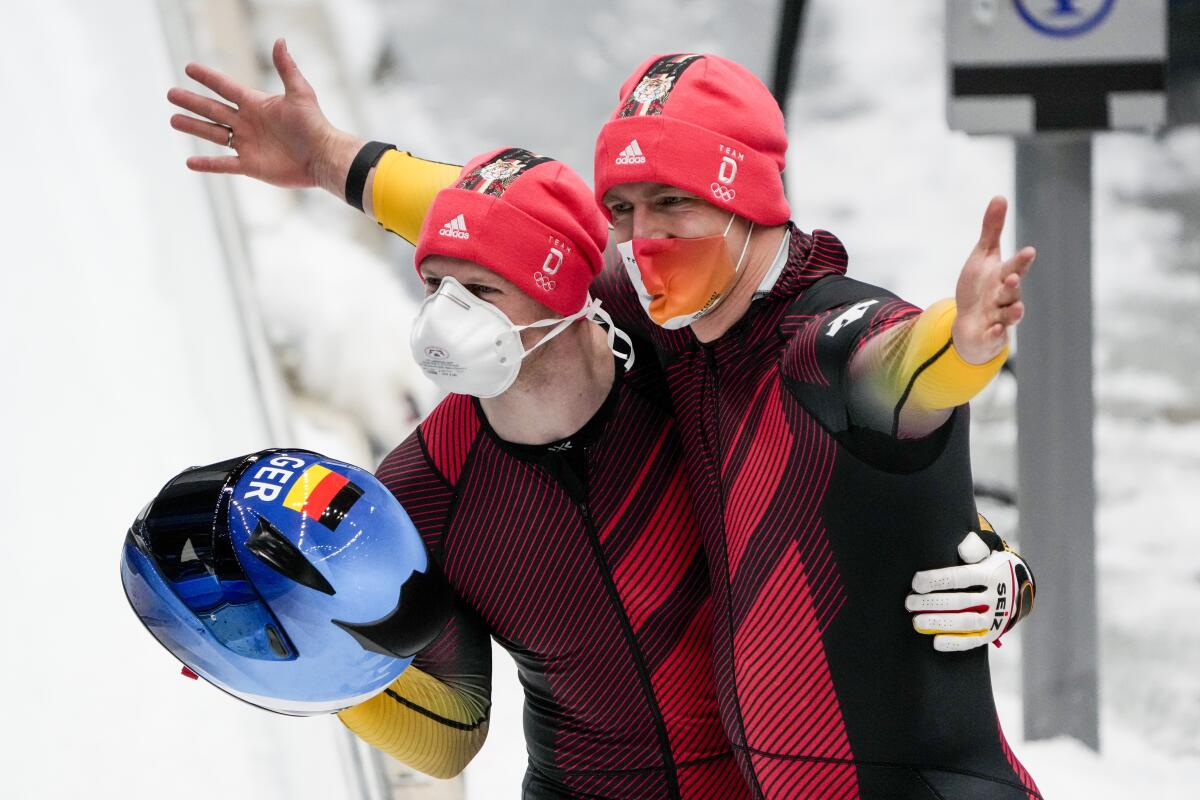
BEIJING — Germany became the first nation to sweep the medals in an Olympic bobsled race on Tuesday, grabbing gold, silver and bronze in the two-man event at the Beijing Games.
Francesco Friedrich is now a three-time Olympic gold medalist, teaming with Thorsten Margis to prevail in 3 minutes, 56.89 seconds. Johannes Lochner and Florian Bauer were second in 3:57.38, and Christoph Hafer and Matthias Sommer held on to finish third in 3:58.58.
Germany now has seven gold medals in sliding at the Beijing Games, more golds than any nation has ever grabbed from the bobsled, skeleton and luge events at any Olympics. The Germans also have 12 medals in sliding events so far in Beijing — technically, another record for any nation participating in sledding sports. East Germany and West Germany combined for 12 medals at the 1976 Innsbruck Games.
Switzerland was fourth, the team of Michael Vogt and Sandro Michel finishing in 3:58.83. Benjamin Maier and Markus Sammer were fifth for Austria in 3:59.12. And Monaco grabbed sixth, its best finish ever in an Olympic sporting event, with Rudy Rinaldi and Boris Vain completing their four runs in 3:59.14.
But this night, totally and completely, belonged to Germany.
Just like almost everything else has so far at the Yanqing Sliding Center.
Germany won gold in all four luge events, then won gold in both skeleton events. The only time that “Das Deutschlandlied” hasn’t been the national anthem playing when the flags celebrating a new Olympic champion are raised over the track was Monday, when Kaillie Humphries won gold for the United States in the monobob competition.
There are two sliding events left in the Beijing Olympics — the women’s race that ends Saturday, and the four-man event that ends Sunday. Friedrich is the far-and-away favorite to win gold in the four-man race, defending champion Mariama Jamanka was the fastest in Day 1 of official women’s training on Tuesday, and that all means Germany’s medal haul from the Olympic track probably isn’t complete.
Olympic rookie Frank DelDuca and brakeman Hakeem Abdul-Saboor were the top U.S. sled, finishing 13th.
— Tim Reynolds
- Share via
Joergen Graabak of Norway wins gold in Nordic combined large hill
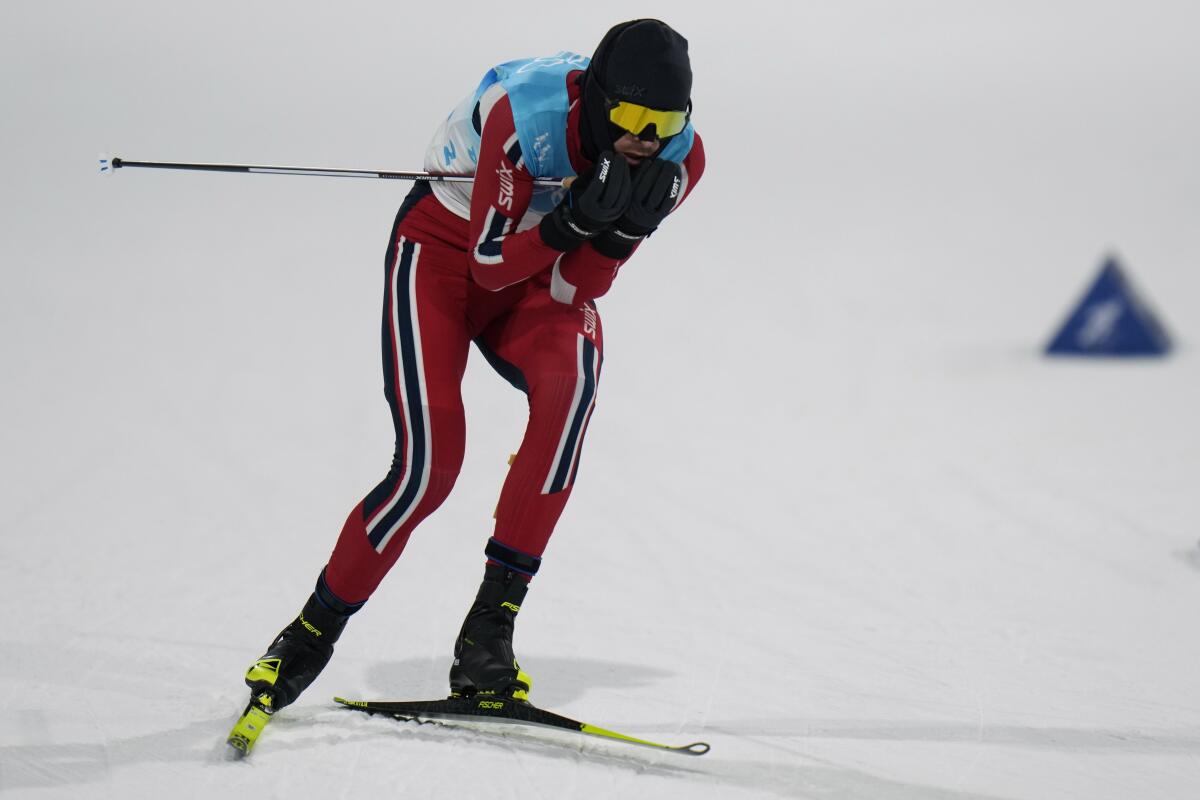
ZHANGJIAKOU, China — Norwegian favorite Jarl Magnus Riiber took a wrong turn early in the 10K cross-country race at the Olympics, a little more than 24 hours after coming out of isolation, and two teammates took advantage.
“Maybe it’s not my Olympics,“ Riiber said.
Joergen Graabak of Norway made the most of the opportunity, winning gold in Nordic combined Tuesday.
Graabak rallied from a deficit of 2 minutes, 7 seconds behind Riiber at the start of the cross-country race to finish first after placing 12th in ski jumping.
“It’s what dreams are made of,“ Graabak said. “It’s unreal, to be honest. I can’t quite believe it.“
Graabak became the first two-time Nordic combined Olympic champion on the large hill after winning the event in 2014.
Norwegian teammate Jens Luraas Oftebro won silver, finishing four-tenths of a second behind. Akito Watabe of Japan earned bronze.
Riiber made a relatively surprising start, and a strong one, only one day after coming out of isolation that lasted longer than 10 days because he tested positive for COVID-19. He jumped 466 feet and had 139.8 points in the first phase of the competition. The impressive jump gave him a 44-second lead in the cross-country race.
The three-time world champion built a lead of one minute before making a wrong turn a few minutes into the race, which cut his cushion to fewer than 10 seconds at the 2.5K mark.
Riiber wasn’t as familiar with the course as his competitors after being in isolation for so long. The Norwegian faded late in the race and finished eighth.
“It was more of a physical problem,“ said Riiber, who said he had bad symptoms for a couple days. “When I’m in normal shape, the mental part is normally there. I was not able to ski normal. I was feeling quite bad.
“I had been locked inside for two weeks, not breathing fresh air. My body is not working. Normally, I’m one of the better skiers and today I was just bad.“
The field had to compete in brutal conditions, with temperatures dipping to minus 2 degrees Fahrenheit with wind that made it feel even colder at a challenging elevation of 5,462 feet on a course with steep inclines.
Top-ranked Johannes Lamparter of Austria had a slim lead at the 7.5K mark, but ended up in sixth.
- Share via
Mikaela Shiffrin has yet to medal at Winter Olympics but remains upbeat
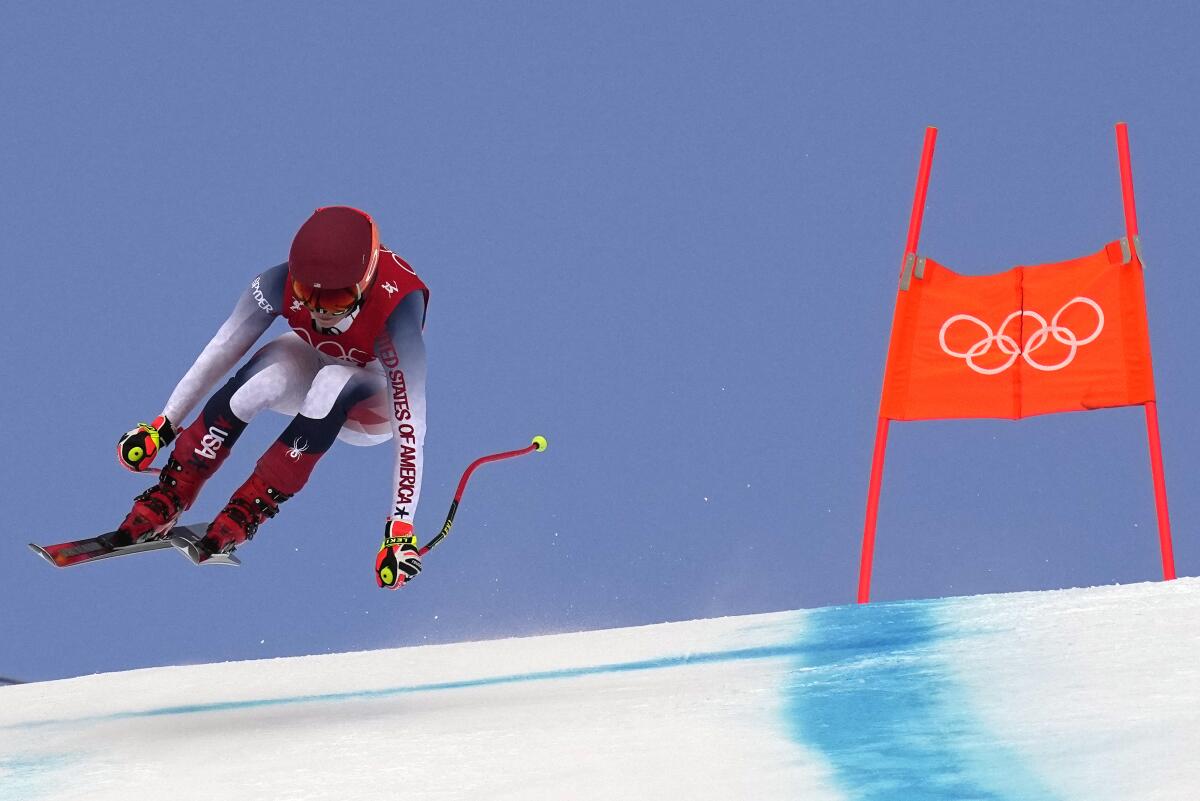
BEIJING — The 1.7-mile downhill course plunges through barren brown hillsides, past haggard trees and towering gray rock faces, all transformed by a coating of snow from a storm that passed through a few days earlier.
As Mikaela Shiffrin raced through the wintry showcase at the Yanqing National Alpine Centre on Tuesday, she seemed to have been transformed too.
The world’s top female skier didn’t win the downhill or even come close.
But after an inexplicable start to the Winter Olympics left her searching for an explanation and struggling to know the path forward, the downhill run without any expectations left her smiling and relaxed after crossing the finish line.
- Share via
What you need to know about the Kamila Valieva situation
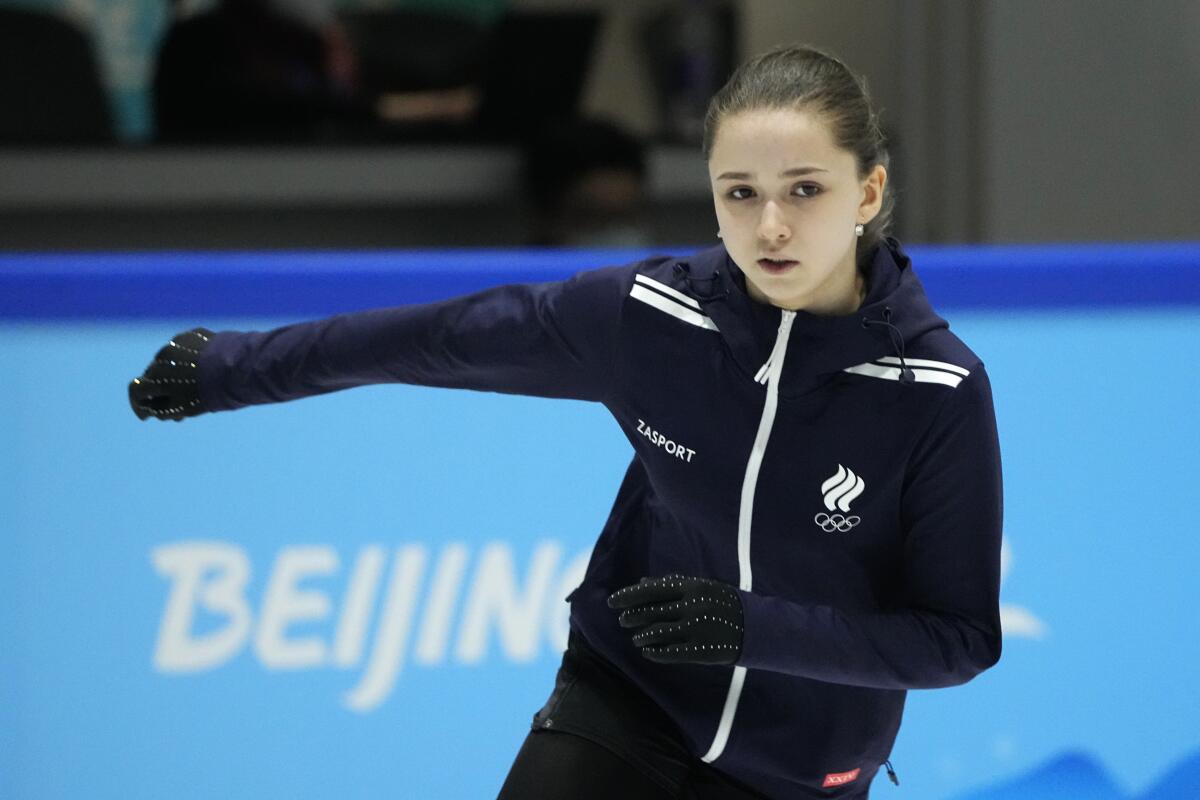
ZHANGJIAKOU, China — A delayed medal ceremony was only the beginning.
When the team figure skating medal ceremony was canceled without explanation last Tuesday, it opened a door into a controversial legal case involving Russian figure skating star Kamila Valieva.
The 15-year-old made Olympic history as the first woman to land a quad jump and helped athletes from the Russian Olympic Committee win the team figure skating gold medal, but the achievement has been marred by a failed pre-Winter Olympics drug test.
Despite evidence that Valieva tested positive for a banned substance Dec. 25, the teenage sensation still will be allowed to skate in the women’s competition, which begins Tuesday with the short program at Capital Indoor Stadium.
Here’s what to know about the situation:
- Share via
Norway wins men’s team pursuit speedskating; Canada wins women’s gold
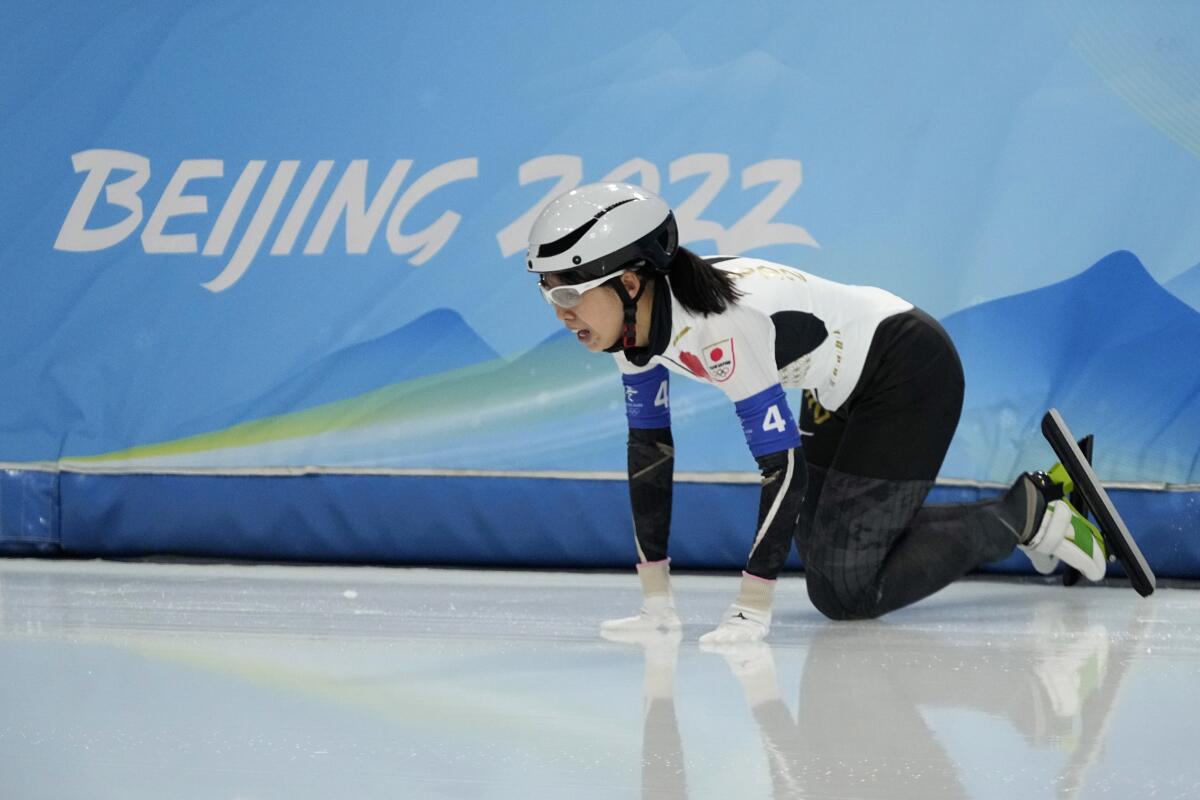
BEIJING — Norway won its second straight Olympic gold medal in men’s team pursuit speedskating, and the Japanese women were headed for another gold as well Tuesday — until one of their skaters crashed on the final turn.
The stunning fall by Nana Takagi, who was at the back of a three-skater train and appeared to simply lose her balance, handed the women’s team pursuit gold to Canada.
The United States won its second speedskating medal of the Beijing Games, claiming the men’s bronze medal and denying Dutch star Sven Kramer a 10th career medal in what is likely his final Olympics.
Norway repeated its run to the gold medal from four years ago, knocking off the Netherlands in the semifinals and the Russian skaters in the final with a time of 3 minutes, 38.07 seconds.
The Russian skaters finished nearly 2½ seconds behind and settled for the silver.
The United States, using a unique strategy in which 36-year-old Joey Mantia leads the three-skater unit for the entire eight-lap race, easily defeated the Dutch in the bronze-medal race with a time of 3:38.80, almost 3 seconds ahead.
Mantia, a former inline champion, claimed the first Olympic medal of his career and gave Ocala, Fla., its second speedskating medalist of the Beijing Games. Erin Jackson won gold in the women’s 500 meters.
Also receiving medals for the Americans were Casey Dawson and Emery Lehman, who skated in the final, and Ethan Cepuran, who took part in the semifinals while Mantia rested.
The U.S. missed out on a chance to go for the gold when the Russian skaters won the second semifinal by just 0.43.
There was even more drama on the women’s side.
In the gold-medal race, Japan led Canada by 0.32 seconds with a half-lap to go, seemingly headed for another Olympic title.
But Takagi lost her balance and skidded into the padding on the outside of the track. Because the final time isn’t recorded until all three skaters cross the line, Canada coasted to a surprising victory.
Takagi finally crossed more than 11 seconds behind the Canadians, breaking down in tears as she was consoled by Japan’s other two skaters — her sister, Miho, and Ayano Sato.
The bronze went to the Netherlands, which beat the Russian skaters with a trio that included individual gold medalists Ireen Wust and Irene Schouten.
- Share via
Norway wins men’s biathlon four-man relay
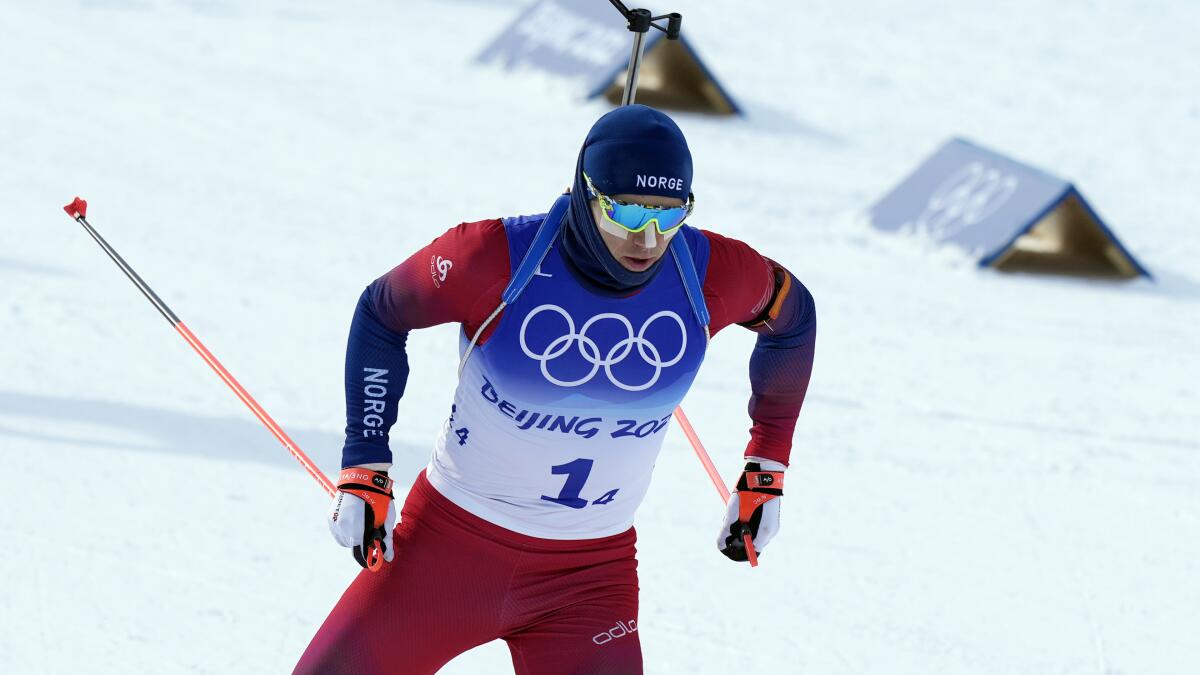
ZHANGJIAKOU, China — Clean shooting cleared the way for the Boe brothers to win another Olympic gold medal for Norway in biathlon on Tuesday.
Vetle Sjaastad Christiansen skied the final leg of the four-man relay and hit all five targets at the last range before crossing first. Russian biathlete Eduard Latypov, who had been leading the race on the last leg, struggled at that final shooting stop. He used all three of his spare bullets and still needed to complete a penalty lap.
The Norwegians won the race won in 1 hour, 19 minutes, 50.2 seconds, giving Johannes Thingnes Boe his third gold medal and fourth overall at the Beijing Games. Tarjei Boe won his second gold to go along with a silver and a bronze.
Strula Holm Laegreid skied the first leg for Norway.
The Russian team’s collapse allowed France to win silver, 27.4 seconds behind Norway. The Russians took bronze, 45.3 seconds behind, after leading for almost all of the race.
Quentin Fillon Maillet skied the last leg for France and also missed a target in the final shooting range, but he was able to complete his set with a spare bullet.
The silver was Fillon Maillet’s fifth medal of the Beijing Olympics. He had already won two gold and two silver.
The relay race had been scheduled to start at 5 p.m. but was moved up 2½ hours because of frigid temperatures at the stadium. The cold was expected to drop to minus 20 degrees C (minus 4 degrees F) by 6 p.m., making it dangerous for the athletes to compete.
- Share via
U.S. to face Slovakia in men’s hockey
BEIJING — The U.S. men’s hockey team, which earned a bye into the quarterfinals of the Beijing Olympic tournament by winning its three preliminary-round games in regulation, will face Slovakia in its first knockout game.
Slovakia defeated Germany 4-0 in a classification game on Tuesday to set up the matchup against the U.S. on Wednesday at National Indoor Stadium. Germany won a silver medal four years ago at Pyeongchang but couldn’t replicate that success.
Slovakia lost its first two preliminary-round games, to Finland and Sweden, before beating Latvia and then shutting out Germany in the qualification playoff. Slovakia is coached by Craig Ramsay, a former NHL player who went on to coach the Buffalo Sabres, Philadelphia Flyers, and Atlanta Thrashers.
Ramsay said he has been impressed by the U.S. team. “They have so much speed and quickness and I think it will be important for us to have good sticks, sticks on pucks, win the battles when we have to,” he said. “If we can continue to play with that kind of speed and aggressiveness, I think teams will have to chase us.
“You certainly do not want to get in a battle where you are chasing them around the ice because they are too quick.”
Forward Marko Dano, a first-round pick by Columbus in the 2013 NHL draft, is optimistic about Slovakia’s chances. “Hopefully [on Wednesday] we can surprise one of the top teams and advance to the next round,” he said. “They have a young team as well, so it will be a physical game.”
- Share via
U.S. men shut out of invidual snowboard medals for first time in Olympic history
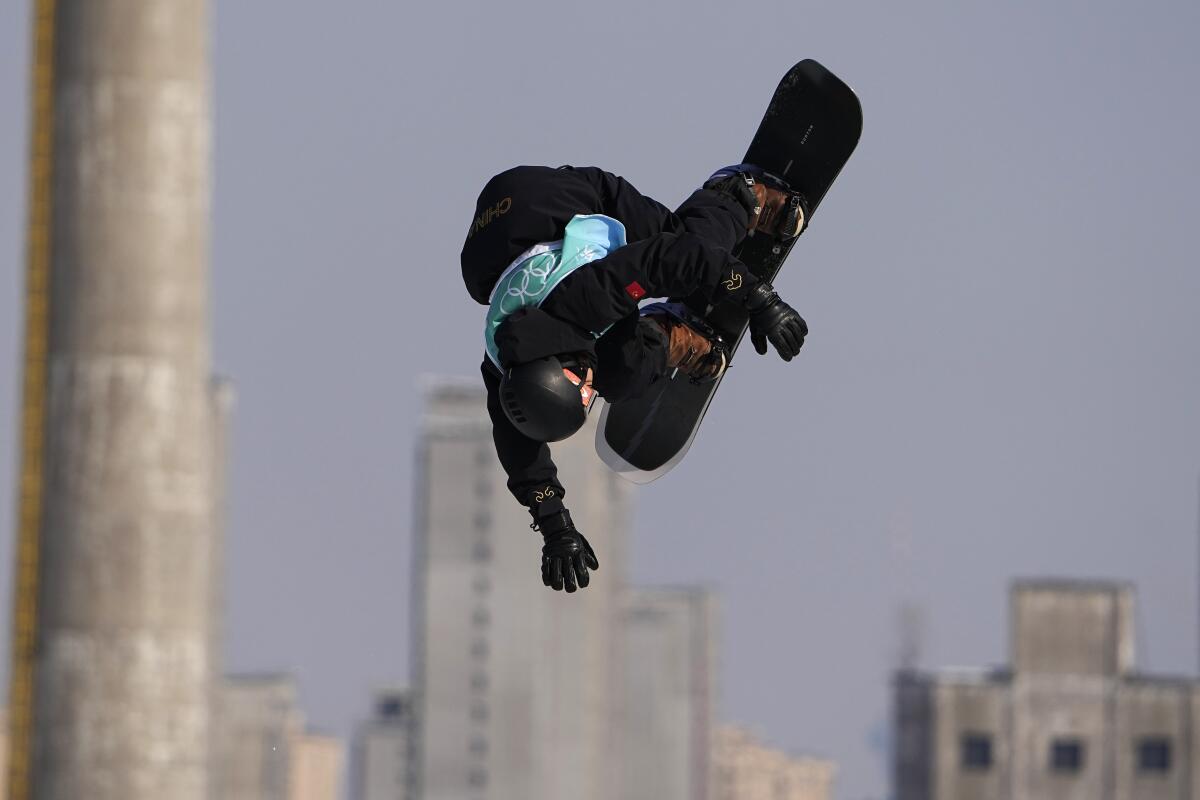
ZHANGJIAKOU, China — For the first time since snowboarding debuted in the Olympics in 1998, no American man will take home an individual Olympic medal.
The U.S. medal bust in Beijing was confirmed Wednesday at snowboard big air, where Red Gerard was the top American finisher at fifth place.
China’s Su Yiming continued his thrilling Olympic debut as the 17-year-old former child actor added big air gold to his silver medal in slopestyle last week. Su was already the first Chinese man to win an Olympic snowboarding medal and is now the country’s first snowboard gold medalist.
Competing in front of his home crowd, Su landed a frontside 1800 and a backside triple cork 1800. The teenager’s rapid rise to the top of the sport has stunned veterans like Canada’s Mark McMorris, who said after winning bronze in slopestyle that a young Su was a frequent attendee at McMorris’ snowboarding events in China.
When the IOC selected Beijing as the host city for the 2022 Games, Su was 10. He chose to pursue snowboarding with the hope that he could compete in the Olympics in his home country.
“I wanted to try my best for this,” he told reporters. “The most important thing though is all about love. Snowboarding is not just about competition. You see here every rider from a different country, we’re all doing the same thing — we love snowboarding.”
Norway’s Mons Roisland and slopestyle gold medalist Max Parrot of Canada rounded out the podium.
Gerard said he was pleased with his fifth-place big air finish, especially considering competitors were throwing much more difficult tricks than the 21-year-old slopestyle star whose biggest twist was a 1620.
Chris Corning was one of the riders pushing the limits. He was the only rider to land a backside quadruple cork 1800 (four flips and five full rotations) and earned a massive 92-point score on his first run. But in the competition that calculates a rider’s top two scores in three runs, Corning couldn’t muster a second strong trick. His second-best score was only 64 points on a frontside 1440.
American men had won at least one medal in a snowboarding event since halfpipe joined the Olympic program in 1998.
This year, the United States had two male snowboarders finish fourth with Gerard in slopestyle and Shaun White in halfpipe. Gerard, the 2018 slopestyle gold medalist, said he was “pretty bummed” that he missed the podium in his signature event.
Cody Winters and Roberts Burns only survived two runs in snowboard parallel giant slalom while Jake Vedder had the best individual finish from an American man in snowboard cross by advancing to the semifinals.
Nick Baumgartner is the only U.S. man leaving Beijing with a snowboarding medal after he teamed up with Lindsey Jacobellis to take gold in mixed snowboard cross.
- Share via
Three Americans advance to freeski slopestyle finals
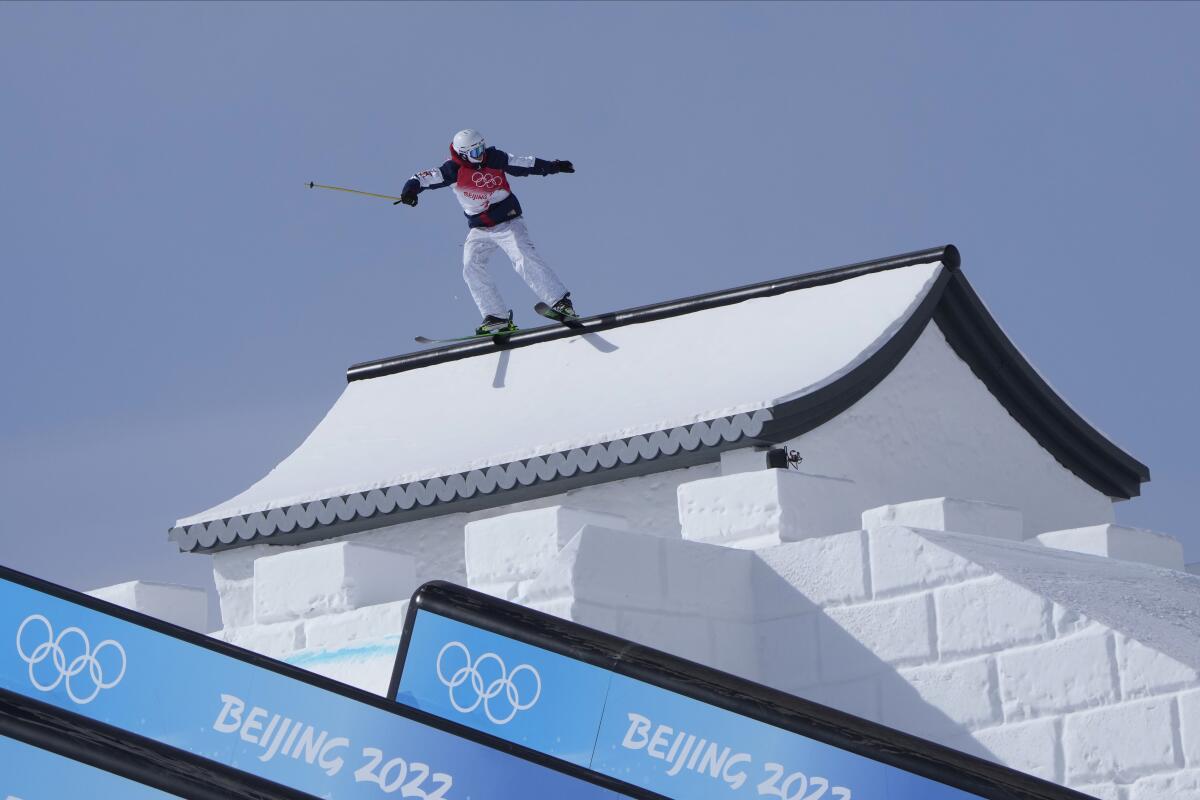
ZHANGJIAKOU, China — Three U.S. men advanced to the final of freeski slopestyle on Tuesday at Genting Snow Park, led by Nick Goepper, who qualified third.
Goepper, a two-time Olympic medalist, qualified with a best score of 82.51, trailing Switzerland’s Andri Ragettli and Norway’s Birk Rudd. Alexander Hall crashed on his second run but made it through to Wednesday’s final with a score of 79.13 that put him fifth.
After winning silver in the Olympic debut of freeski big air, Colby Stevenson qualified sixth with a 78.01 in his signature slopestyle event.
Stevenson said he was looking forward to advance to the finals so he could ski in better morning conditions. The course already presents athletes with technically challenging features like long rails and angled jumps, but adding afternoon weather makes it even harder.
Goepper pointed out how the final landing area is completely covered in shade during the afternoon, making it difficult for riders to spot while they’re flying through the air. Stevenson said he tries to avoid taking off from the middle of a jump because they can get icy as the afternoon progresses.
“This is the most trouble I’ve seen the ladies and the men have in any event here,” Stevenson said after the men’s qualifications took place following the women’s final. “It’s some to do with the icy lips, some to do with how different the features are and how long the rails are. You’ll see a lot of people falling off early. It’s cool stuff because you can risk it, risk it for the biscuit, or take it a little mellower, but the judges are really rewarding people who are going for the harder rails and landing clean tricks.”
The United States has won at least one men’s freeski slopestyle medal in every Olympics since the event debuted in 2014. Americans swept the podium in 2014 with Joss Christensen and Gus Kenworthy taking gold and silver, respectively, in front of Goepper’s bronze. Goepper followed with a silver in Pyeongchang.
- Share via
Anna Gasser wins big air gold
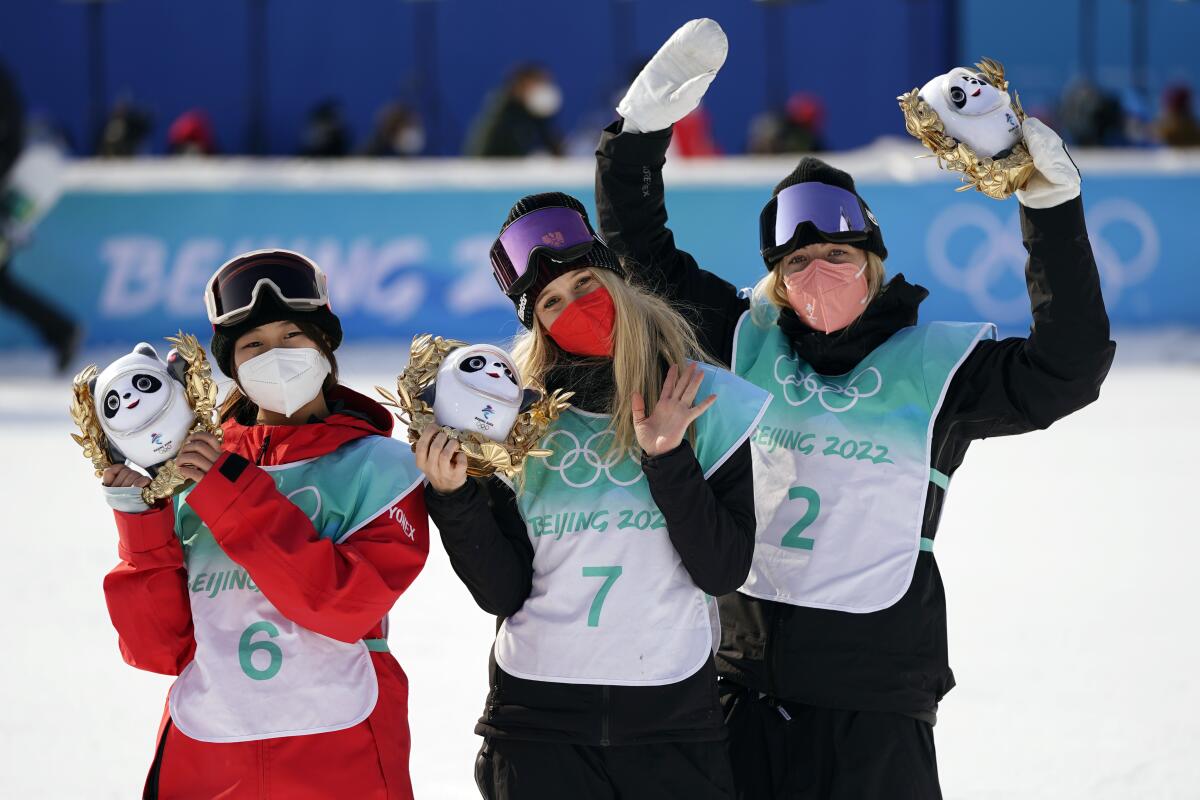
BEIJING — Anna Gasser hardly felt like the favorite in Beijing, even as the only woman to ever win an Olympic snowboarding big air contest.
The way her competition — with an average age of 21 — has been pushing the sport’s boundaries, the 30-year-old from Austria wasn’t even sure that her best would be good enough for the podium.
“This one is more emotional to me, because it’s so unexpected,” she said.
Gasser executed a massive cab 1260 on her final jump to overtake Zoi Sadowski Synnott of New Zealand and win her second straight Olympic gold medal in big air Tuesday.
Sadowski Synnott led Gasser by 0.25 points entering the third round after both landed a pair of double cork 1080s — two off-axis flips with three rotations.
Gasser was assured of at least silver when she dropped in switch for her final attempt at Big Air Shougang. She was the first woman to land a cab double cork 1260 when she did it 2019, and she did it again here, the only rider to stomp out a trick with 3½ spins.
“I didn’t care about the 0.25,” Gasser said. “I cared about the best snowboard tricks I could show.”
A former gymnast who began snowboarding only at 18, Gasser dominated the international circuit ahead of the Pyeongchang Games four years ago and expected nothing less than gold when big air debuted there.
The sport seemed to grow past her after that. She has only one World Cup victory since the start of 2019, while a cadre of high-flying girls and young women have pushed snowboarding to new heights.
Like Sadowski Synnott, a 20-year-old Kiwi dynamo who last week became her country’s first Winter Olympics champion when she won gold in slopestyle.
Or 20-year-old Reira Iwabuchi of Japan, who came oh-so-close Tuesday to landing the first triple cork — three off-axis flips — ever in a women’s competition.
Or, of course, 17-year-old bronze medalist Kokomo Murase of Japan, who four years ago became the youngest girl ever to compete at Winter X Games — and won.
The oldest rider in the finals by five years, Gasser remains the only one with an Olympic big air title.
“They have so many more years to come, you know?” she said with a laugh. “I love riding with the young girls. I love the energy, and those girls pushed me over the last year. They made me a better snowboarder, and without them, without their inspiration, getting inspired by Zoi so much over the last two years, I don’t know if I would do those tricks now.”
Sadowski Synnott followed Gasser in the final round and tried her own 1260, but she couldn’t hit the landing. She adds a silver to her slopestyle gold and a big air bronze from 2018, making her the seventh snowboarder with three Olympic medals, on a list that includes Shaun White and Jamie Anderson.
“I can’t really believe that,” Sadowski Synnott said.
Moments before Gasser took the lead, Iwabuchi nearly upended the sport with her try at a triple cork. She briefly appeared to have it landed before spinning out halfway down the landing. Her competitors still erupted in excitement, swarming her at the bottom of the jump as she waited for the judges’ scores. She got only 37 points and ended up in fourth.
Gasser watched Iwabuchi’s triple cork from atop Big Air Shougang, where she said everyone “freaked out.”
“She went for progression and not for the medal today,” Gasser said. “She could have played it safe and maybe been on the podium, but she went all out.
“I hope she gets the same attention from this ride that she would have got for a medal.”
- Share via
Coronavirus cases continue to plummet
BEIJING — In the lowest one-day total since the Winter Olympics started, organizers reported one new coronavirus case Tuesday.
The person, part of the wide-ranging “other stakeholders” group, tested positive inside the bubble that separates the Games from the rest of society.
This is the seventh time in the last eight days that new cases have been in single digits. Since Jan. 23, 433 people associated with the Games have tested positive.
- Share via
Chinese freeskiing star Eileen Gu wins second medal of Winter Games in freeski slopestyle
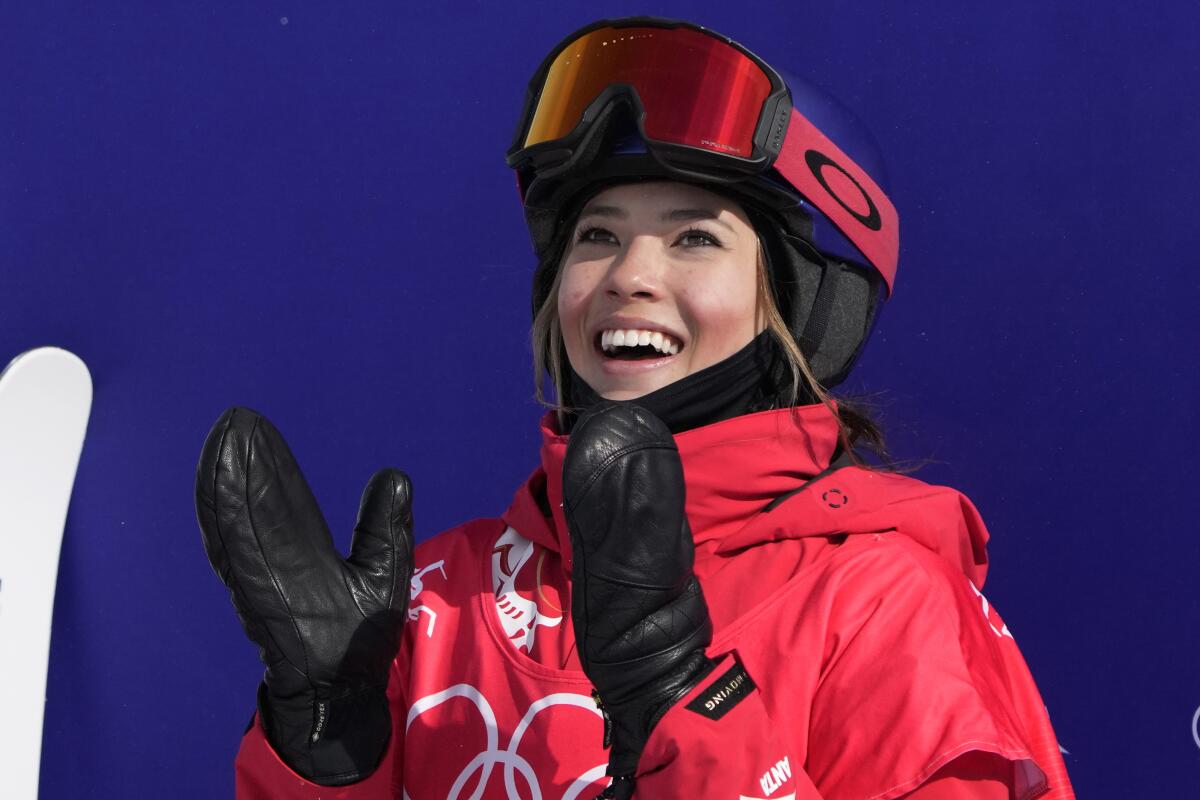
ZHANGJIAKOU, China — She did it again.
Needing another clutch run to move into medal position, Chinese freeskiing star Eileen Gu won her second medal of these Olympics after landing her third and final run in freeski slopestyle on Tuesday at Genting Snow Park.
“It came down to the real third run and I did it and so for that I am so, so proud of myself,” Gu said afterward.
Gu’s 86.23 on her third run finished second to Swiss star Mathilde Gremaud, who also won her second medal of the Beijing Games after taking bronze in big air. Estonia’s 19-year-old phenom Kelly Sildaru finished third.
Gremaud won her first Olympic gold with a score of 86.56 on her second run. The time stretched on as she waited to see if anyone could beat her, though in the end no one could.
“It was a roller-coaster,” Gremaud said. “I was just stoked that I could stay in first, but I was rooting for everybody.”
The victory moved Gremaud another step up the podium in slopestyle this year, having taken silver at the 2018 Winter Olympics. The 22-year-old will leave Beijing with two medals after winning bronze in big air on her birthday.
Gu was ranked eighth entering the final run after landing a conservative, safety run on the first attempt and falling on her second. As Gu made her way through the course a third time, cheers from Chinese fans and volunteers rose in an anticipation. When she landed her final 900, fans waved plastic hand clappers.
Despite the pressure on the final run, Gu said her mind was largely blank going into it. “I think the more that there’s more pressure, the more I enter the zone, the less internal talk I have,” she said.
What might actually raise the stakes for Gu is the arrival of her grandmother to watch her compete in her next event, something that Gu said she’s never done before.
“Hopefully I can put on a good show for her,” Gu said while snacking in between media interviews and rushing to her halfpipe training.
With a gold medal from big air won in similar last-run fashion, Gu has a chance to add a third medal in freeski halfpipe on Friday. The 18-year-old star is undefeated in halfpipe competition this year.
“It’s absolutely incredible,” American Maggie Voisin said of Gu’s attempt at three medals. “That girl deserves it all. I’ve never met anyone who works as hard she does. She’s so dedicated, so determined. I’m really, really happy for her and I have no doubt she will go out and get on the podium in halfpipe.”
Voisin, who finished fourth in slopestyle in Pyeongchang, recovered from a first-run gaffe to finish fifth. The 23-year-old three-time Olympian seemingly slipped when going off one of the tricky tilted jumps on the slopestyle course, flailing through the air instead of pulling off a skill. While she didn’t fall on the run, it only scored a 35.48.
Her second run score of 74.28 temporarily put her in bronze-medal position, but she got knocked down in the final round by Anatasia Tatalina of the Russian Olympic Committee and Gu.
- Share via
Brittany Bowe’s unselfish act leads to U.S. winning a speedskating gold
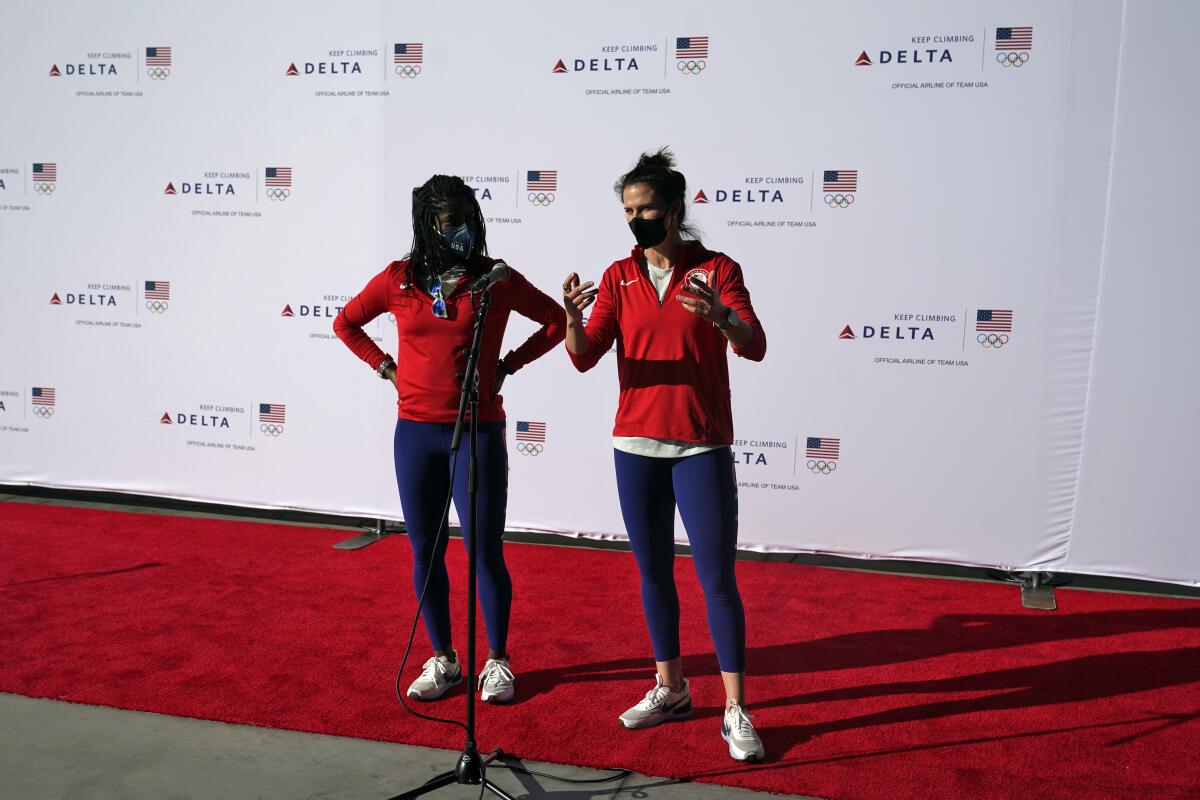
BEIJING — Ryan Shimabukuro wasn’t surprised when Brittany Bowe made a sacrifice that launched a thousand Twitter responses. Not only was he not surprised that the three-time Olympian would forfeit her Olympic position in the 500 meters to teammate Erin Jackson after an uncharacteristic slip from the world’s top sprinter, the U.S. speedskating coach expected Bowe to do it.
“It’s just in her DNA,” said Chancellor Dugan, Bowe’s former college basketball coach.
With a mix of compassion and competitiveness that earned the respect of her Olympic peers, Bowe carried the flag for the United States during the opening ceremony and is ready to take center stage as a favorite to earn her first individual medal in her signature 1,000-meter event Thursday at the National Speed Skating Oval.
When Jackson slipped during the 500-meter Olympic trials race and finished third, Bowe, who had already qualified for the Olympics in the 1,500- and 1,000-meter races, forfeited her spot in the sprint distance. She knew Jackson had a chance to win gold. The 29-year-old was the world’s No. 1-ranked skater in the 500 and proved it Sunday when she became the first Black American woman to win an Olympic speedskating medal.
Bowe, 33, was one of her loudest supporters at the track.
“I want this moment to be about her,” said Bowe, who raced in the event when other countries failed to fill their quotas. Bowe finished 16th of 30 skaters.
The selfless gesture came as no surprise to Dugan, who coached Bowe at Florida Atlantic in Boca Raton. Bowe was a three-year starter and captain for the Owls and ranks eighth in the school’s all-time scoring list with 1,062 points after graduating in 2010. Dugan remembered Bowe sacrificing her time to come in before practice or stay late to shoot with and mentor younger teammates.
- Share via
U.S. defeats Finland, advances to women’s hockey final vs. Canada
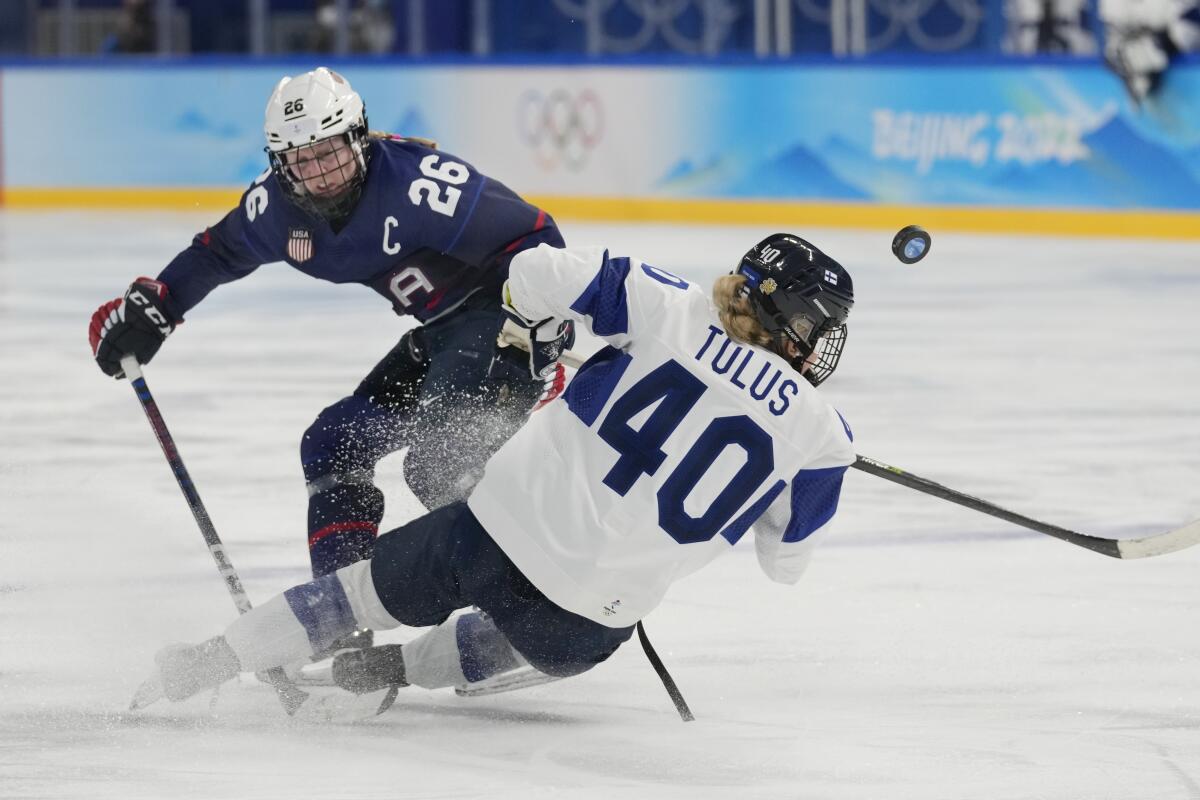
BEIJING — To the surprise of no one, the U.S. and Canada, the two superpowers of women’s hockey, will meet again with an Olympic championship at stake.
Second-period goals by Cayla Barnes and Hilary Knight and third-period goals by Hayley Scamurra and Abby Roque lifted the defending champion U.S. women to a 4-1 semifinal victory over Finland on Monday at Wukesong Arena and clinched a berth in Thursday’s gold medal game. Canada clinched its berth earlier in the day with a 10-3 rout of Switzerland.
The U.S. has reached at least the semifinals of every women’s Olympic hockey tournament since women’s hockey was added to the program in 1998. The Americans and Canadians have met in every gold medal game except one, at Turin in 2006. That year, the U.S. lost to Sweden in the semifinals and went on to win a bronze medal.
Canada defeated the U.S. in a preliminary-round game here, 4-2. However, at the Pyeongchang Games in 2018, Canada won the teams’ preliminary-round matchup but the U.S. won their rematch in the gold medal game, prevailing in a shootout.
Neither team scored in the first period, but the tempo was good and there were few stoppages. U.S. goaltender Alex Cavallini kept Finland scoreless by extending her left pad to stop a shot by four-time Olympian Michelle Karvinen from the right side in the closing seconds, one of six shots she faced in the opening period.
The U.S. got lucky on a phantom tripping call made against Finland forward Tanja Niskanen at 2:12 of the second period. Barnes, a native of Eastvale in Riverside County, took a crisp pass from Hannah Brandt and whipped a shot from the lower edge of the right circle to beat goalie Anni Keisala, Barnes’ first Olympic goal in her second tournament. Hilary Knight earned the second assist.
Knight padded the lead to 2-0 at 18:53 of the second period, again capitalizing on a bit of luck. A shot by Savannah Harmon hit a Finland player and bounced to the left circle, where Knight pounced on it and scored.
Scamurra, with her back to the net, got her stick on a long shot by Barnes for the third goal, at 15:20 of the third period. Finland scored its only goal with 26 seconds left when Susanna Tapani converted a chance during a scramble.
The Americans have had some trouble scoring in this tournament but on Monday they got enough goals to subdue a Finland team that was gritty but unlucky.
- Share via
Elliott: A disgraceful decision by arbitration court in allowing Kamila Valieva to skate
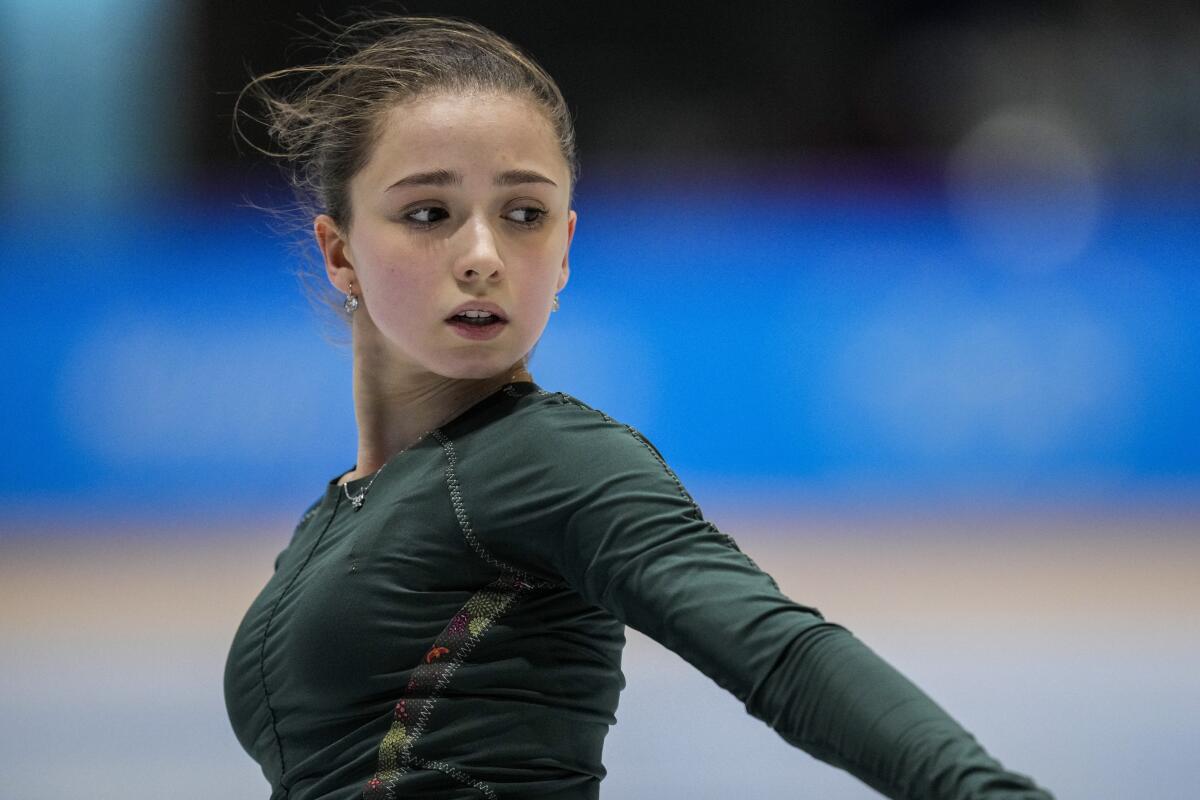
BEIJING — What the Court of Arbitration for Sport essentially said in deciding figure skater Kamila Valieva can compete in the Olympic women’s singles event despite having tested positive for a banned stimulant in December is that it’s OK to be a drug cheat if you’re 15 and you have “protected person” status under the rules of the World Anti-Doping Agency. That’s reprehensible on more levels than Valieva has quadruple jumps in her repertoire.
Valieva, who became the first woman to land a quadruple jump in Olympic competition while boosting a gold-medal effort by athletes of the Russian Olympic Committee in the team event, was suspended last week by the Russian Anti-Doping Agency (RUSADA) after it received a report the prohibited substance trimetazidine had been detected in a test she took at the national championships. She appealed, and the same agency lifted her suspension the next day. Surprise!
The International Olympic Committee, International Skating Union and World Anti-Doping Agency challenged the Russian Anti-Doping Agency’s decision to lift Valieva’s suspension, all of them apparently foolish enough to think a doping violation committed, even unknowingly, by a stellar athlete would be punished according to the rules established for everyone. A panel of three arbitrators appointed by the Court of Arbitration for Sport dismissed those challenges Monday, allowing Valieva to compete starting Tuesday.
- Share via
Madison Hubbell and Zachary Donohue earn bronze medal in ice dance
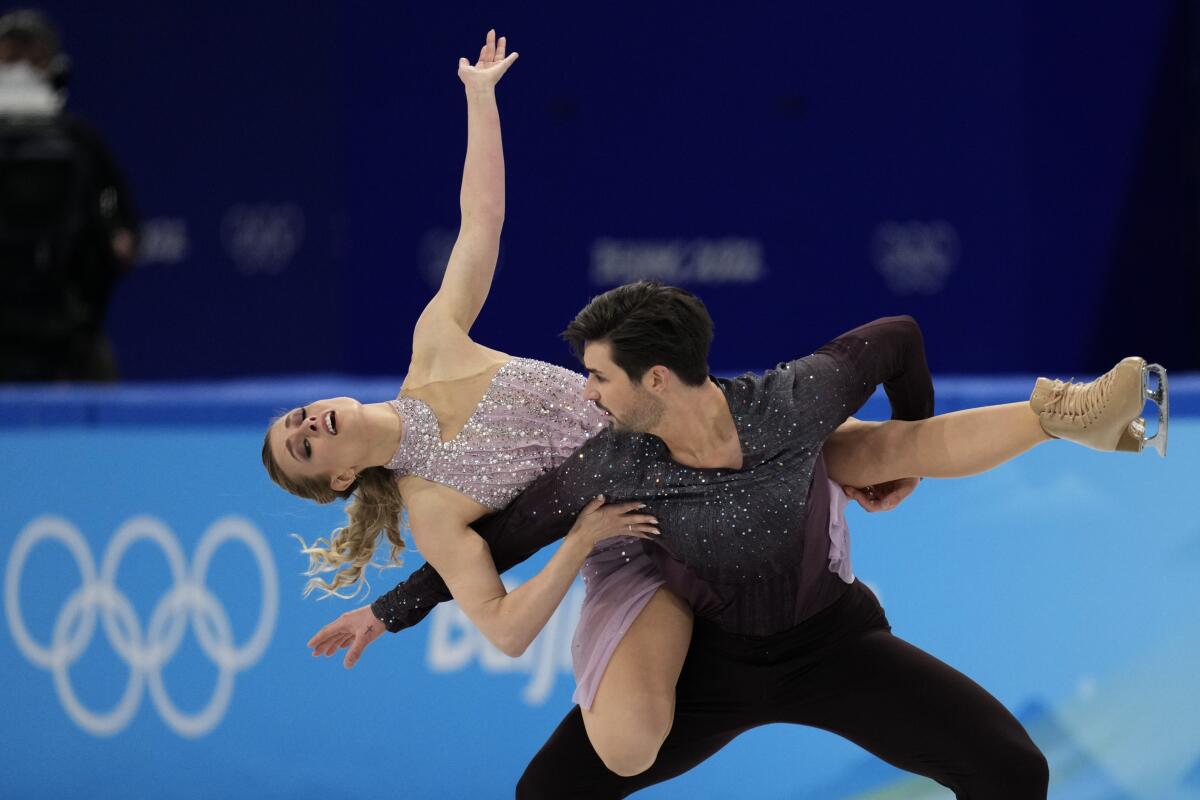
BEIJING — Before she stepped off the ice for the last time as a competitive ice dancer Madison Hubbell did a little twirl, soaking in the moment and the lively atmosphere at Capital Indoor Stadium.
She and partner Zachary Donohue had earned the satisfaction of knowing they had saved their best for last, earning an Olympic bronze medal Monday with a mesmerizing and technically accomplished free dance that capped their careers on a high note.
Hubbell and Donohue’s performance to “Drowning” by Anne Sila was the highlight of a partnership that included three U.S. championships and a fourth-place finish at the 2018 Pyeongchang Games. Their final total of 218.02 points — which included a deduction of one point for an extended lift in their free dance — put them on the podium alongside incomparable gold medalists Gabriella Papadakis and Guillaume Cizeron of France (226.98 points) and runners-up Victoria Sinitsina and Nikita Katsalapov of the Russian Olympic Committee (220.51 points).
Madison Chock of Redondo Beach and partner Evan Bates, who won the U.S. ice dance title last month, finished fourth with 214.77, their best showing in their three Olympic appearances together. Bates also competed at the 2010 Games with a different partner.
- Share via
U.S. teammates overcame numerous challenges on way to one-two monobob finish
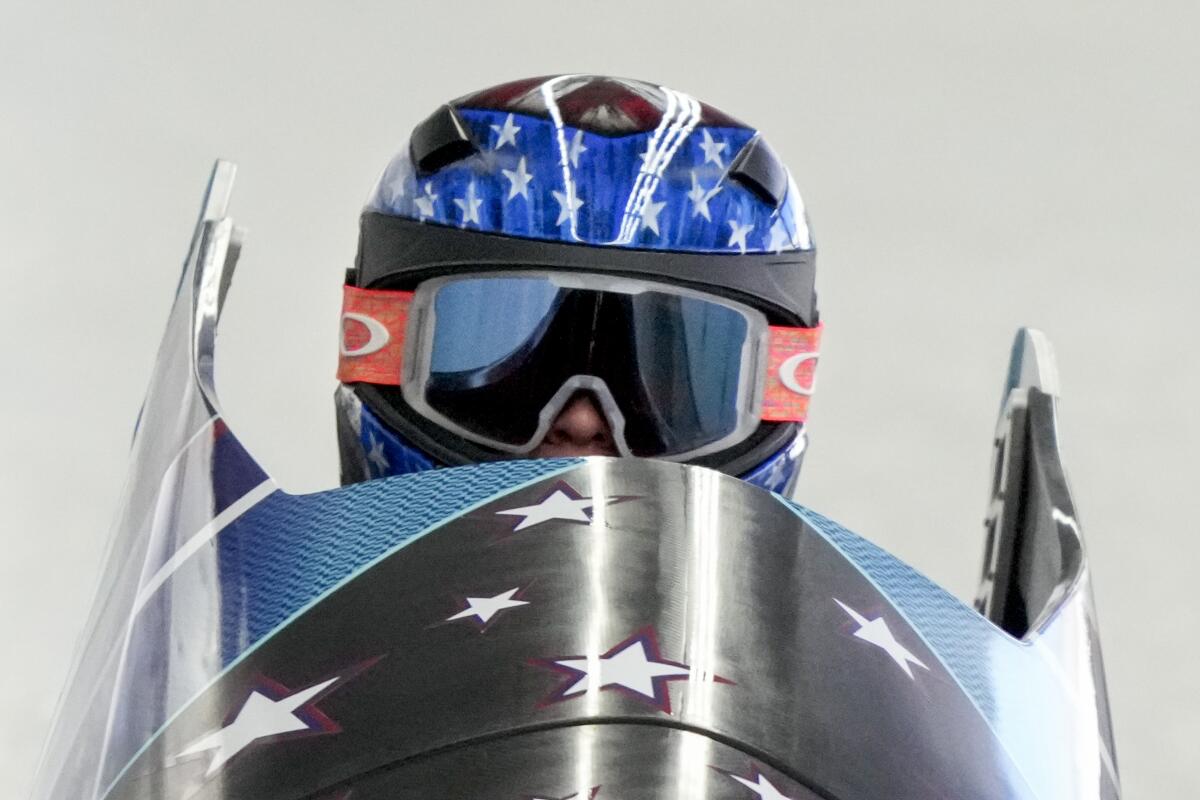
BEIJING —If bobsledder Kaillie Humphries got a bit emotional on the podium, if the third gold medal of her storied career felt more special than the others, there was good reason.
A few good reasons.
“It has been a journey to get here,” she said. “It hasn’t always been easy.”
The actual racing might have been the easiest part, as Humphries confirmed she is the best in her sport, outpacing the nearest competition by a sizeable 1.54 seconds to win the debut of women’s monobob at the Beijing Olympics.
The real story was what happened before she arrived in China. As recently as two months ago, it was unclear if the 36-year-old Olympic veteran would be allowed to compete.
- Share via
Austria wins Olympic gold in men’s team ski jumping
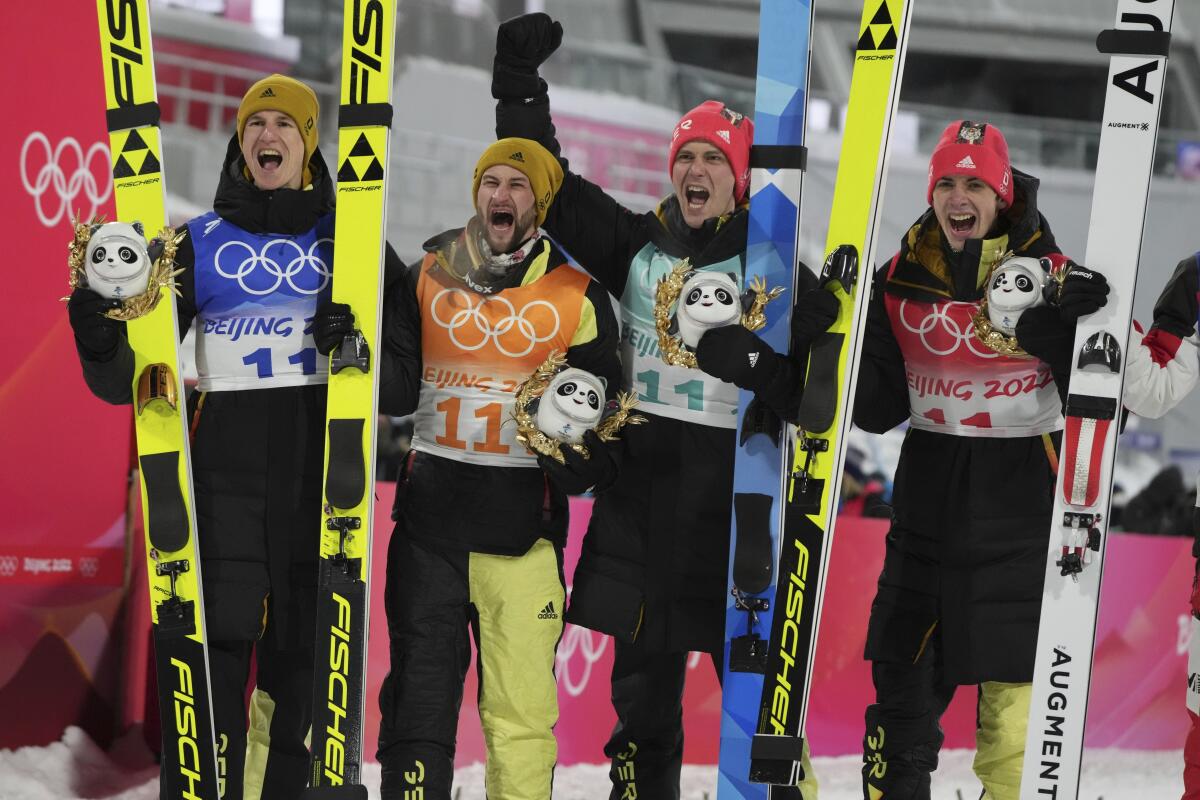
Austria has won Olympic gold in the ski jumping team event at the Beijing Games.
Manuel Fettner jumped 420 feet Monday night on his final jump to seal the first-place finish.
The team of Fettner, Stefan Kraft, Daniel Huber and Jan Hoerl combined to score 942.7 points, beating Slovenia by 8.3 points with a combination of jaw-dropping distances and style that impressed the judges.
The Slovenians earned silver, and Germany won bronze.
Slovenia went into the final round with a nine-point lead over Austria. Norway, Germany, Japan and Poland followed after the first round in the last ski jumping event of the 2022 Olympics, but they couldn’t keep up with the top two nations.
Germany’s result was particularly impressive because the team didn’t have one of the best, two-time gold medalist Andreas Wellinger, in their lineup because he tested positive for COVID-19.
- Share via
Megan Nick of U.S. claims bronze in freestyle skiing aerials
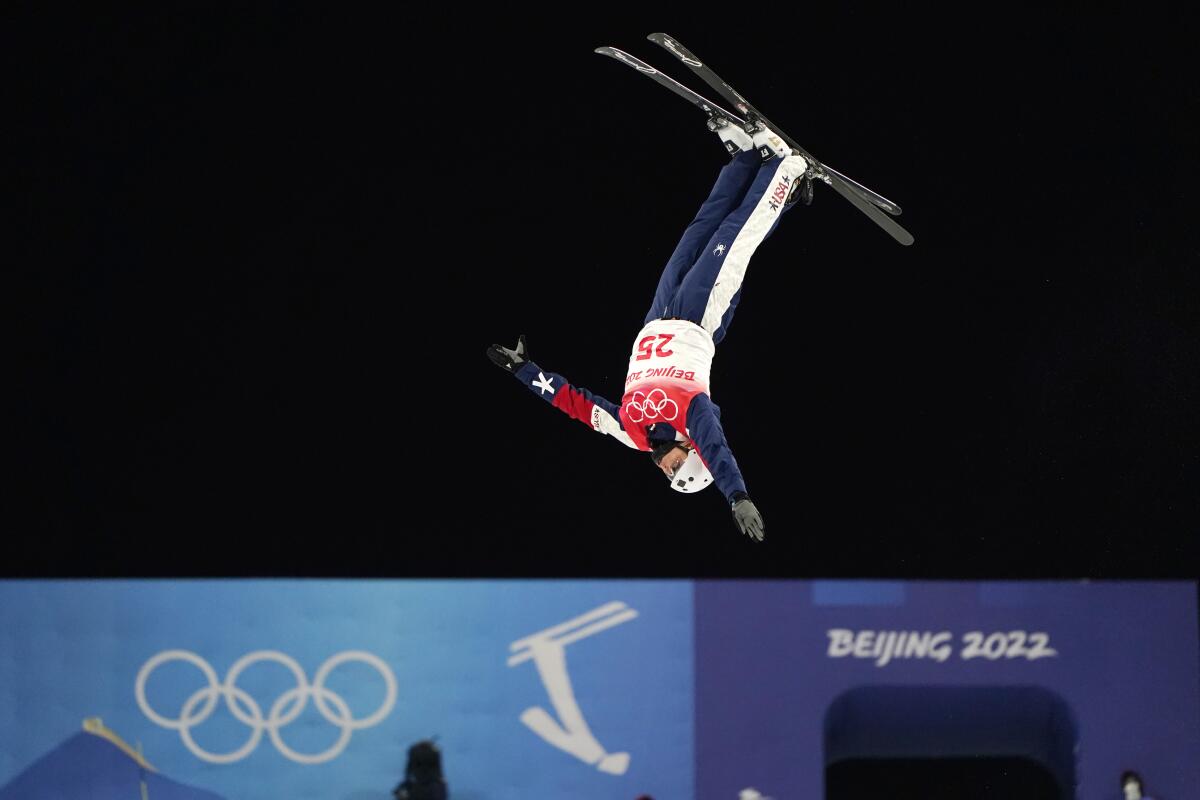
ZHANGJIAKOU, China — A relatively small risk resulted in a big reward for Megan Nick as she used a perfectly executed, but less difficult trick to win a bronze medal in freestyle skiing aerials on Monday at Genting Snow Park.
The 25-year-old Olympic rookie completed the least difficult trick in the six-woman super final. Up against competitors throwing triple-flipping, triple twists, Nick’s full double-full (two flips with three twists) only has a difficulty degree of 3.525. But her clean execution won Nick her first Olympic medal as three women stumbled on more difficult skills.
Nick jumped second and anxiously waited for four more competitors to see where she would land. When the results went final, the prevailing emotion for Nick wasn’t necessarily joy or elation at winning an Olympic medal, but instead relief.
“I was just trying to be extremely present and grateful that I was even there and in the super final,” Nick said. “I tried to come into these Games with no expectations with only wanting to compete the way I’ve been training. And so I was just focused on doing the jumps that I know how to do, which is what my coach kept reminding me all day.”
One of those who gambled on the tricky back full-full-full with a 4.293 difficulty degree was U.S. teammate Ashley Caldwell.
Caldwell, who helped the United States to a gold medal in the mixed team event Thursday, finished fourth despite being the top qualifier. The four-time Olympian nailed the difficult triple-twisting skill during her second jump in the first final but failed to land it cleanly in the last round.
“I got first [in mixed team aerials] at the Olympics and I got fourth, which I think are the worst and the best positions that you can get,” Caldwell told reporters. “I just feel relief. There is a lot of relief taken off my shoulders, and I did all I could.”
China’s Xu Mengtao was the only competitor to land the difficult triple twist with three flips in the super final, winning gold with a score of 108.61. Hanna Huskova of Belarus took silver with 107.95 points after completing a double-twisting, triple flip. Xu, a 31-year-old four-time Olympian, won her first Olympic gold medal.
- Share via
Kamila Valieva cleared to compete in women’s figure skating
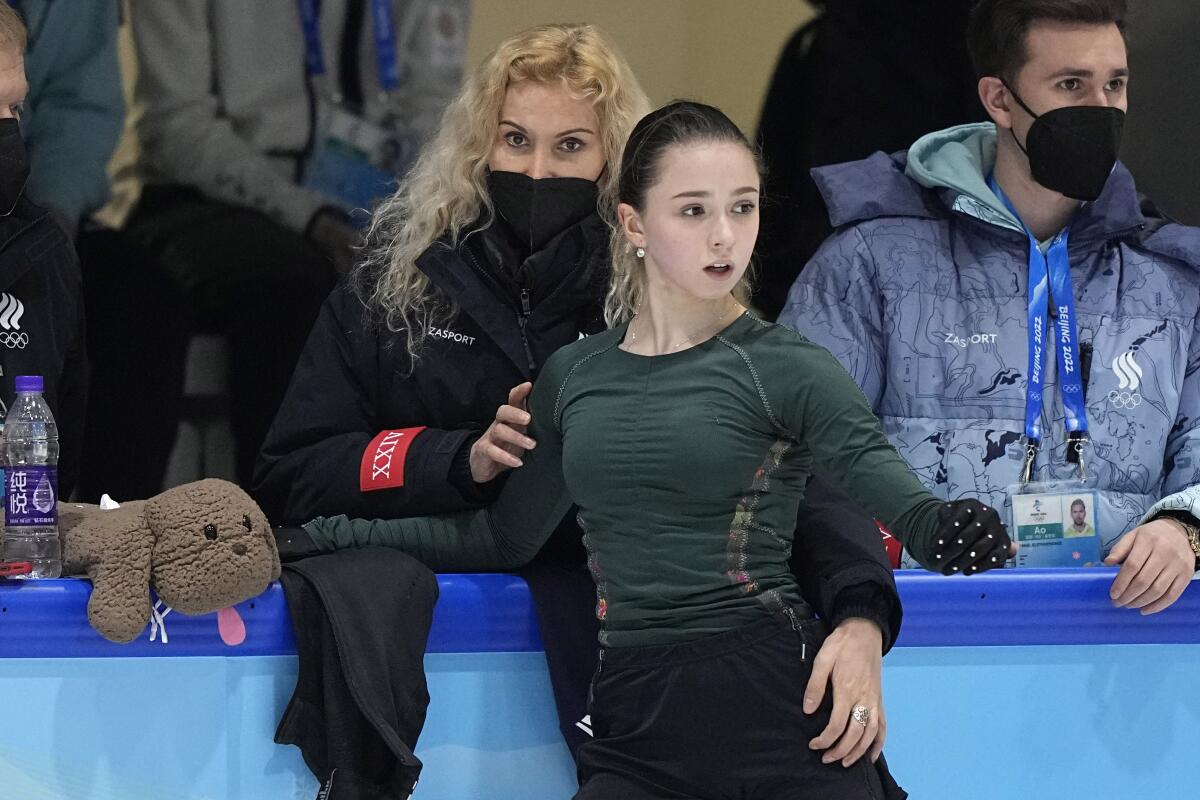
BEIJING — Russian teenager Kamila Valieva has been cleared to compete in the women’s figure skating competition at the Winter Olympics despite failing a pre-Games drug test.
The Court of Arbitration for Sport released its ruling less than 12 hours after a hastily arranged hearing that lasted into early Monday morning that the 15-year-old Valieva, the favorite for the women’s individual gold, does not need to be provisionally suspended ahead of a full investigation. The court gave her a favorable decision in part because she was a minor or “protected person” and was subject to different rules from an adult athlete.
“The panel considered that preventing the athlete to compete at the Olympics would cause her irreparable harm in the circumstances,” CAS Director General Matthieu Reeb said.
Now, Valieva and her fellow Russian skaters can aim for the first podium sweep of women’s figure skating in Olympic history. The event starts with the short program Tuesday and concludes Thursday with the free skate.
- Share via
Eileen Gu reaches freestyle skiing slopestyle finals
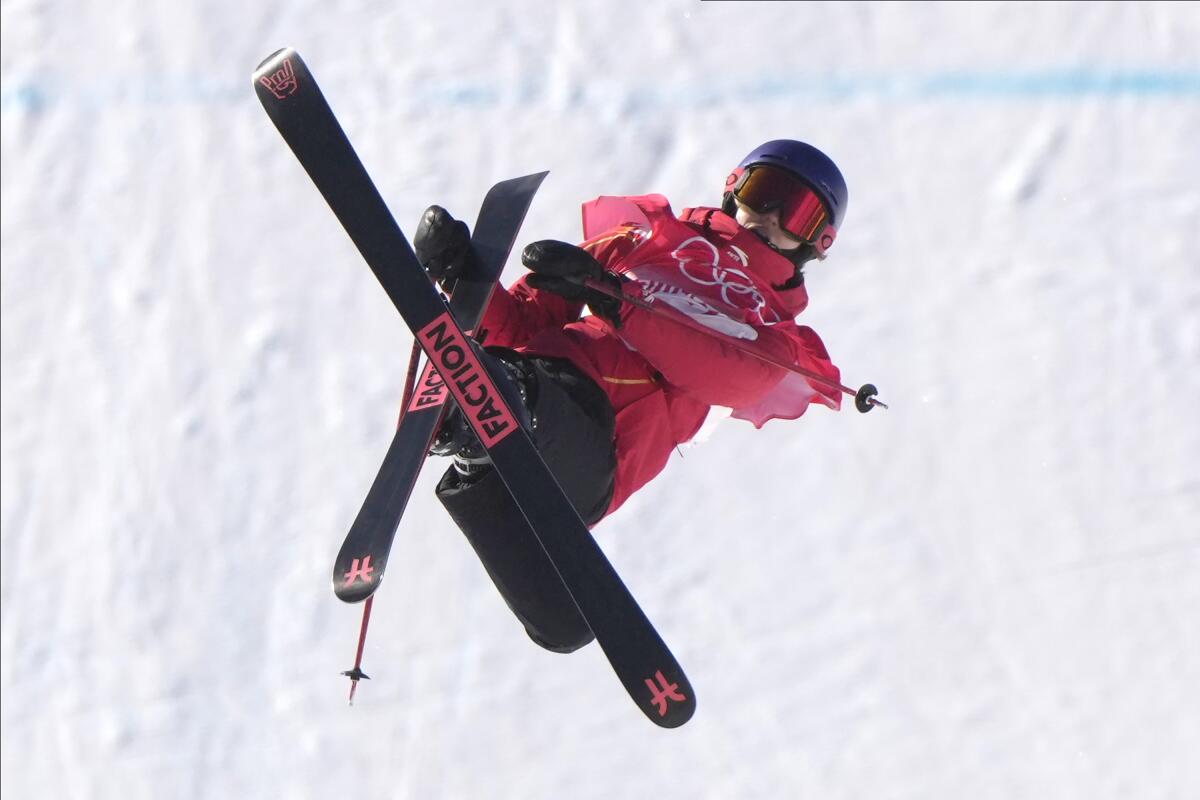
ZHANGJIAKOU, China — Eileen Gu’s quest for another Olympic medal continues.
The 18-year-old freestyle skiing sensation qualified for the women’s slopestyle finals on Monday after a rocky start that placed her on the cusp of the top dozen athletes moving onto the next event. Her second run bumped her up from 11th to third place, cinching her a spot in the finals.
Gu, who won gold during the women’s freestyle big air event last week, is a strong contender to snag another medal in slopestyle, having racked up several first- and second-place wins in competitions over the last year. She’s also favored to win gold in women’s halfpipe later this week.
Gu passed through the media mixed zone after the event without taking questions.
Another Olympic newcomer, Kelly Sildaru from Estonia, finished first in the qualifying round with a score of 86.15. Sildaru placed first in World Cup slopestyle earlier this year at Mammoth Mountain, where Gu came in second.
French skier Tess Ledeux and Swiss skier Mathilde Gremaud, who won silver and bronze, respectively, in big air last week, moved on to finals as well. Gremaud won silver in slopestyle at the Winter Olympics in Pyeongchang, but 2018 gold medalist Sarah Hoefflin from Switzerland failed to place in qualifiers.
The event, initially scheduled for Sunday, was postponed because of weather conditions. The finals were also pushed back to Tuesday morning Beijing time. Also competing Tuesday are American skiers Maggie Voisin and Marin Hamill.
- Share via
Beijing coronavirus numbers continue to be in single digits
BEIJING — The spread of the coronavirus at the Winter Olympics appears to be petering out as the Games enter their final days.
Organizers reported three new cases Monday, the sixth time in the last seven days when cases have been in the single digits.
There have been 432 cases in the Olympics bubble since Jan. 23, 183 from athletes and team officials, though the number isn’t broken down by country or sport.
The number of people inside the bubble — called the closed loop by organizers — isn’t known. But each person is required to be tested daily for the virus and more than 70,000 such tests are being recorded each day.
- Share via
Kaillie Humphries, Elana Meyers Taylor win gold, silver in women’s monobob
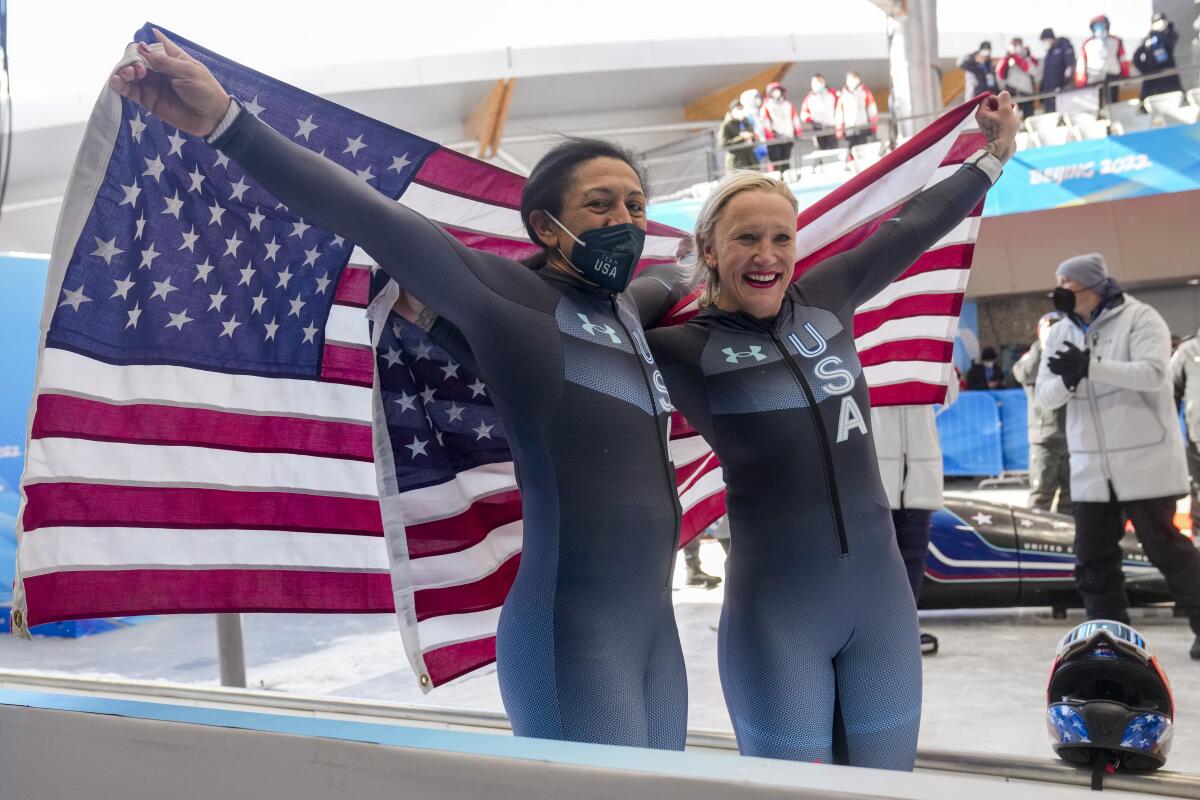
BEIJING — Kaillie Humphries stood straight up in her moving bobsled, stretching her arms out wide in a pose reminiscent of a favorite internet meme
Are you not entertained?
Humphries and fellow American Elana Meyers Taylor solidified their status as the top pilots in the world by finishing first and second, respectively, in the inaugural Olympic women’s monobob competition Monday at Yanqing National Sliding Center.
- Share via
Erin Jackson becomes first U.S. woman to medal in the 500 meters since 1994
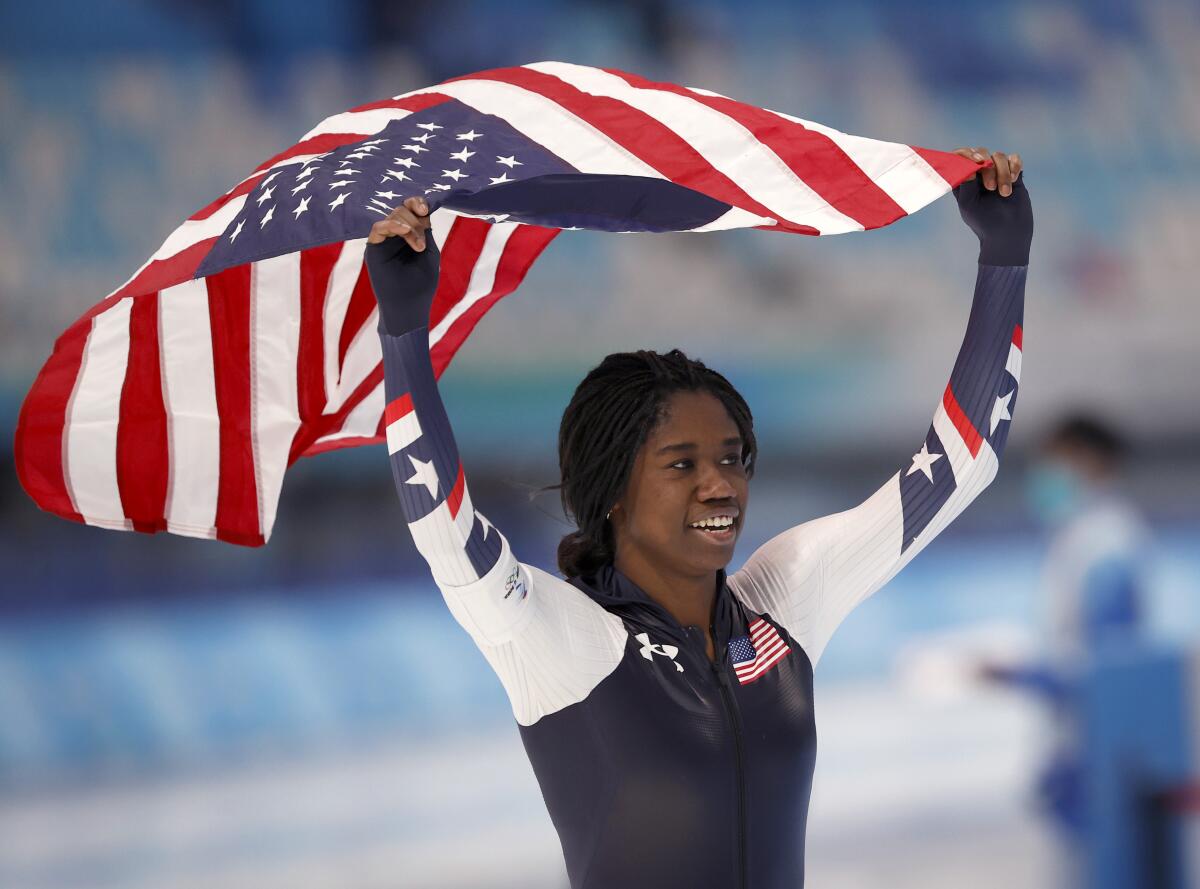
BEIJING — Erin Jackson didn’t let this chance go to waste.
After teammate Brittany Bowe gave up her qualifying spot in the 500-meter speedskating race to ensure Jackson could compete at the Olympics despite a slip during the Olympic trials, the top-ranked sprinter repaid her longtime friend’s selfless gesture by winning a gold medal on Sunday at the National Speedskating Oval.
Skating in the second-to-last heat, Jackson blazed to a 37.04-second finish to become the first U.S. woman to medal in the 500 meters since 1994 and win the United States’ first individual speedskating medal at any distance since Shani Davis and Chad Hedrick took gold and bronze, respectively, in the 1,000 meters in 2010. Jackson, who four years ago became the first Black woman to represent the United States in speedskating at the Olympics, is now the first Black woman to win a speedskating gold medal for the United States.
- Share via
‘Like riding a bike’: Skier Tommy Ford races for first time since devastating crash
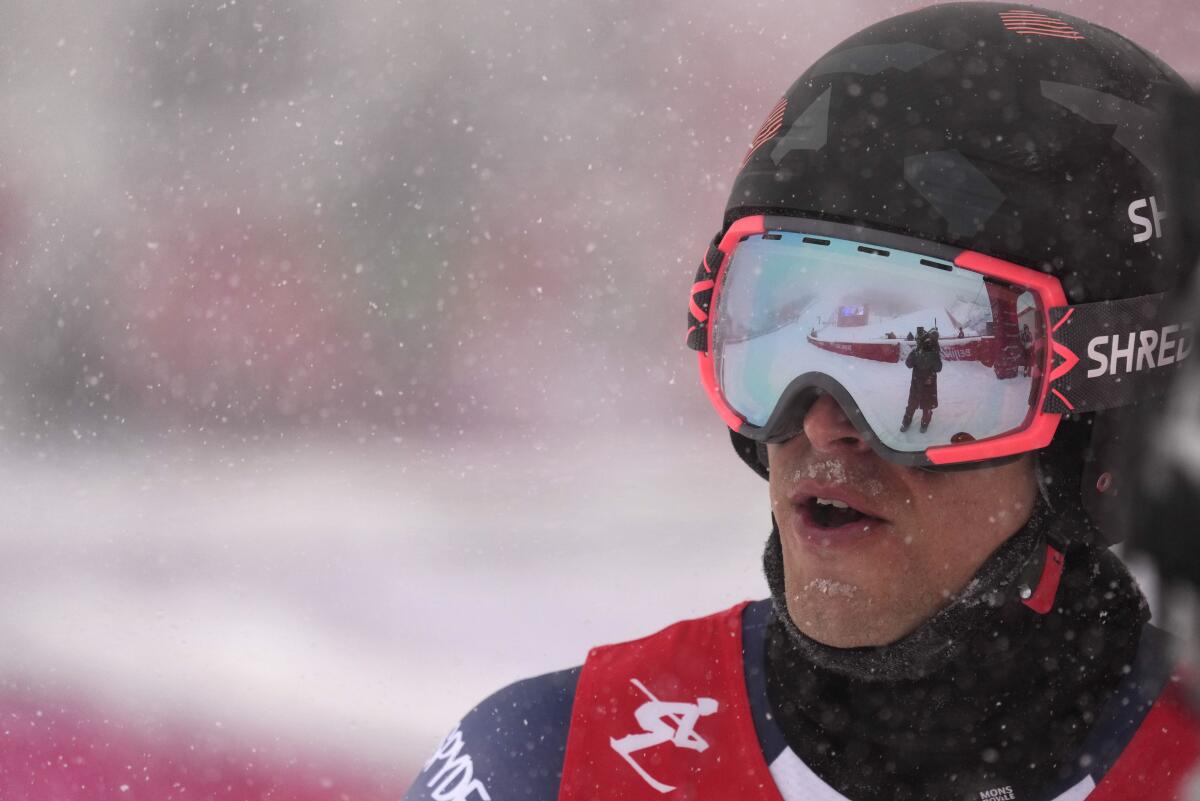
BEIJING — Tommy Ford emerged from the swirl of snowflakes and low-slung clouds that transformed the treacherous giant slalom course known as the Ice River into a maze.
He shot through the finish, skidded to a stop in a spray of white and, for a moment, absorbed the scene at the Yanqing National Alpine Centre on Sunday as whining leaf blowers cleared snow from the grandstands and course workers scrambled to repair the run before the next skier started.
He had finally returned.
Four hundred days had passed since Ford’s last race ended in a devastating crash he still can’t remember. On a day when snow piled up at the Winter Olympics and simply making it down the mountain without incident was an accomplishment, the 32-year-old took a significant step in a recovery that has tested his body and spirit.
“It’s like riding a bike,” Ford said after his first run. “It was pretty familiar. I felt comfortable and ready to charge.”
Behind the unassuming words, however, there’s a painful, winding path to his third Olympics.
Near the finish of the giant slalom in Adelboden, Switzerland, on Jan. 9, 2021, Ford collided with a gate at full speed, banged into the snow headfirst, tumbled down the slope for three seconds and bowled over two course workers before coming to a stop. He had found a rhythm on the World Cup circuit in previous months, twice reaching the podium in 2020. Now he lay motionless in the snow as emergency personnel rushed over in a stomach-turning scene, even by the standards of a sport in which violent crashes are commonplace.
- Share via
‘Here to grow the game’: Why North American hockey players are competing for China
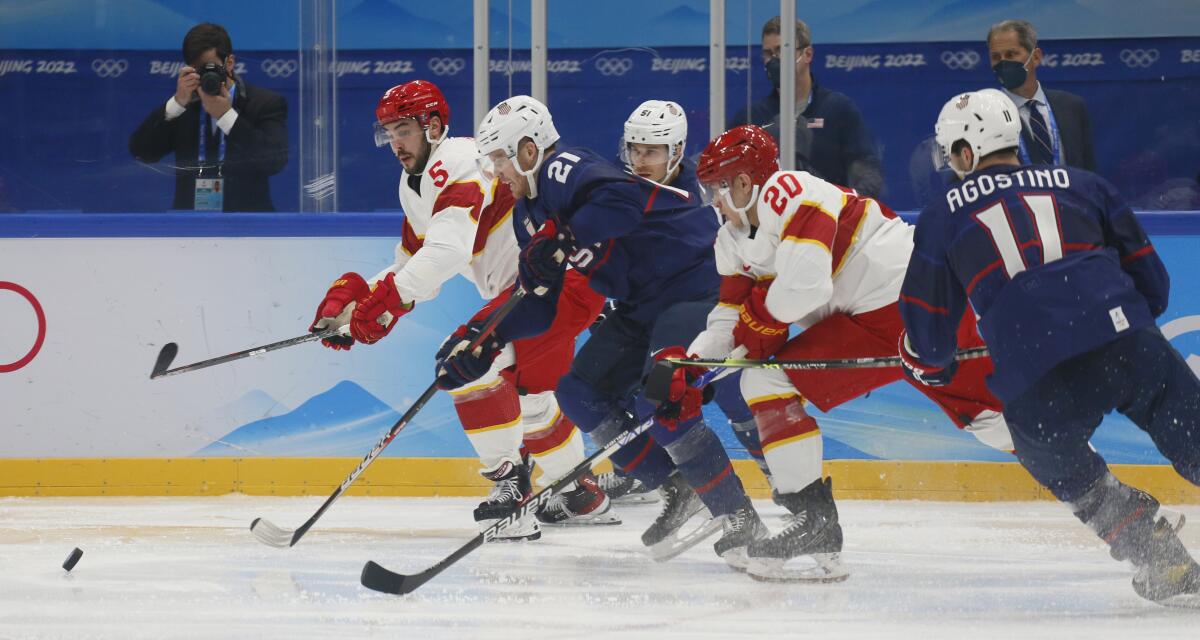
BEIJING —The players agreed to take different names. Names they couldn’t necessarily pronounce at first. Jeremy Smith became Jieruimi Shimisi and Jake Chelios chose Jieke Kailiaosi, and maybe it seemed weird.
“A little bit,” said Spencer Foo, who became Fu Jiang. “Yeah, I picked it up pretty quick.”
Few of them spoke Chinese or had spent time in China, but they knew the difference between a forecheck and a cross check. That sufficed to draw these hockey players together, transport them halfway around the globe and plunk them down in a new country.
Which made perfect sense to them.
“There’s a bigger picture,” said Ye Jinguang, who grew up in British Columbia as Brandon Yip. “We’re here to grow the game.”
The Chinese men’s hockey team made its Winter Olympic debut in Beijing last week, part of a grand experiment by the government to build a national hockey program from scratch, in a hurry.
The roster featured minor-league talent gleaned from throughout North America — players with some Chinese ancestry or who were willing to live in country for several years. Team officials also asked them to take those transliterated names.
Not everyone was thrilled about this prefab roster.
- Share via
How an NBC reality show helped launch bobsledder Josh Williamson’s Olympic career
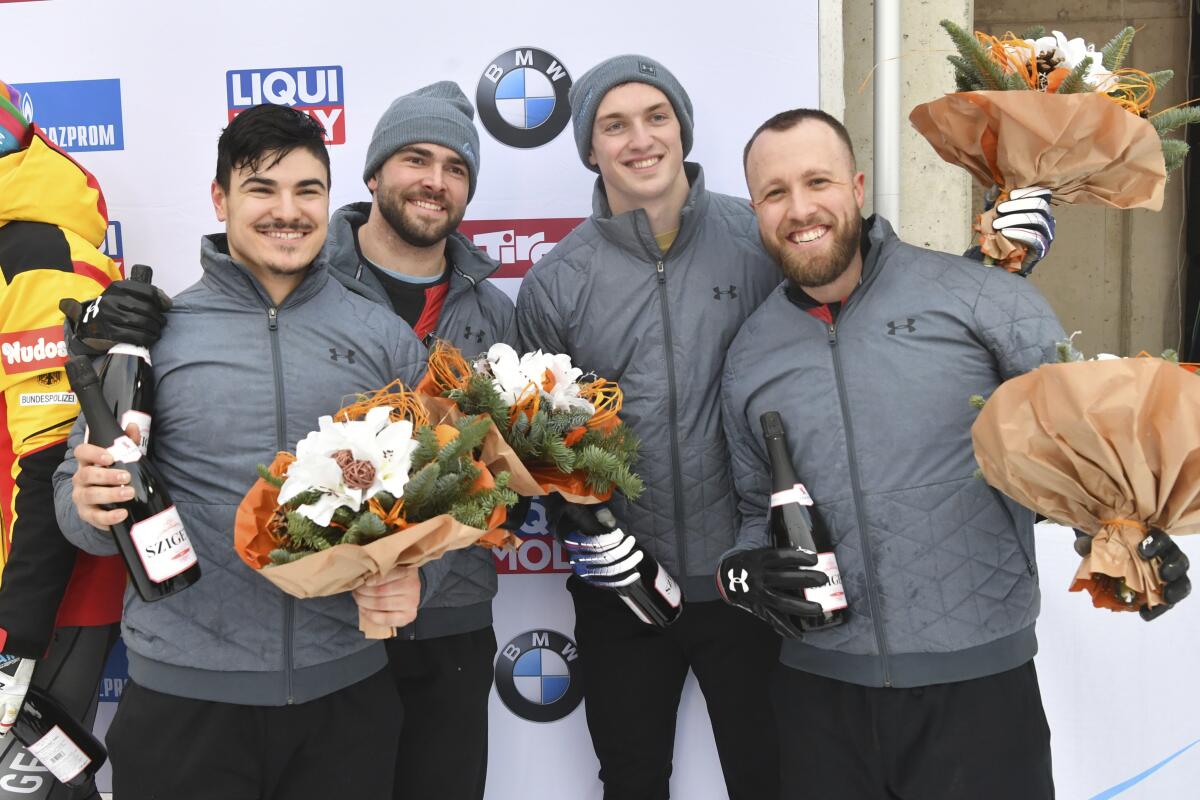
BEIJING — An Instagram ad changed Josh Williamson’s life.
The Florida native didn’t have high expectations when he clicked on a post about a reality show searching for athletes. He was just a 20-year-old former Division I lacrosse player searching for a challenge.
“Next Olympic Hopeful” was it.
Five years after winning the first season of the televised scouting camp, Williamson made good on the NBC show’s catchy name by making the U.S. bobsled team for the Beijing Olympics. He and fellow bobsledder Sylvia Hoffman, who was a contestant in the second season, are the show’s first Olympic success stories and both will make their Olympic debuts this week.
- Share via
Dutch win 3,000-meter short track speedskating
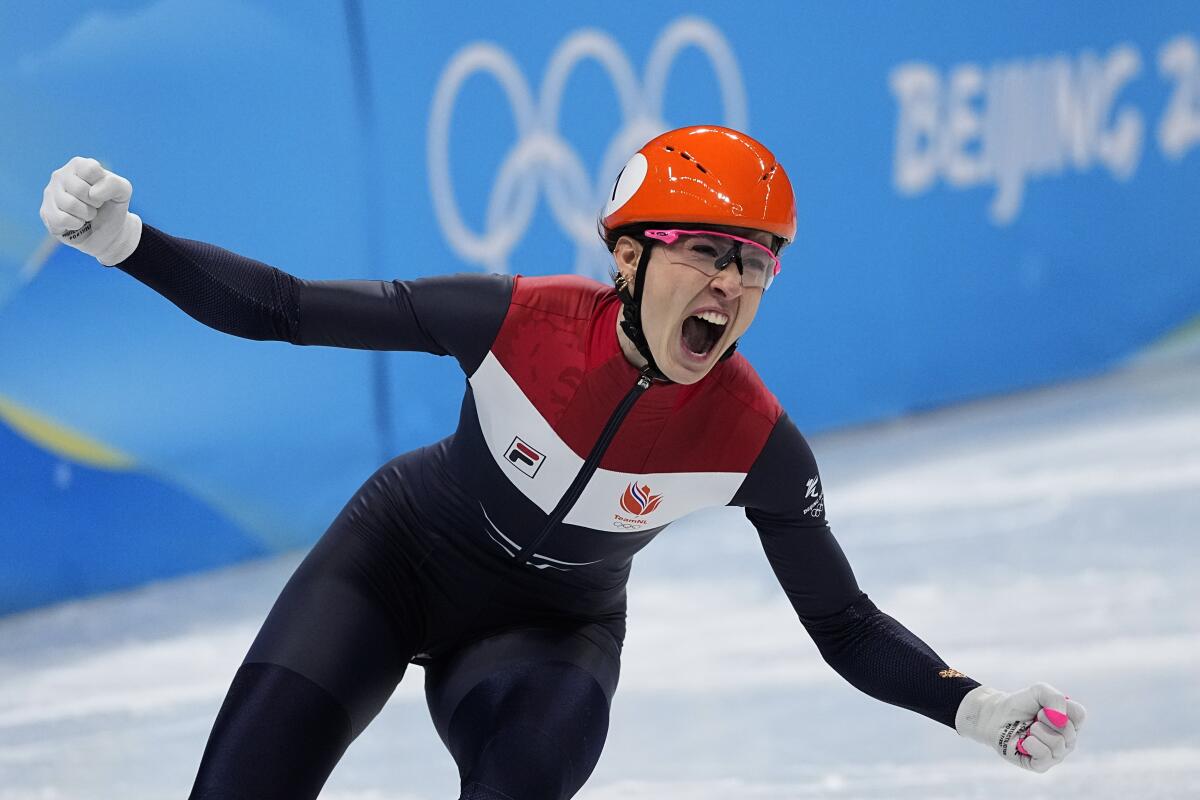
Led by Suzanne Schulting, the Netherlands won Olympic gold in the 3,000-meter relay in short track speedskating.
Schulting collected her second gold and third medal overall in Beijing. She earned silver in the 500 meters and gold in the 1,000.
The Dutch team of Schulting, Selma Poutsma, Xandra Velzeboer and Yana van Kerkhof lowered its own Olympic record with a time of 4 minutes 3.40 seconds at Capital Indoor Stadium.
South Korea rallied to take silver. China earned bronze.
Schulting screamed and raised her arms in triumph after crossing the finish line.
There were no crashes in the four-team final. Canada finished fourth.
In the B final, Italy won with Arianna Fontana skating. The Russians were penalized and the U.S. team was penalized for a lane change that caused an obstruction.
- Share via
France’s Quentin Fillon Maillet wins 12.5-kilometer biathlon pursuit
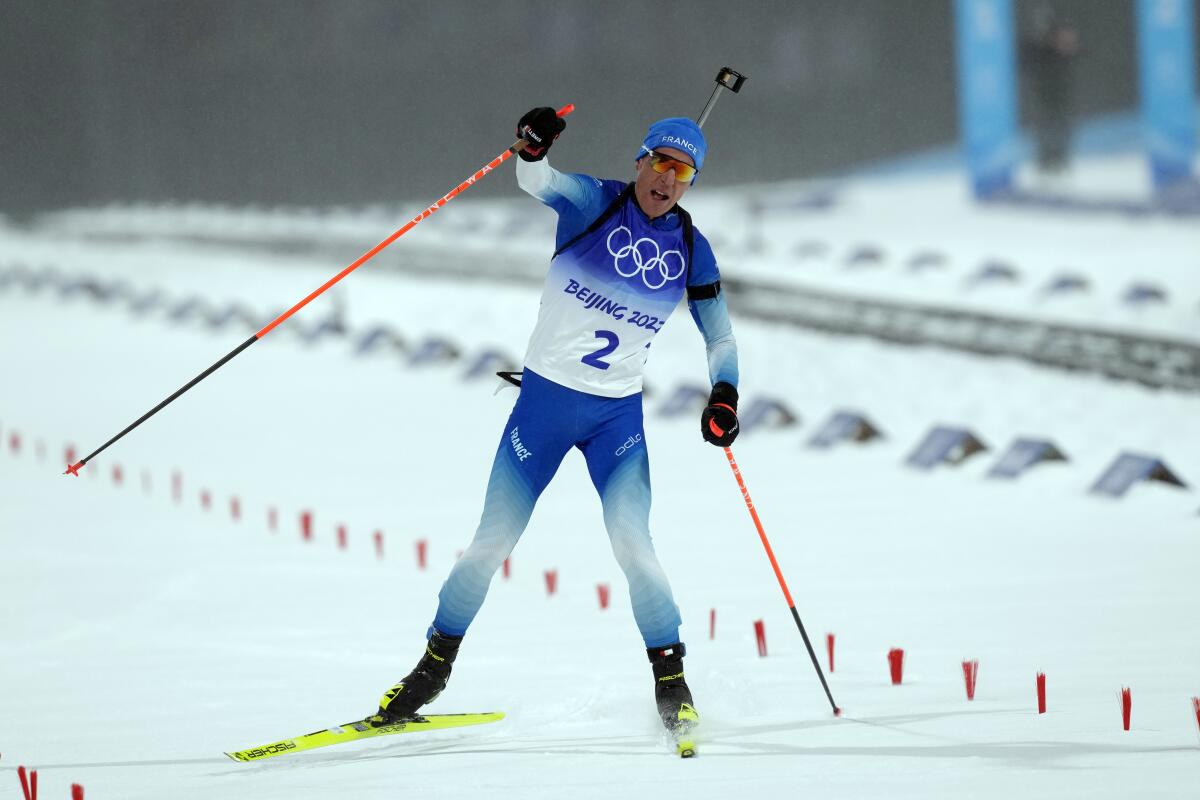
Quentin Fillon Maillet of France hit all 20 of his targets despite howling wind, and he skied to his second gold and fourth medal of the Beijing Games, winning the 12.5-kilometer biathlon pursuit.
Johannes Tingnes Boe of Norway had started off first after winning gold in the sprint, but he missed two targets in his first standing shooting. Fillon Maillet passed him and stayed out front.
Tarjei Boe of Norway was second in the sprint and went off second Sunday. He missed only one target and finished 28.6 seconds behind the Frenchman for the silver medal.
Russian Eduard Latypov also missed only one target and won the bronze.
Fillon Maillet also won gold in the individual race and two silvers, one in the mixed relay and one in the sprint.
- Share via
Marte Olsbu Roeiseland wins her third gold medal
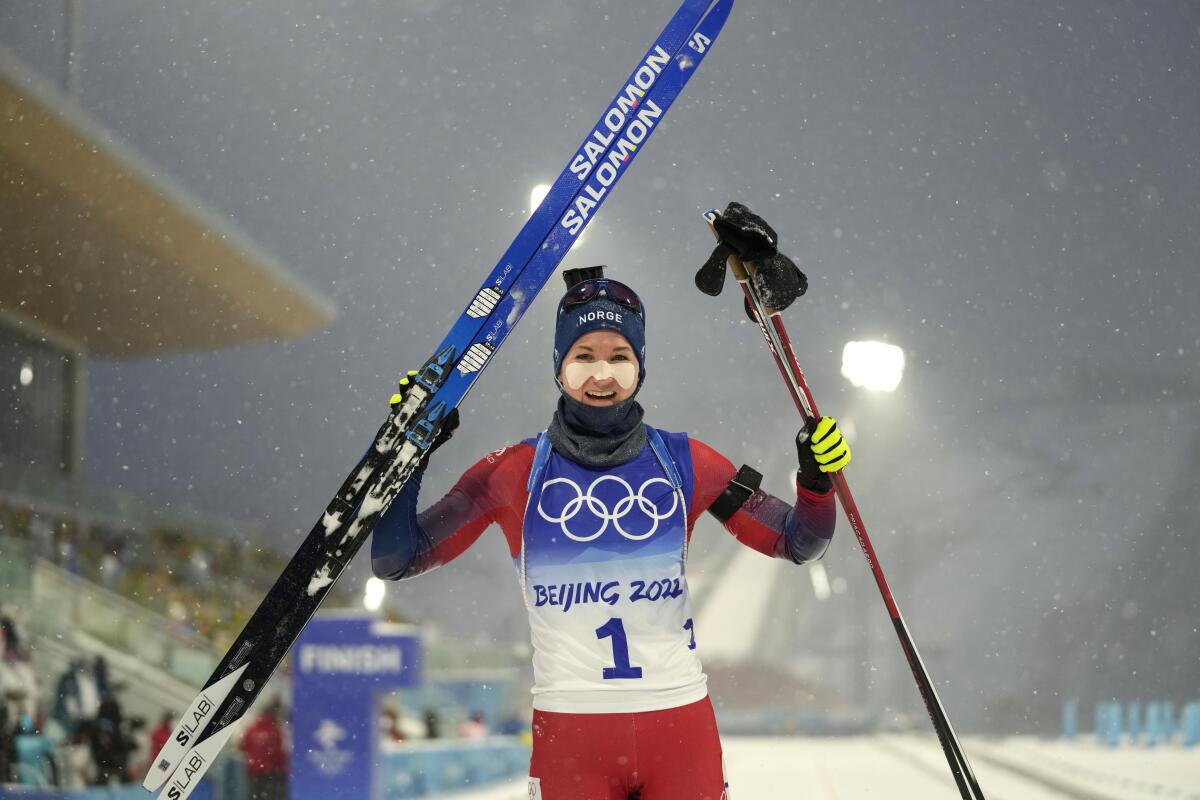
ZHANGJIAKOU, China — Marte Olsbu Roeiseland earned her third gold medal of the Beijing Olympics, and fourth medal overall, by winning the women’s biathlon 10-kilometer pursuit race Sunday.
The Norwegian started the race with a lead because of her win in the sprint race and hit 19 of her 20 targets. Despite strong winds and blowing snow, Roeiseland held her focus and shot cleanly in the last standing stop to win in 34 minutes, 46.9 seconds.
Elvira Oeberg, who was second in the sprint race and started 31 seconds behind Roeiseland, had three misses in her second and third shooting bouts, but cleaned the last standing to finish 1:36.5 behind for silver.
Tiril Eckhoff of Norway also missed three targets but came in 1:48.7 behind her teammate for the bronze medal.
Roeiseland previously won gold in the mixed relay as well as the sprint. She also won bronze in the individual race.
In her first Olympic appearance, Oeberg has won two silver medals. Eckhoff earned her first medal of the Beijing Games.
- Share via
Russian team wins men’s cross-country relay
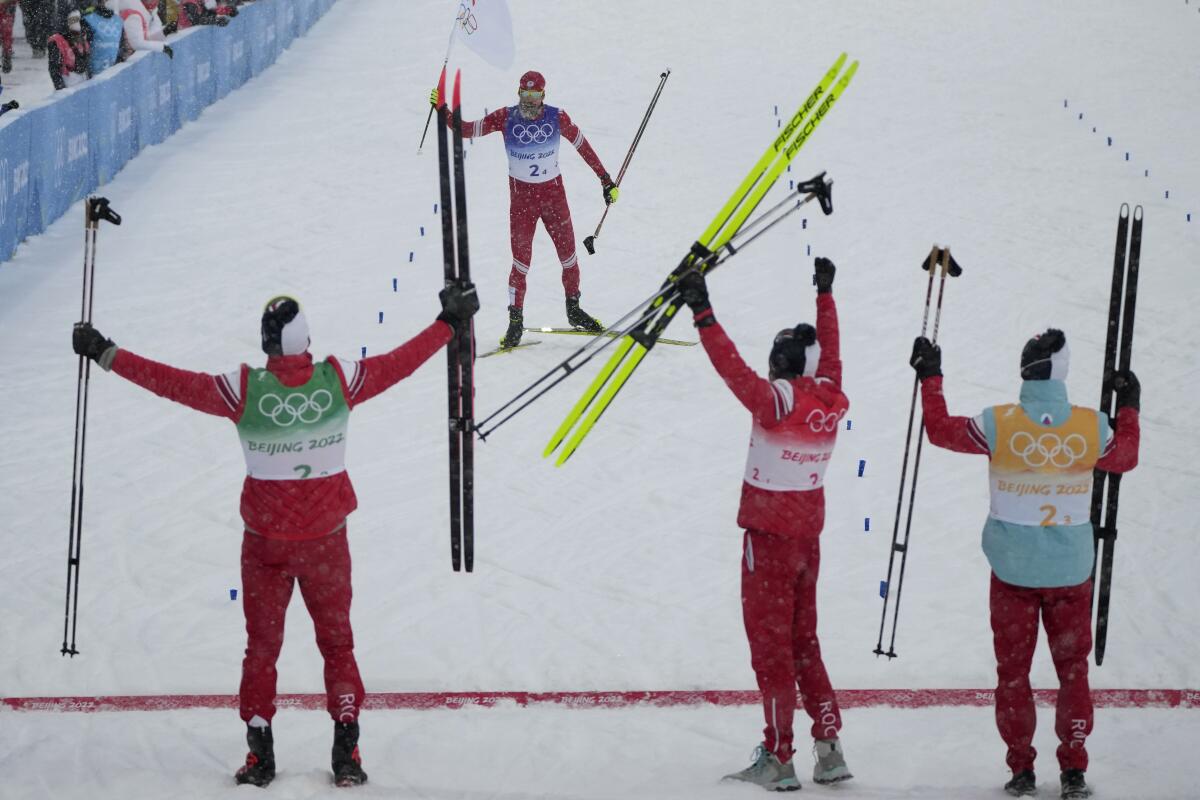
ZHANGJIAKOU, China — Just like in the women’s cross-country ski race, the Russian team opened a lead on the first leg of the men’s relay on Sunday and then held on for the Olympic gold medal.
Sergey Ustiugov maintained more than a minute lead on the last lap over the two-man chasing group of Johannes Hoesflot Klaebo of Norway and Maurice Manificat of France.
Ustiugov grabbed a flag on his way to the finish line and won the 10-kilometer relay 1 hour, 54 minutes, 50.7 seconds. Klaebo pulled away from Manificat for the silver, 1:07.2 back. France took third, 1:16.4 behind the Russians.
Snowy conditions made the ski tracks slow, especially on the first two classic ski legs. Leaf-blowers were used to clear the snow out of the ski tracks. By contrast, the winning time in the four-man relay at the 2018 Pyeongchang Olympics was more than 20 minutes quicker.
Alexey Chervotkin led off for the Russians, with Alexander Bolshunov skiing the second classic leg. Denis Spitsov and Ustiugov took the two freestyle legs.
All four are in the top 12 of the overall World Cup standings.
Norway led off with Emil Iversen, who has not yet raced at the Beijing Olympics and is ranked 42nd in the World Cup standings. Missing from their lineup was Erik Valnes, who is ranked third in the World Cup and finished 15th in the 15-kilometer classic race last week.
Norway’s second skier was Paal Golberg, who was 11th in the 15-kilometer classic race. Hans Chister Holund, who was fourth in that race, skied the third leg ahead of Klaebo.
The same four skiers won gold for Norway in the relay at the 2021 world championships in Germany.
The four-man relay began as a mass-start with 15 racers. Each athlete skied three laps on a 3.3-kilometer (2-mile) course.
- Share via
Marco Odermatt wins the men’s giant slalom
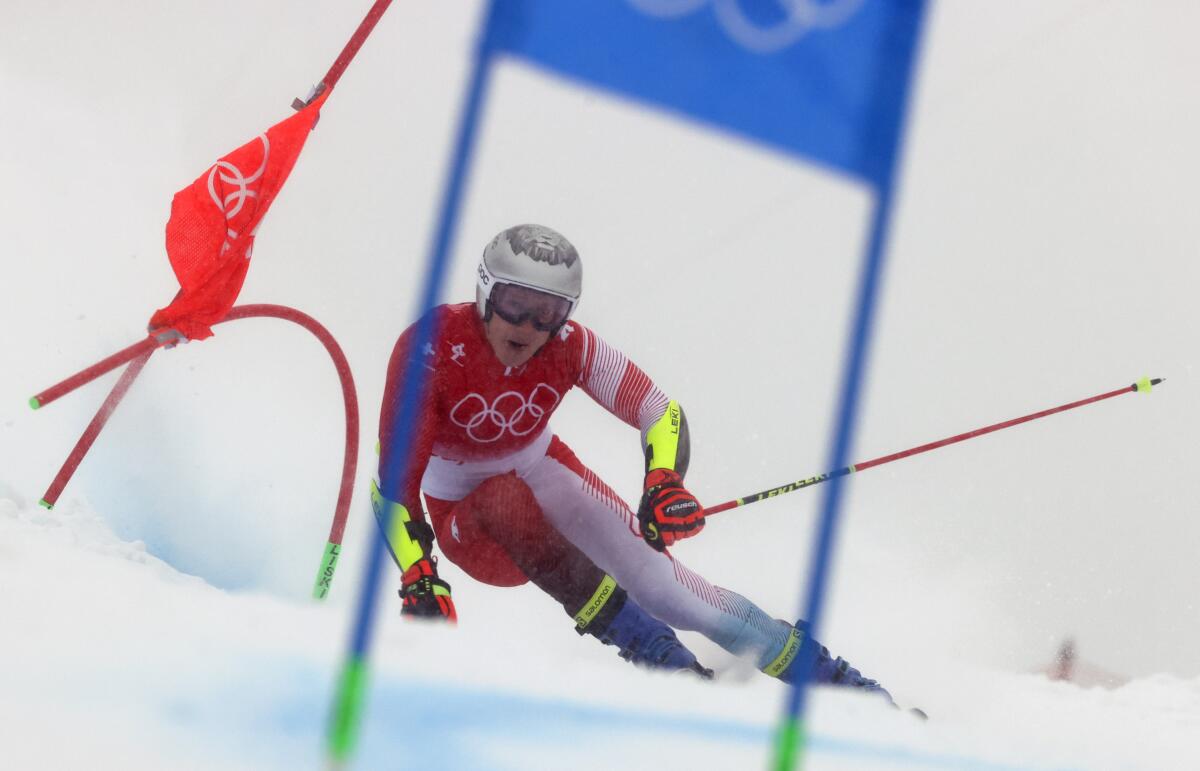
BEIJING — Marco Odermatt has owned the giant slalom this season, and now he owns an Olympic gold medal in the event.
The 24-year-old Swiss skier plowed through snow and poor visibility Sunday to win the men’s giant slalom at the Beijing Games.
“I really risked everything in the second run because I wanted not just the medal, I wanted the gold medal,” Odermatt said. ”It’s difficult because you can lose everything but today it paid off.”
It was the first time snow fell during an Alpine skiing race at this year’s Olympics and the bad weather conditions caused the second run to be postponed by 1 hour, 15 minutes.
“It was a hard day, with the conditions, with such a long wait between the two runs,” Odermatt said. “It was more than five hours for me, it was such a long time to re-think everything and it was hard to stay focused. I tried to sleep some minutes in between.
“I actually never dreamt about it but now it still feels like a dream.”
Odermatt coped with the conditions and the delay — and a first-run mistake — to post an unofficial combined time of 2 minutes, 09.35 seconds.
Zan Kranjec of Slovenia took silver, 0.19 seconds behind, and world champion Mathieu Faivre of France earned bronze, 1.34 behind.
The skiers had been racing and training on artificial snow until the real thing started to fall on Saturday at the Yanqing Alpine Skiing Center. A second women’s downhill training run was canceled because of the conditions on Sunday.
It was the first medal in a major championship for Odermatt, who is competing at his first Olympics. He was seventh in Monday’s downhill and failed to finish the super-G the following day.
Odermatt has dominated in the giant slalom this season, winning four of the five races on the World Cup circuit to lead the discipline standings as well as the overall standings.
He let out a roar after crossing the line on Sunday and raised his ski poles above his head.
Odermatt was fastest in the first run despite having to recover quickly after getting pushed low and off the racing line about 15 seconds in. But Kranjec beat him by more than half a second in the afternoon to leap from eighth and also claim his first medal at a major championship.
Stefan Brennsteiner of Austria was 0.04 behind Odermatt after the first run but he fell with a few gates remaining. He managed to get back on course but finished more than 15 seconds off the pace.
Henrik Kristoffersen, who won silver at the world championships, also almost skied off the course known as The Ice River but managed to catch himself. He had been fourth after the first run but finished eighth, 1.90 behind Odermatt.
Two of the other top eight finishers from the first run — Manuel Feller and Luca De Aliprandini — failed to finish, helping Kranjec move up six places.
- Share via
U.S. in the hunt for Olympic medals as ice dance showcases its newfound vibrancy
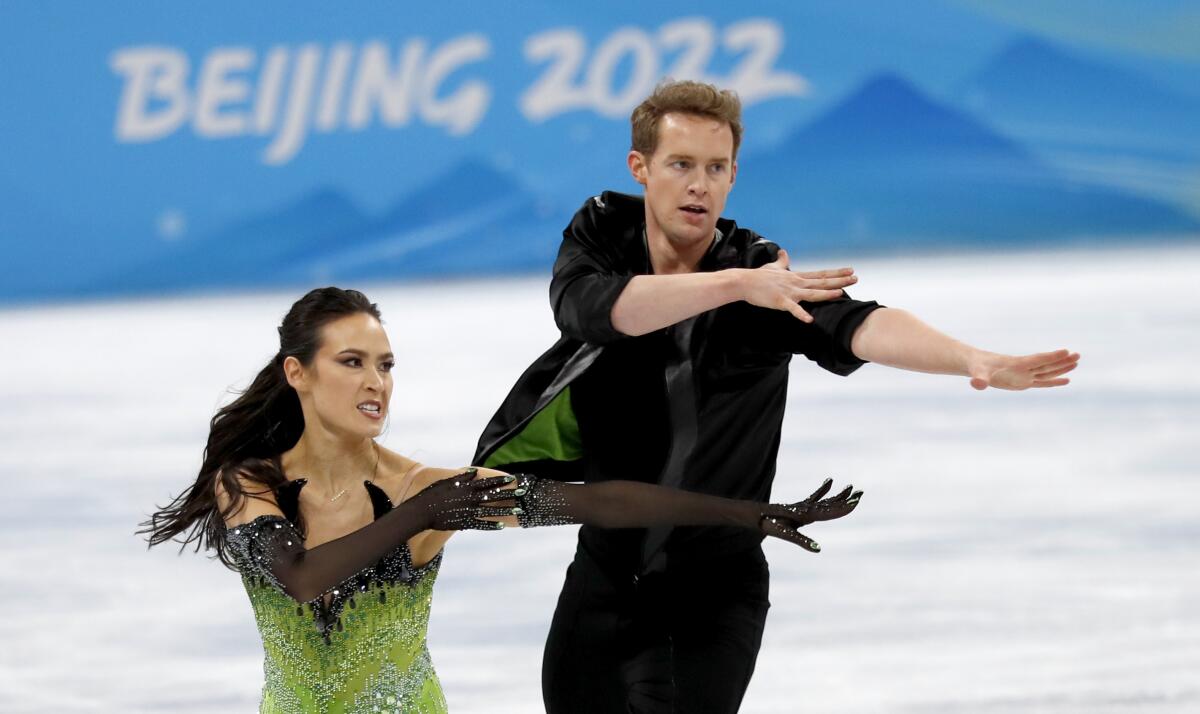
BEIJING — Ice dance has come a long way from the days of sleepy compulsory waltzes and endless repetitions of foxtrots.
The rhythm dance segment of the Beijing Olympics ice dance competition Saturday featured music by Billie Eilish, Rihanna, Janet and Michael Jackson, Tina Turner, Donna Summer and that old standby Elvis Presley, bringing vibrancy and interest to a figure skating discipline that sometimes has been criticized — with good reason — for being garishly over the top.
Ice dance has evolved with the times and has moved forward. French dancers Gabriella Papadakis and Guillaume Cizeron advanced it to another level Saturday with a captivating performance that put them in position to win the gold medal that eluded them four years ago at Pyeongchang after Papadakis’ unfortunate costume malfunction cost them precious points.
Using a form of street dancing called “waacking” as their inspiration and adapting it to their near-flawless technique, Papadakis and Cizeron broke their own world record with a score of 90.38 points. Reigning world champions Victoria Sinitsina and Nikita Katsalapov of the Russian Olympic Committee stood second with 88.85 points, followed by Americans Madison Hubbell and Zachary Donohue with a season-best 87.13 points.
- Share via
Hannah Neise rallies to become first German woman to win Olympic gold in skeleton
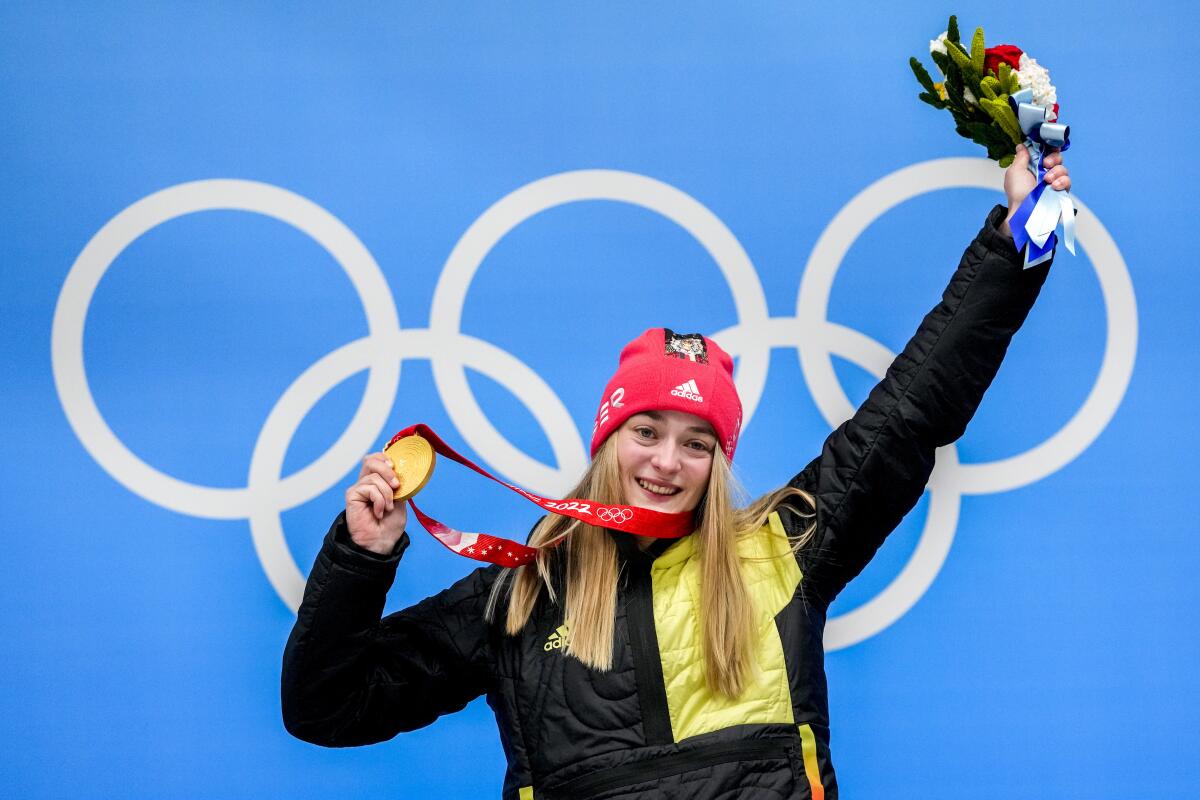
BEIJING — Hannah Neise has never won a World Cup medal. Or a medal at the world championships. Or a medal from the European championships.
She’s got an Olympic medal now.
And it’s the one that everybody wants.
Skeleton has a new champion, and she was a bit of a surprise winner. Neise, the 21-year-old who won the junior world title last year, became the first German woman to capture the gold medal in Olympic skeleton by rallying in the final two heats at the Beijing Games on Saturday.
Her four-run time was 4 minutes, 7.62 seconds. Jaclyn Narracott of Australia — the midpoint leader of the event — won the silver in 4:08.24, and World Cup overall champion Kimberley Bos of the Netherlands took the bronze in 4:08.46.
Neise’s win might have been a bit of a stunner, but at this point, nothing Germany does on this track should be that surprising. After six sliding events at the Beijing Games — four in luge, two in skeleton — the Germans have captured six gold medals.
Oh, and all they have in the four remaining bobsled races — two for men, two for women — are the reigning Olympic champion drivers in Francesco Friedrich and Mariama Jamanka.
Tina Hermann of Germany was fourth and Mirela Rahneva of Canada, the first-run leader, was fifth.
Neise’s win capped a year that was unpredictable in women’s skeleton from the outset. There were eight World Cup races leading up to the Olympics, with five different winners and 11 different medalists — Neise not being one of them.
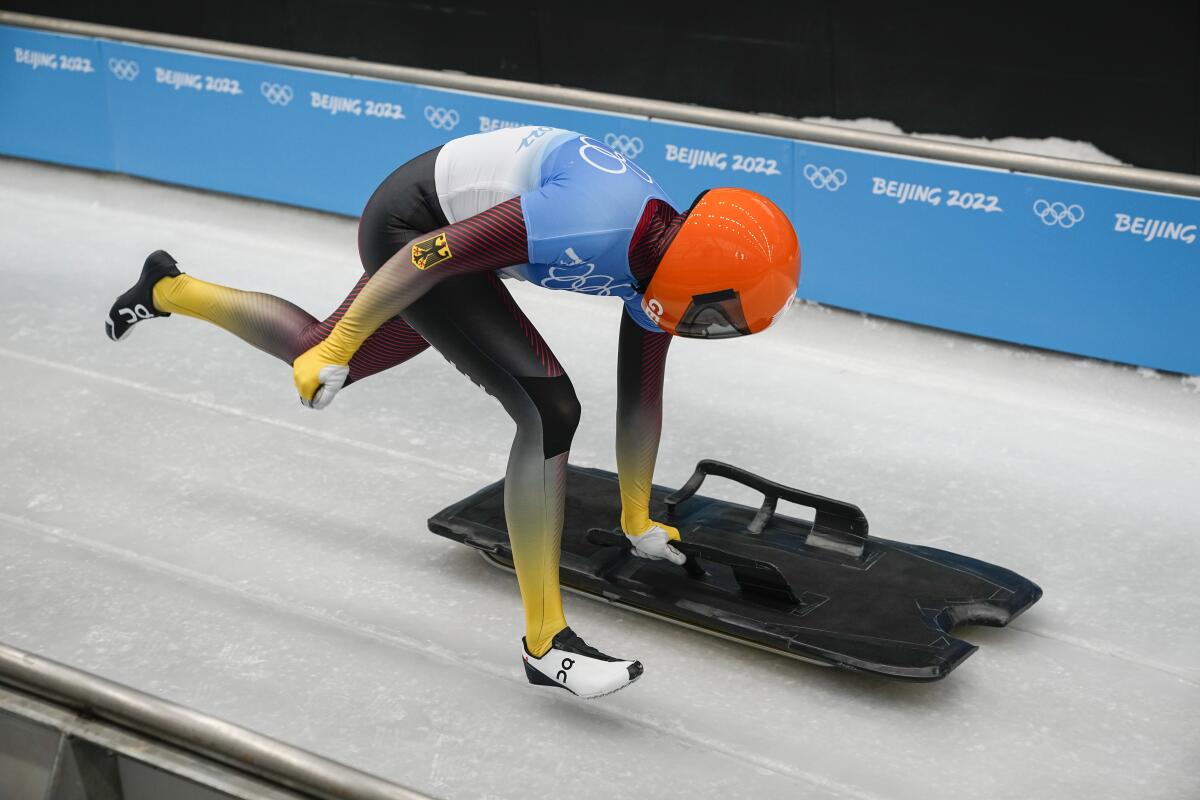
But there was a big hint that she could contend at the Olympics. There was a preseason race at the Yanqing Sliding Center after three weeks of international training this fall, and Neise was second in that event.
Clearly, she figured some things out about the new track faster than most everyone else did.
Katie Uhlaender, racing in her fifth Olympics, was the top American and finished sixth in 4:09.23. Uhlaender strained a muscle in her side before competing Saturday and still moved up two spots from where she was after Friday’s first two runs of the competition.
Kelly Curtis, the other U.S. slider in the field, was 21st.
This was the first time in six Olympic women’s skeleton competitions that a woman from Britain didn’t find her way to the podium. Alex Coomber won bronze in 2002, Shelley Rudman won silver in 2006, Amy Williams took gold in 2010, Lizzy Yarnold won gold in both 2014 and 2018 and Laura Deas captured bronze four years ago as well.
Deas was the top British slider in this race, placing 20th.
Narracott’s medal, though, had a very British feel — and that has nothing to do with Queen Elizabeth II remaining the head of state in 15 Commonwealth countries, including Australia. Narracott spends the season traveling and training with the British team, and her husband is retired British skeleton athlete and 2018 Olympic bronze medalist Dom Parsons.
Narracott was great.
Neise was just better. And the world’s most accomplished nation in sliding just continues to dominate the Beijing Games.
- Share via
Norway’s Marius Lindvik holds off Japan’s Ryoyu Kobayashi to win ski jumping gold
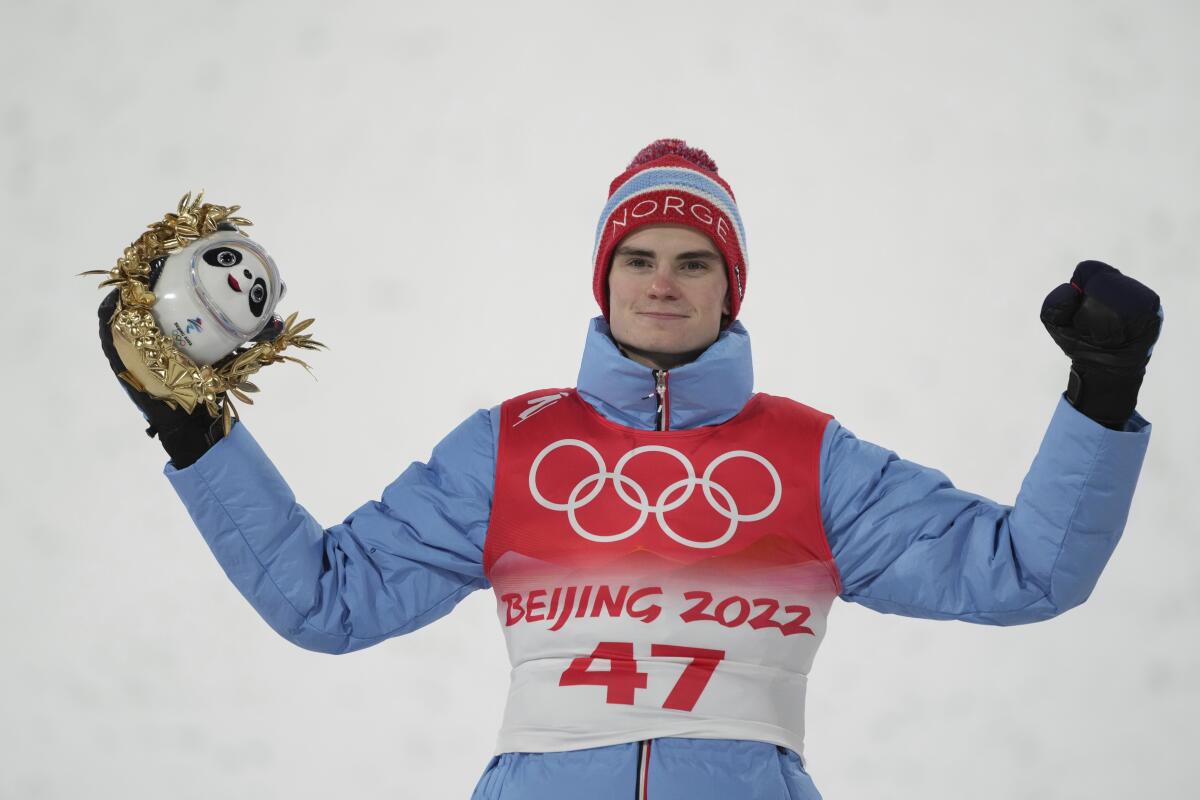
ZHANGJIAKOU, China — Marius Lindvik of Norway won Olympic gold in ski jumping on the large hill Saturday, holding off Ryoyu Kobayashi of Japan.
Lindvik jumped 140 meters (459 feet) on his final jump and earned 296.1 points overall to become the first Norwegian to win the event since Toralf Engan in 1964.
Kobayashi, who won gold on the normal hill on Sunday, earned silver. Karl Geiger of Germany, who is No. 1 in the World Cup rankings, finished third.
Two-time defending champion Kamil Stoch of Poland was fourth, coming up short on his shot to become the first to win three straight Olympic titles on the large hill.
Kobayashi went into the final round with the lead after jumping 142 meters (466 feet) and earning 147 points. Lindvik trailed by only 2.2 points, then soared past him with nearly flawless style.
Two-time gold medalist Andreas Wellinger is unable to compete in China because he tested positive for COVID-19.
Men have been ski jumping at the Winter Olympics since the first edition in 1924, while women did not have access to the sport at the Olympics until 2014.
The men will be back on the large hill on Monday for a team competition. Norway, Germany and Austria have won the last three Olympic team events. The trio of traditional powers will likely contend for medals again, trying to hold off Slovenia and Japan.
- Share via
ROC skater Kamila Valieva’s doping case to be heard Sunday

BEIJING — The Court of Arbitration for Sport has scheduled a hearing via videoconference on Sunday to decide figure skater Kamila Valieva’s eligibility to compete in the women’s singles competition. In a news release, the CAS said it anticipates it will relay its decision to Valieva on Monday, a day before the women’s competition will begin.
Valieva, 15, was provisionally suspended by the Russian Anti-Doping Agency after she tested positive for trimetazidine, a banned substance, in late December during the Russian championships. However, that agency, known as RUSADA, lifted the suspension a day later, on Feb. 9. Valieva competed in the team event and contributed two programs to the gold medal won by the Russian Olympic Committee team. She became the first woman to land a quadruple jump in Olympic competition.
Known for her ability to easily land quadruple jumps that few other women can perform, she holds the records for highest score in the short program, long program and total score and has been considered the favorite to win the singles gold medal.
The International Skating Union, the International Olympic Committee and the World Anti-Doping Agency have filed appeals of RUSADA’s decision to the Court of Arbitration for Sport.
The CAS panel will be headed by Fabio Iudica of Italy. Sports lawyer Jeffrey Benz, who has offices in Los Angeles and in London, and Dr. Vesna Bergant Rakocevic of Slovenia were designated the arbitrators.
The medals for the team event have not been awarded. The U.S. finished second and Japan was third, with Canada fourth. They would all move up a place if the Russian Olympic Committee is disqualified because of Valieva’s participation.
- Share via
Russian team wins women’s cross-country relay
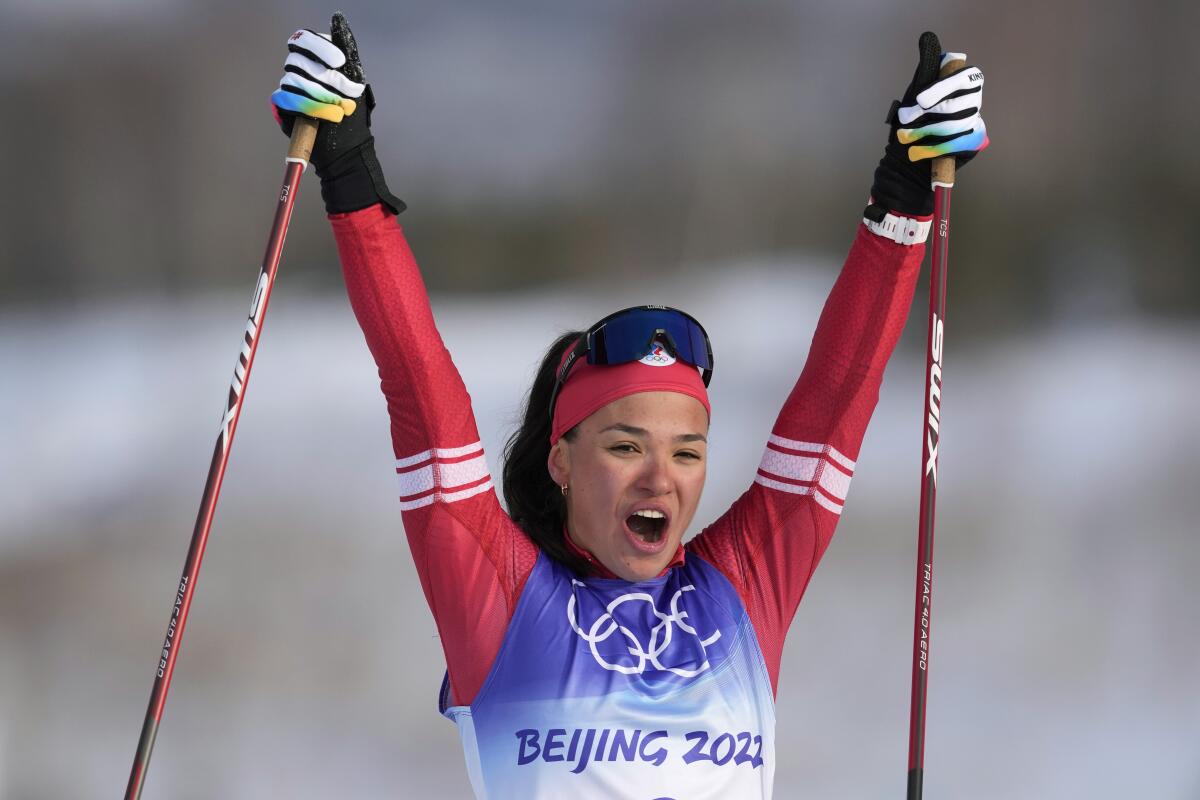
ZHANGJIAKOU, China — The Russian team took the lead at the start of the women’s four-person relay and held on at the end to win another Olympic gold medal in cross-country skiing on Saturday.
Yulia Stupak broke away early with nine women chasing. On the next leg, Natalia Nepryaeva was chased down by Katharina Hennig of Germany.
The Germans briefly took the lead on the last lap, with Russian skier Veronika Stepanova just behind Sofie Krehl. But Stepanova pulled away on the final climb and won in 53 minutes, 41 seconds. Germany took silver, 18.2 seconds behind. Sweden edged Finland for bronze.
“Of course, it is a special day,” Stepanova said. “It was really tough because we have a win in the World Cup, and a lot of people know we can win, so they say, ‘You must win. You must win.’ So I am like, ‘OK, we need a good result,’ and I do what I can do.”
Tatiana Sorina skied the third lap for the Russian team, which is competing at the Beijing Games under the acronym ROC — short for Russian Olympic Committee.
Despite settling for silver, Krehl was satisfied.
“Maybe I need some time and then I can recognize what we have done,” the German said. “Of course it’s a surprise, but we all had really good races the last [few] days.”
The four-person relay began as a mass-start with 18 racers. Each woman skied two laps on a 2.5-kilometer (1.5-mile) course. The first two skiers raced in the classic style and the last two in freestyle.
Norway ended up in fifth place, just ahead of the United States in sixth. Therese Johaug, who already has won two gold medals at the Beijing Games, briefly brought the chase group closer to the leaders but she couldn’t catch them.
On the first lap, Tiril Udnes Weng of Norway fell and lost some time.
“So I tried to do the best with the position I had,” Johaug said. “I tried to reach both Sweden and Finland, but Russia and Germany, they were the strongest today. Anyway, it’s relay.”
Johaug won gold in the skiathlon and the 10-kilometer race. She also won gold in all three events at the 2021 world championships, plus the 30-kilometer mass start race. She said she is setting her sights on that one next.
The gold was the Russian team’s second in cross-country skiing at the 2022 Games. Alexander Bolshunov won the men’s skiathlon.
In the 2018 Olympic relay, Norway took gold, followed by Sweden and the Russian team. Finland was fourth. The only Norwegian from that gold-medal team racing in the relay on Saturday was Ragnhild Haga.
The Americans finished 1:28.2 behind the Russians. Jessie Diggins praised her U.S. teammates for their performance.
“Personally I’m really, really proud of this team,” Diggins said. “Every single one of these girls went out and skied so hard and skied gutsy races and we gave it everything we have. Some days that ends up being the results of your life and some days it doesn’t.”
- Share via
Johannes Thingnes Boe of Norway wins the biathlon sprint race
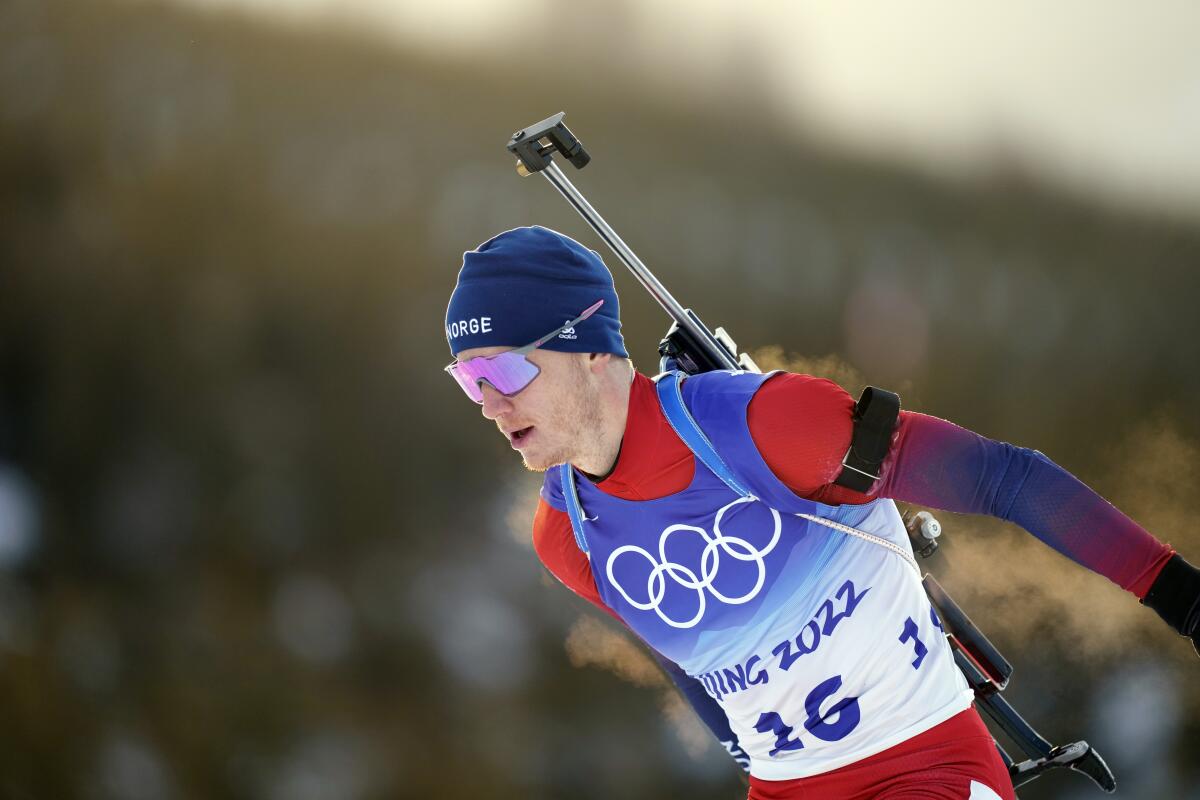
ZHANGJIAKOU, China — Johannes Thingnes Boe of Norway skied fast enough to overcome a missed target and win the Olympic gold medal in the biathlon sprint race Saturday.
Boe covered the 10-kilometer course in 24 minutes, 0.4 seconds to win his third medal of the Beijing Games. He also took gold in the mixed relay and bronze in the individual race.
Quentin Fillon Maillet of France also missed one target but couldn’t match Boe’s speed, finishing 25.5 seconds behind for silver. Fillon Maillet won gold in the individual and silver in the mixed relay — out-sprinted by Boe. He’s also the overall World Cup leader.
Tarjei Boe, also with a single miss on the day, took bronze, 38.9 seconds behind his younger brother. Maxim Tsvetkov of the Russian team shot clean but finished 40.6 seconds behind in fourth.
Sebastian Samuelsson of Sweden, the World Cup sprint leader, missed one target and finished fifth.
Boe dominated the sprint races for three seasons but has struggled this year. He won one sprint race in France and was third in another. His success at this year’s Olympics make him a favorite for the upcoming pursuit and mass-start races.
- Share via
China’s Gao Tingyu wins men’s 500 meters in speedskating
BEIJING — Gao Tingyu thrilled the home crowd by becoming the first Chinese man to claim an Olympic gold medal in speedskating, winning the 500 meters on Saturday.
Gao added to the bronze medal he took in the 500 at the 2018 Pyeongchang Games.
Zhang Hong had been the only Chinese gold medalist at the oval. She won the women’s 1,000 eight years ago in Sochi.
Now, she’s got company.
Gao skated in the seventh of 15 pairs, setting an Olympic record of 34.32 seconds. Then he waited nervously on the infield as 16 other skaters took aim at his time.
None could beat it. Gao knew he had at least a medal after the next-to-last pair crossed the line.
But the real celebration began when the final group finished.
Gao was engulfed by his teammates and coaches. He then grabbed the red Chinese flag and sprinted around the inside of the track as the socially distanced fans roared their approval.
When he got next to the finish line, Gao stopped and let out a scream that could be heard throughout the only new venue built in Beijing for these pandemic-marred games.
The silver went to South Korea’s Cha Min Kyu, whose time of 34.39 gave him a matching medal to the one he earned four years ago in Pyeongchang.
Wataru Morishige of Japan took the bronze in 34.49.
Defending Olympic champion Haavard Lorentzen of Norway didn’t come close to repeating. He finished 15th in 34.921 — more than a half-second off his Olympic-record time of 34.41 at the 2018 Pyeongchang Games.
Reigning world champion Laurent Dubreuil just missed out on the podium, finishing fourth in 34.552. He shook his head dejectedly when he saw the time on the scoreboard.
The top American finisher was 17-year-old Jordan Stolz, who was 13th in 34.85.
- Share via
Shaun White goes from Beijing to the Super Bowl
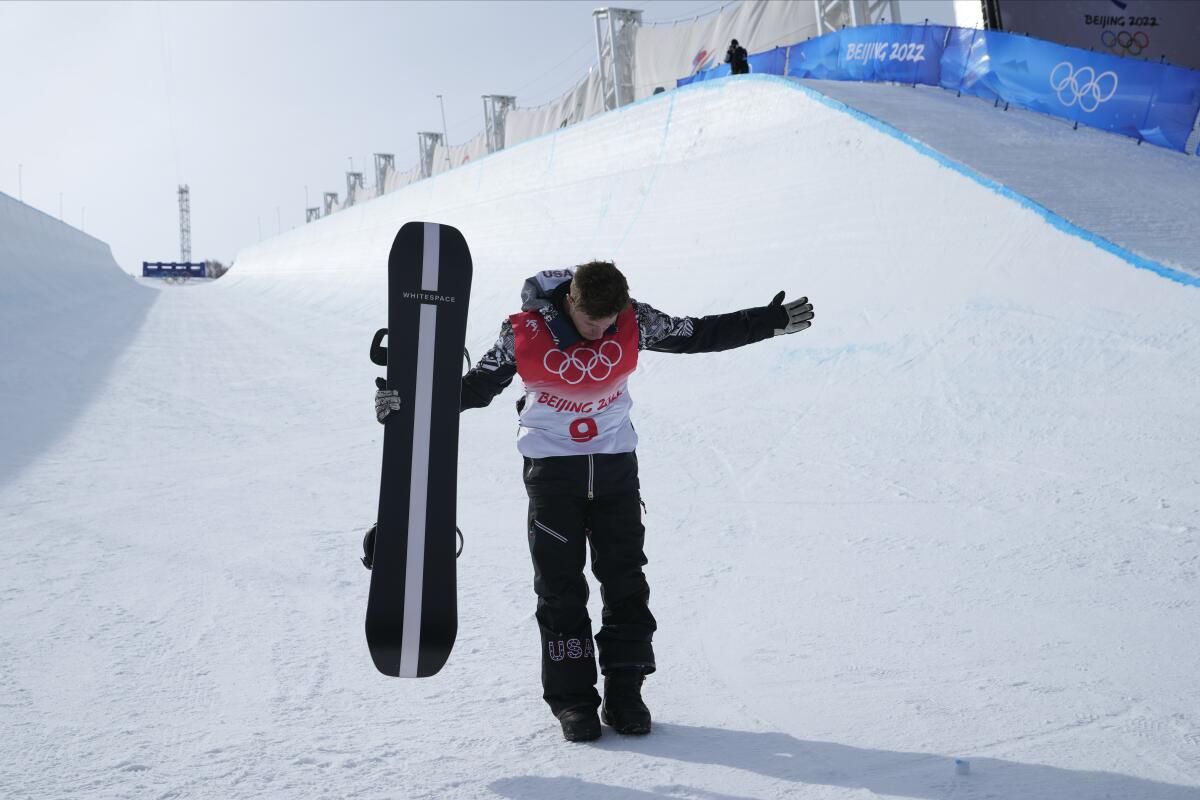
ZHANGJIAKOU, China — Shaun White’s next big contest — the Super Bowl.
Less than 24 hours after snowboarding’s global icon took his final competitive halfpipe ride at the Olympics, he was bound for the airport. The destination: Los Angeles to watch his first Super Bowl in person.
White said his girlfriend, actress Nina Dobrev, has been suggesting he get busy making a list of things he wants to do in retirement “so I’m not sitting around twiddling my thumbs.”
“I’ve been to the house parties and stuff. Never been to the game, so I’m excited to check that off the list,” White said in a phone interview with the Associated Press, as he rode to Beijing on Saturday to catch a late-night flight.
After that, he’ll take some time to relax.
The build-up to his last contest, then the tear-stained aftermath of his fourth-place finish, have been an emotional roller coaster for the three-time champion.
“I woke up this morning and I just felt this peacefulness,” White said. “It was amazing to know I have so much ahead of me.”
White said his phone has been blowing up — all of it supportive. And though no single athlete has meant more to the sport of snowboarding than the 35-year-old Californian, he conceded he had been nervous about what kind of reaction he’d get.
“As a competitor, I always wanted to be on the podium and I didn’t know if people would still respect my legacy,” he said.
He put down a solid run to get into medal contention, but with a chance to move up one spot and land on the podium, his legs grew weak and he fell as he tried the second of back-to-back 1440s — one of the toughest combinations in the sport.
The less-than-perfect performance, his emotional reaction to it, and even his worries about what others would think — all of that revealed the softer side of White, who grew from “The Flying Tomato” to a multiplatform sports and business icon in front of the world’s eyes. The past week in the mountains above Beijing has triggered an outpouring of feelings along every step of the way.
Any second thoughts about his decision to hang it up?
“The initial competitive reaction was, ‘Oh, I almost had the podium and I want to come back and try that again,’” White said. “It’s one of the things that’s driven me to be one of the best in sports. But I think I’m going to enjoy this new lifestyle much better.”
Dobrev praised her boyfriend on social media, saying: “You will forever be the G.O.A.T. of snowboarding. Not to mention you are also the G.(B).O.A.T. = Greatest Boyfriend Of All Time.”
“I couldn’t be more proud. Of everything you have accomplished over the last 20 years as a competitor and the man you have become,” she wrote.
White’s next chapter will include a dive back into business.
He has combined with his brother, Jesse, to launch a new snowboard brand, Whitespace. He said a first run of snowboards sold out online in 15 minutes. White is also owner of a music-and-competition event, Air & Style, which could get fresh legs if COVID-19 subsides.
White said one of his realizations as he weighed whether to retire was that “instead of beating these guys out here, I want to start sponsoring them.”
He’s still figuring that part out. He said offering advice and helping a few young riders find their way in the sport is intriguing. A dip into coaching — at least in the way that his buddy and coach, 2002 bronze medalist J.J. Thomas, is doing it — might take a little longer.
“I would need time before I did something like that, and it would have to be a very special situation,” White said. “But definitely supporting in some capacity would be very enjoyable, I think.”
But before that, some rest.
Even for a megastar used to traveling the globe, the last four months have been a lot. There was a long stretch in Europe for training, which also led to the decision to retire.
There was a hectic swing through qualifying events, which were hampered by an ankle injury, a bout with COVID-19, a broken binding in one contest, then a quick unexpected trip to Switzerland to secure his spot on the team.
And then China. It was not an easy trip for anyone, and for White, it was made all the more hectic — and emotional — because the spotlight was shining on the final performance of his one-of-a-kind career.
“Advice I’ve got from others is ‘Just take a second,’” White said. “I just want to take a pause and really soak in this moment, everything I’ve done and earned and enjoyed, and then see what sparks my interest.”
- Share via
U.S. defeats Canada in men’s hockey 4-2
BEIJING — Building their roster around college kids, while giving those kids enough freedom to be creative and enough structure to feel secure, paid off again with a victory for the U.S. men’s Olympic hockey team.
A clever backhander by Brendan Brisson of Manhattan Beach and the University of Michigan held up as the winning goal Saturday as the U.S. defeated Canada 4-2 in preliminary-round play at National Indoor Stadium and improved to 2-0. Brisson, drafted 29th by the Vegas Golden Knights in 2020, is one of 15 college players on the U.S. roster. They’ve brought enthusiasm, energy and impressive skills to a team that’s coming together more cohesively than they might have imagined when the withdrawal of NHL players in December left little time to create and execute a Plan B.
“We have a really good coaching staff, and all the older guys have been really important to us so far, just teaching us things,” said Brisson, a former L.A. Junior King. “And it’s all about just dialing in, knowing where to be on the ice and just trusting the process.
“You grow up watching the Olympics and imagine scoring a goal and winning games here. It’s just been amazing so far.”
- Share via
New coronavirus cases continue to be limited at the Beijing Games
BEIJING — Winter Olympics organizers reported eight new coronavirus cases Saturday as the spread of the virus continues to be limited within the Games’ bubble.
This is the fourth time in the last five days that reported cases have been in the single digits.
There have been 426 cases since Jan. 23 — 258 from mandatory testing on arrival at Beijing Capital International Airport and 168 from daily screening in the bubble.
Of the positives, 168 came from athletes and team officials with the rest from the wide-ranging “other stakeholders” group that includes media members and volunteers.
- Share via
Mikaela Shiffrin clocks ninth-fastest time on first day of downhill training
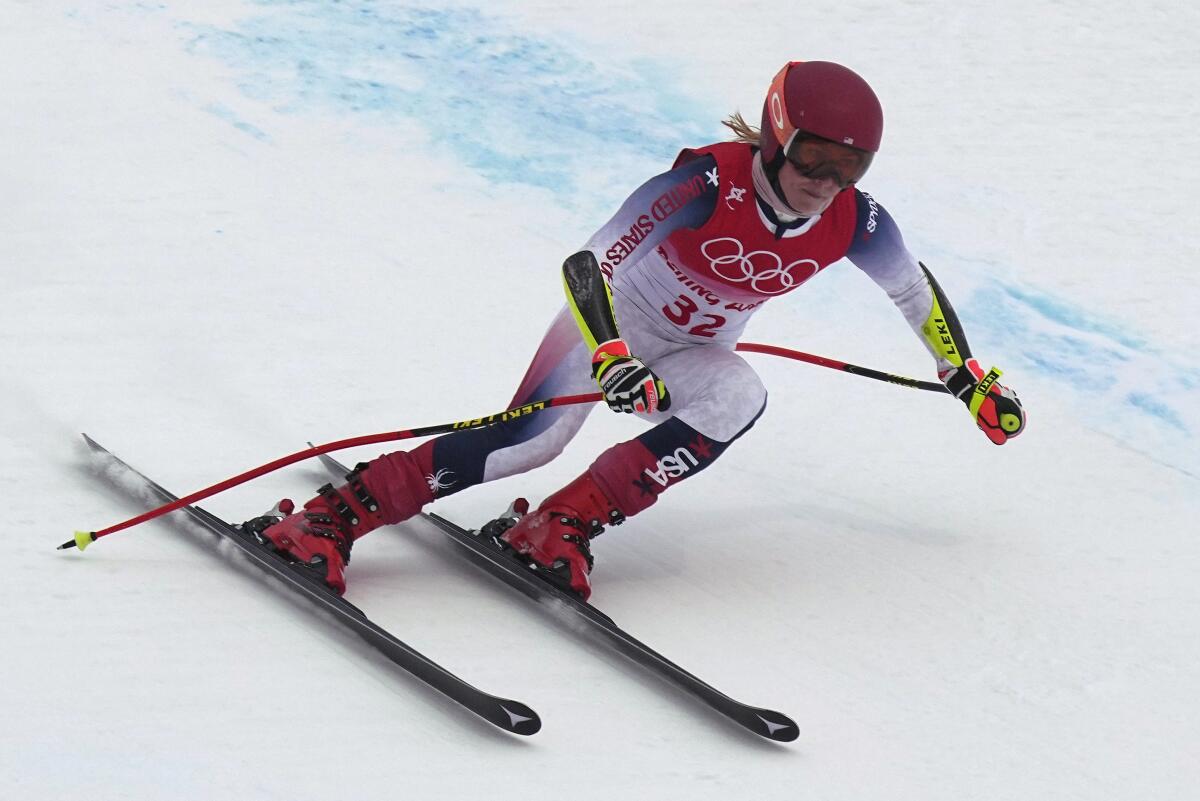
BEIJING — Mikaela Shiffrin clocked the ninth-fastest time during the first day of women’s downhill training at the Yanqing National Alpine Center on Saturday.
She finished the Rock course in 1 minute, 34.80 seconds — 1.33 seconds off the pace of Switzerland’s Priska Nufer, who recorded the day’s top time.
Shiffrin placed ninth in the super-G on Friday after not finishing her first two races at the Winter Olympics. Another downhill training session is scheduled for Monday before the final Tuesday.
“I haven’t decided for sure,” Shiffrin said of the final. “Today gives me a bit more positivity. I would love to race this downhill, so that’s the plan.”
The U.S. is without its top medal threat in the event, Breezy Johnson, who is missing the Games after sustaining a knee injury during training last month.
Italy’s Sofia Goggia, the defending gold medalist in the downhill and top-ranked World Cup competitor in the event, was 12th in the training session. She is still recovering from a knee injury last month, leading to her skipping the super-G.
- Share via
Jacobellis, Baumgartner win mixed team snowboard cross gold medal
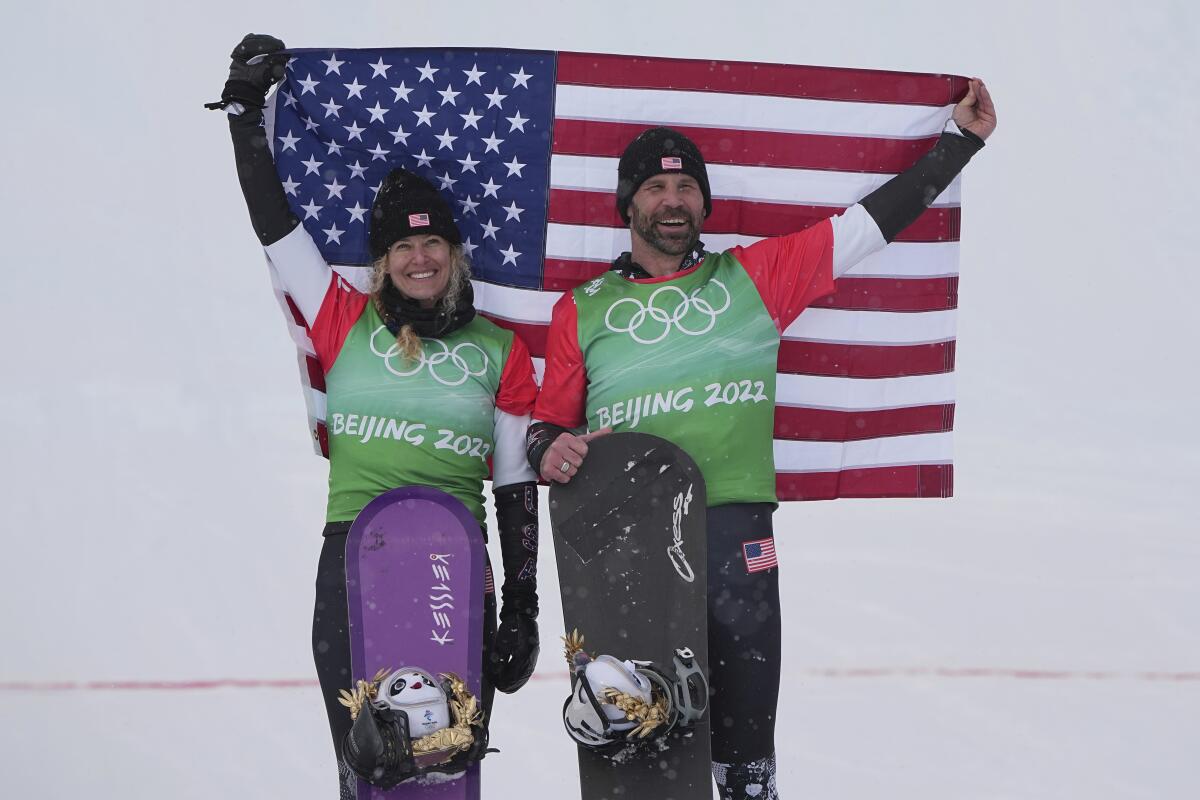
BEIJING — In four Olympics, Nick Baumgartner was missing just one thing.
“One of these medals,” he said tearfully after a 10th-place finish in men’s snowboard cross on Thursday.
He finally got it two days later. The 40-year-old who is the oldest American snowboarder in Olympic history earned his first Olympic medal Saturday, taking gold with Lindsey Jacobellis in mixed team snowboard cross at Genting Snow Park.
Jacobellis, a five-time Olympian who finally earned her elusive gold medal this week, crossed the finish line first in the relay race-type event that was making its Olympic debut.
- Share via
COVID isolation behind her, Elana Meyers Taylor is ready for monobob’s Olympic debut
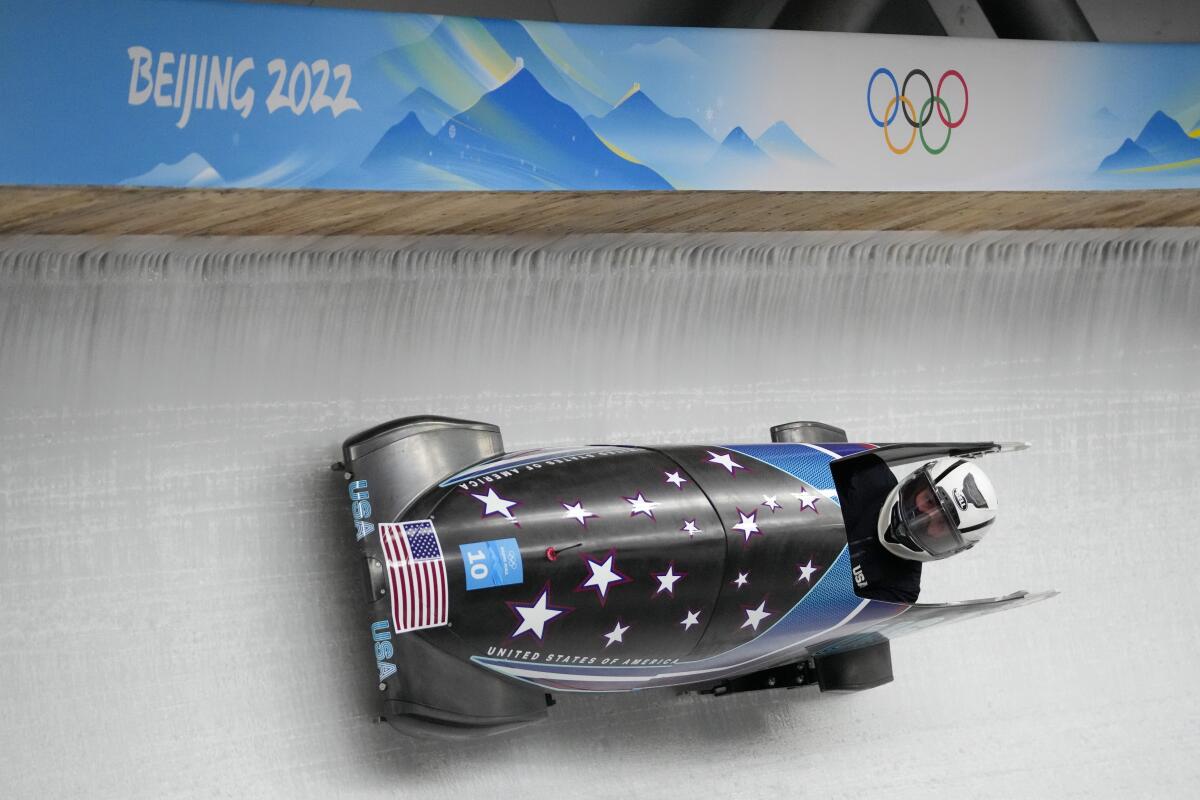
BEIJING — Elana Meyers Taylor was ready. The three-time Olympic medalist who was elected by her peers to carry the United States flag during the opening ceremony pulled on a red, white and blue jacket, white pants, red boots and a blue beanie. The only thing missing from the bobsledder’s ensemble was the flag she was meant to carry.
That accessory was instead in the hands of Brittany Bowe and John Shuster.
Sitting inside an isolation hotel, Meyers Taylor missed the opening ceremony because of a positive coronavirus test. She said she couldn’t imagine a greater honor than being elected flag bearer, but she watched on television as Bowe, a speedskater who carried the flag with Shuster on Meyers Taylor’s behalf, lead U.S. athletes into Beijing National Stadium.
It was only the latest hurdle in the star bobsledder’s path to her fourth Olympics, but after learning to balance life as a new mother and elite athlete during a pandemic, the three-time medalist isn’t stopping for anything.
The 37-year-old is set to compete in the inaugural Olympic races of women’s monobob, which begin on Sunday at Yanqing National Sliding Center. Meyers Taylor, the reigning monobob World Cup winner, is a favorite to medal, along with rival-turned-teammate Kallie Humphries.
- Share via
Nathan Chen’s path to Olympic gold wound through Southern California
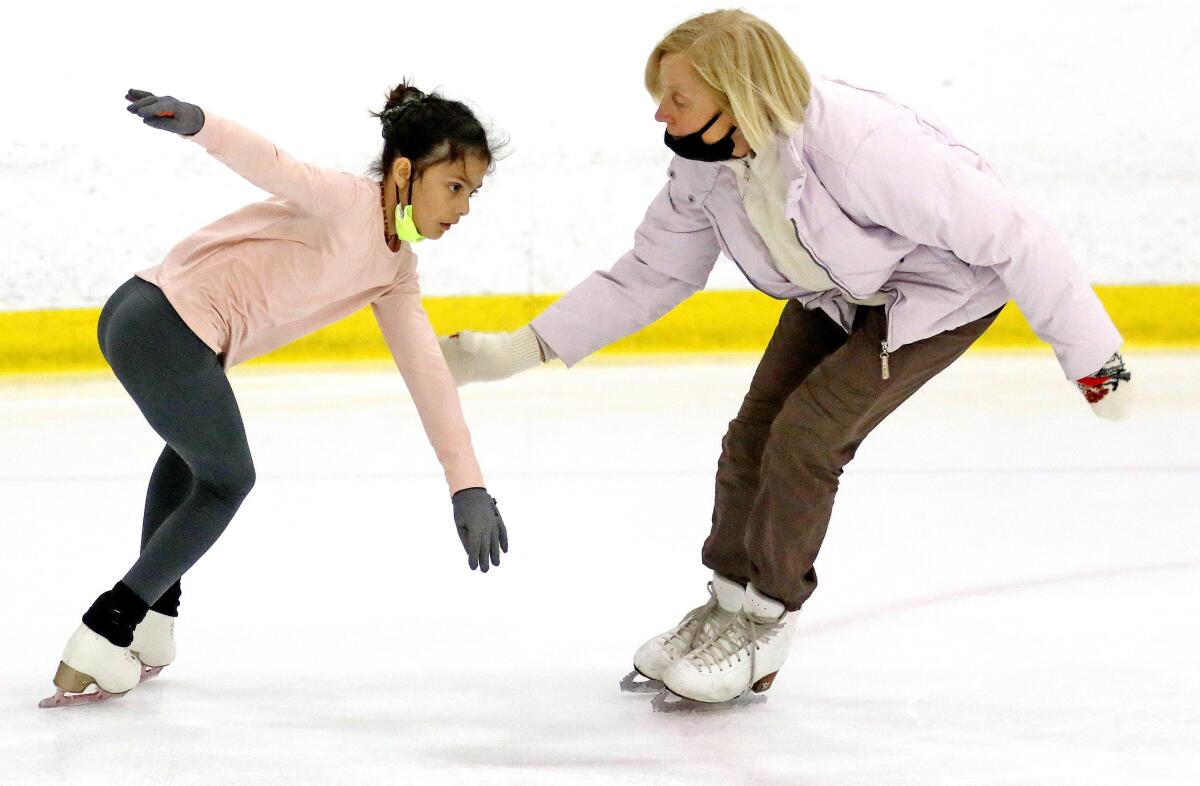
The ice rink in Irvine, now a well-scraped path to the Olympics, seems frozen in time. Notecards wish Nathan Chen, a regular there, good luck and young skaters swivel to the beat of their coaches’ instructions.
Chen, 22, won a gold medal at the Olympics in Beijing a day earlier, cementing his spot as the top men’s figure skater in the world and the first U.S. man to win gold since 2010. It was a redemptive victory — Chen finished in fifth place at the 2018 Pyeongchang Olympics — that many of his coaches and family members were unsurprised by.
“Last Olympics, he was very technical already, very good in the artistic part,” said Vera Arutyunyan, one of Chen’s coaches, at the Great Park Ice rink where she was leading a handful of young skaters in practice on Thursday.
“He’s different now,” she said. “He’s more mature, he’s a real artist on the ice.”
Great Park Ice, a sprawling, warehouse-like complex the length of two football fields houses four rinks and is home to five Olympians currently at the Olympic Games. The facility, which opened in 2019, is nestled between a residential neighborhood and the massive Great Park outdoor recreation area, not far from the office towers and industrial parks of Irvine.
At around age 12, Chen, then a dedicated ice skater who got into the sport watching his siblings play hockey, convinced his mother that they should move to Southern California from their family home in Salt Lake City. He wanted to turbocharge his training by working with a renowned figure skating coach, Rafael Arutyunyan, now Chen’s main coach and husband of Vera.
In addition to Chen, U.S women’s figure skater Mariah Bell, Czech men’s skater Michal Brezina and U.S. pairs skaters Alexa Knierim and Brandon Frazier all train at the facility, under the tutelage of Rafael Arutyunyan and his team.
- Share via
U.S. women’s hockey is through to quarters but struggling to convert scoring chances
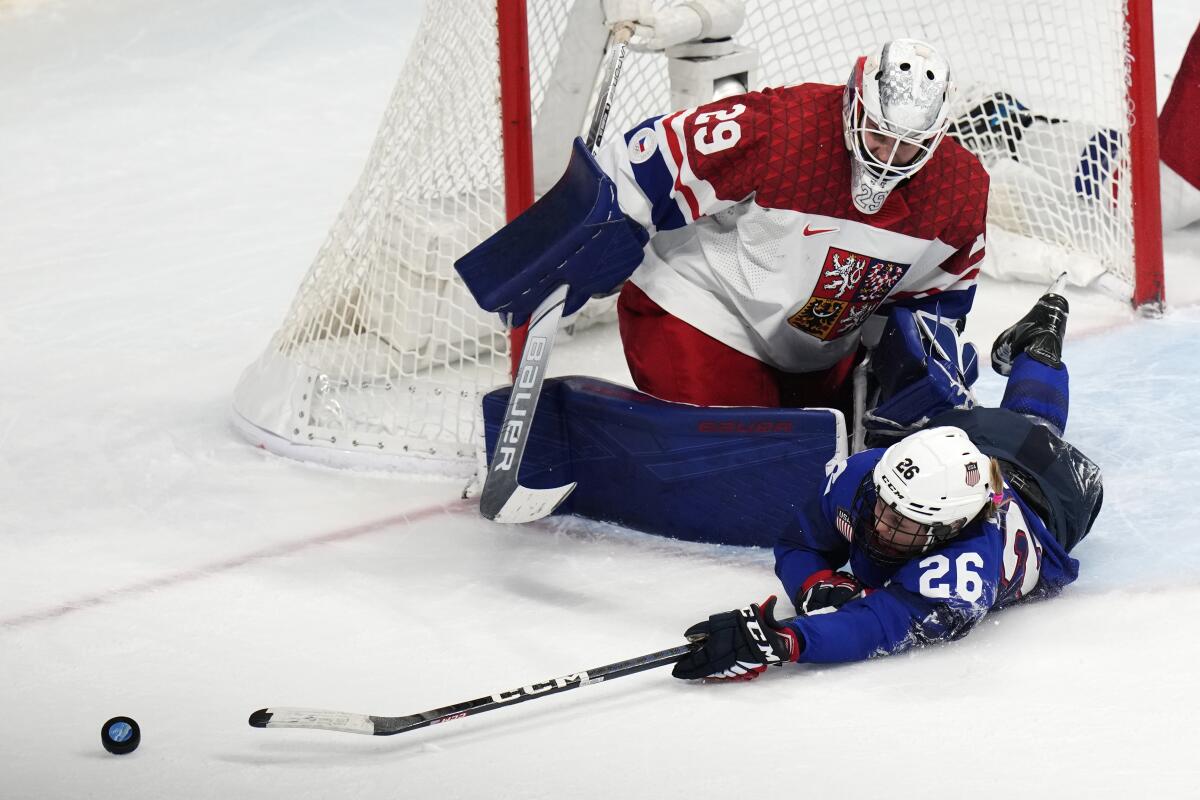
BEIJING — A good goaltender can be a great equalizer. Members of the defending champion U.S. women’s hockey team were harshly reminded of that on Friday when they were repeatedly stymied by Czech goalie Klara Peslarova and needed a lucky deflection to rally from a second-period deficit against an Olympic newcomer.
A long shot by U.S. defenseman Lee Stecklein glanced off the stick of Czech forward Michaela Pejzlova and past Peslarova to break a tie at 6:49 of the third period, allowing the Americans to exhale and claw out a 4-1 victory at Wukesong Sports Centre. At no point was it easy: The Americans took 59 shots on goal but didn’t put it away until Savannah Harmon scored a rare power-play goal at 16:51 and team captain Kendall Coyne Schofield scored into an empty net with 5.6 seconds left.
“We had nothing to lose,” said Czech forward Denisa Krizova, who honed her skills at Northeastern University in Boston. “This is what we’ve dreamed of for a long time.
- Share via
Olympic athletes deal with expectations, which leads to crushing pressure
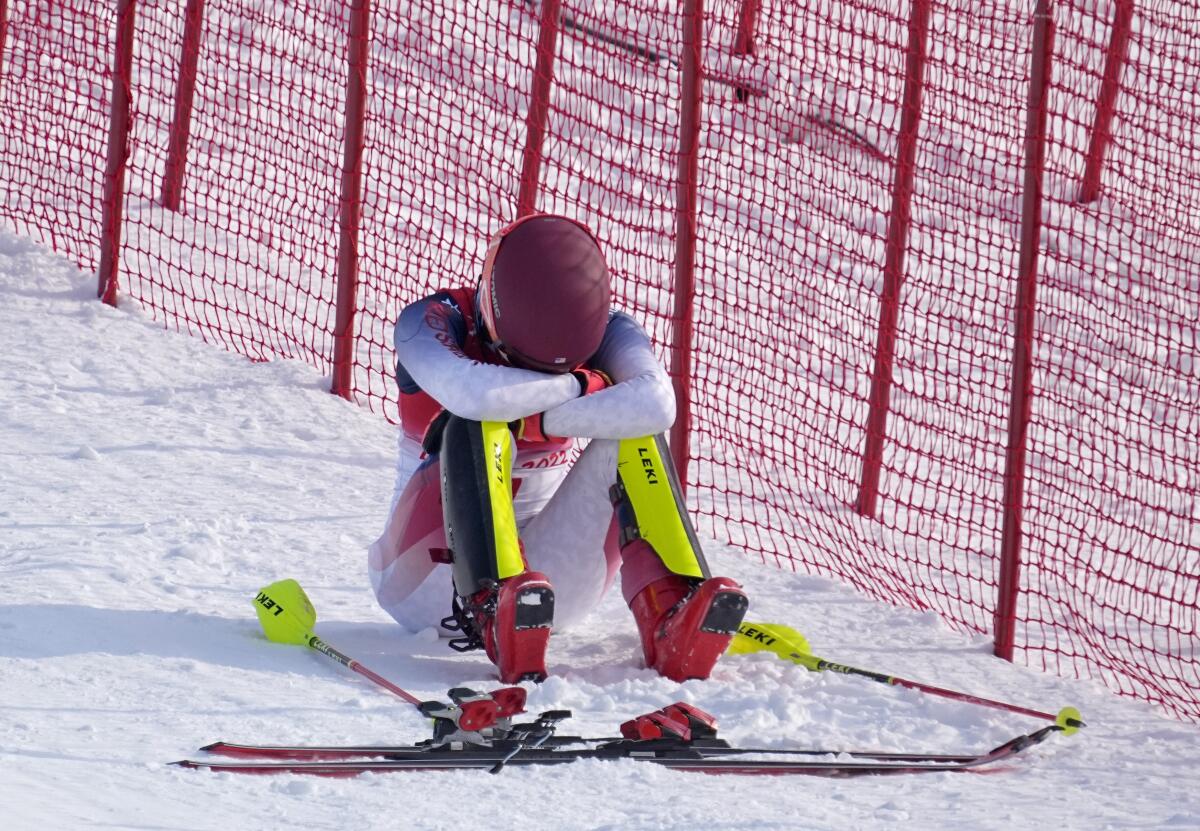
BEIJING — The world’s most famous skier had kicked off her skis and dropped her poles. Sitting alone in the snow, she buried her head in her hands.
Other racers zipped past as the women’s slalom event at the Beijing Olympics continued. But Mikaela Shiffrin, who had skidded out of control and missed a gate near the top of the course, did not move. She remained off to the side for 20 minutes.
“There’s a lot of disappointment over the last week,” she said. “There’s a lot of emotions.”
In what will be an enduring if wrenching moment from these Games, her anguish over failing to finish, much less medal, in the second consecutive event in a little over 48 hours highlighted the unrelenting pressure athletes face at a global competition that comes around once every four years.
For some, the Games have become a suffocating crucible that drains much of the joy from the sport they love.
- Share via
Netherlands’ Suzanne Schulting defends Olympic short track gold
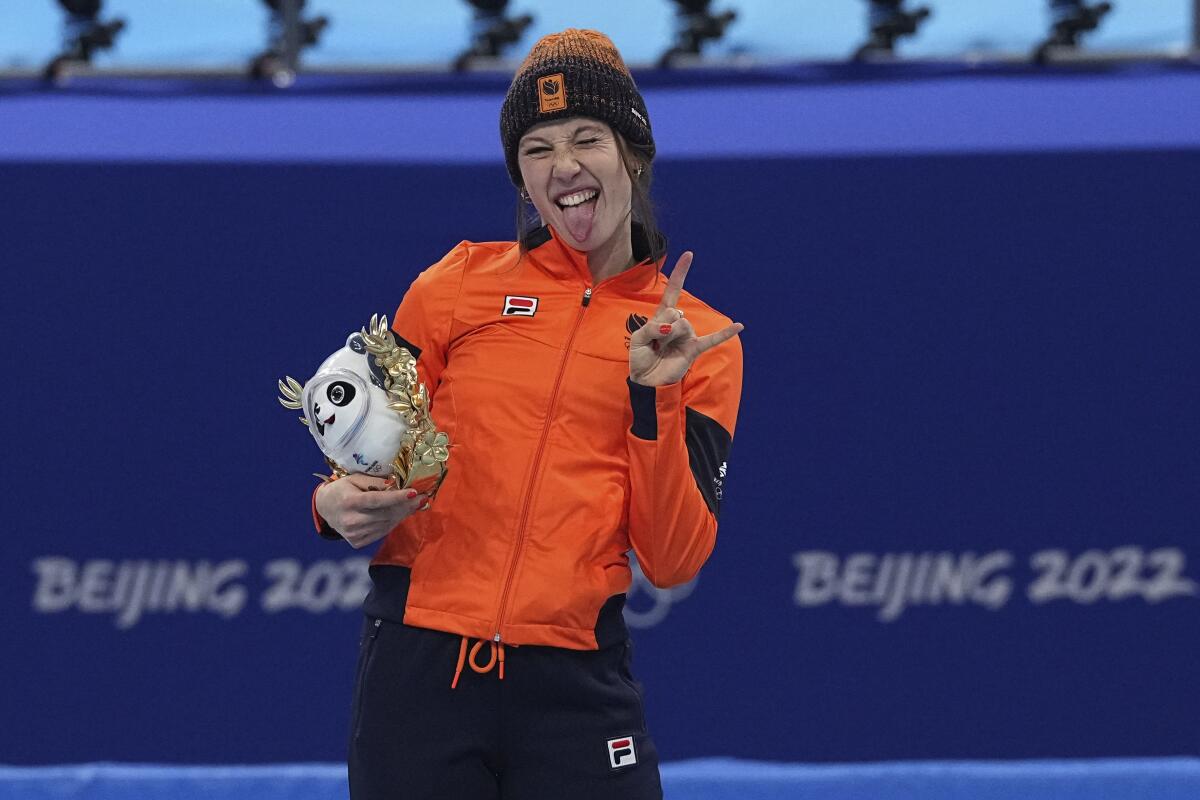
BEIJING — Suzanne Schulting of the Netherlands successfully defended her Olympic title in 1,000 short track speedskating Friday night.
She set the world and Olympic records of 1 minute, 26.514 seconds in the quarterfinals. She wasn’t as fast in the final, finishing in 1:28.391.
Schulting let out a scream and raised her right fist after crossing the finish line at Capital Indoor Stadium. She’s the second woman to defend an Olympic title in the 1,000 after Chun Lee-Kyung of South Korea did it at the 1998 Nagano Games.
“I really wanted it,“ said Schulting, who also won silver in the 500 meters. “I am so happy I got it.”
Choi Minjeong of South Korea took silver, crying on the side of the rink after the race. She finished fourth in 2018, the only time her country had missed the podium since the event’s debut in 1994.
Hanne Desmet of Belgium earned bronze, her country’s first short track medal at the Olympics.
“It means a lot for Belgium. We don’t get a lot of medals, especially for winter sport,” said Desmet, who was fifth in the 500.
Arianna Fontana of Italy was penalized for a lane change that caused contact with American Kristen Santos. Both skaters went down and slid on their sides into the padding.
Fontana was chasing an 11th career medal, having already earned two in Beijing. She’s the most decorated skater in Olympic short track.
Schulting won her semifinal and Santos won the other semifinal.
- Share via
World Anti-Doping Agency will appeal decision to reinstate ROC skater Kamila Valieva

The World Anti-Doping Agency said Friday it plans to appeal the Russian Anti-Doping Agency’s decision to lift a provisional suspension imposed on 15-year-old figure skater Kamila Valieva after she tested positive for a banned substance during the Russian figure skating championships in late December.
The Russian agency, known as RUSADA, suspended Valieva after she tested positive for trimetazidine, which is prescribed for angina, or chest pain. Valieva requested a hearing with RUSADA’s disciplinary committee, held on Feb. 9 — after she had contributed two performances to the team gold medal won by the Russian Olympic Committee. The committee rescinded the suspension, freeing her to compete in the women’s singles event, which begins on Tuesday. Valieva has been considered the favorite to win the gold medal.
However, WADA joined the International Testing Agency in announcing they will appeal the RUSADA decision to the Court of Arbitration for Sport. The ITA said in a statement it will lead the appeal on behalf of the International Olympic Committee.
“Under the terms of the World Anti-Doping Code, WADA has a right to appeal the decision to lift the provisional suspension before CAS and does so on the grounds that the Code has not been correctly applied in this case,” WADA said in a statement.
The medals for the team event have not yet been awarded. The U.S. finished second to the Russian Olympic Committee team, with Japan third and Canada fourth. If the Russian Olympic Committee team is disqualified, the teams that finished below them would each be bumped up by one place.
“The decision on the results of the ROC team in the Team Figure Skating event can be taken by the [International Skating Union] only after a final decision on the full merits of the case has been taken,” the ITA said in a statement. “The procedure, which is initiated currently, can only address the provisional suspension.”
The ITA also said that because the sample in question was collected before the Winter Olympics, the IOC does not have direct jurisdiction.
